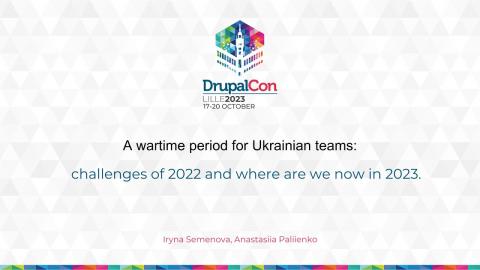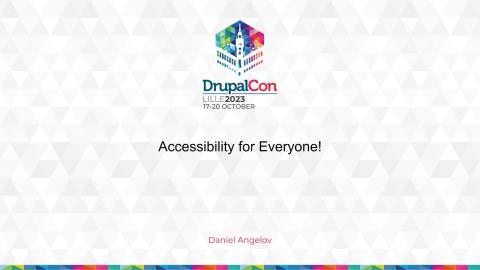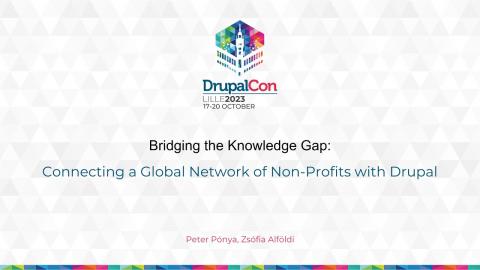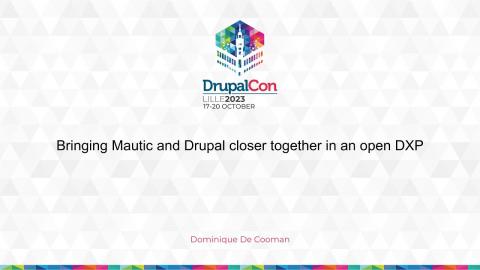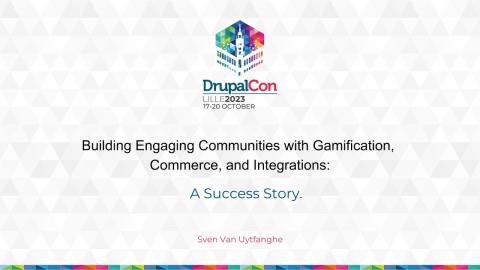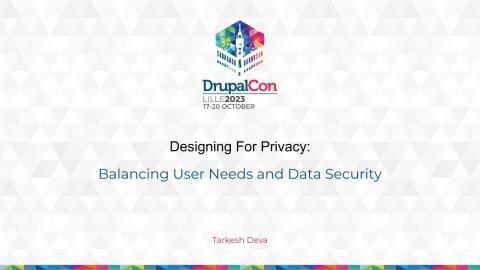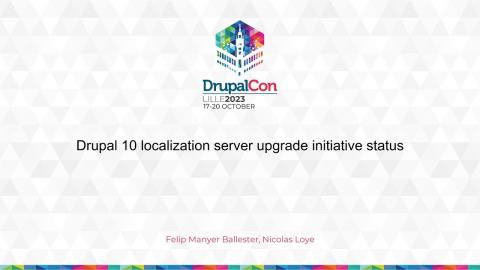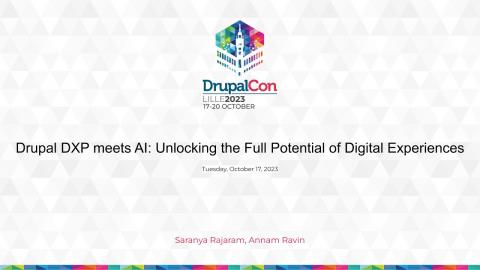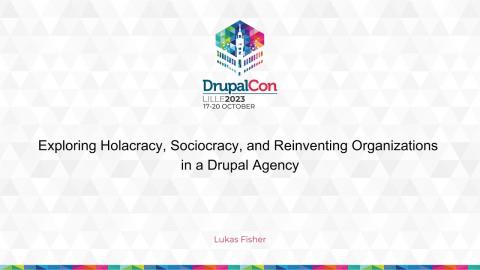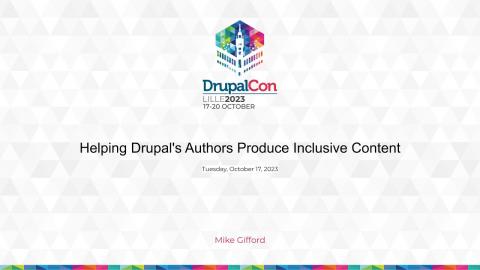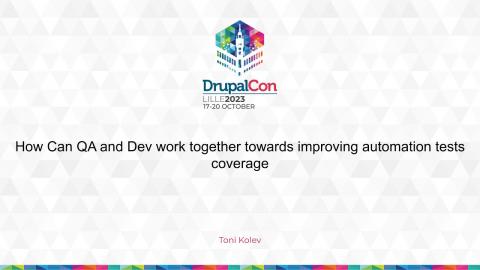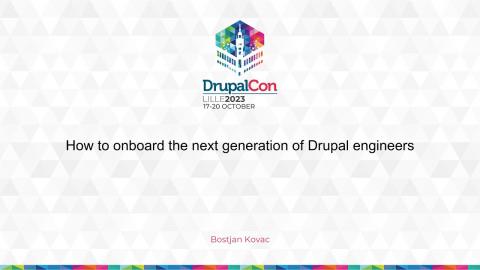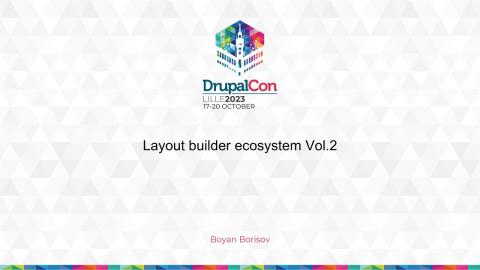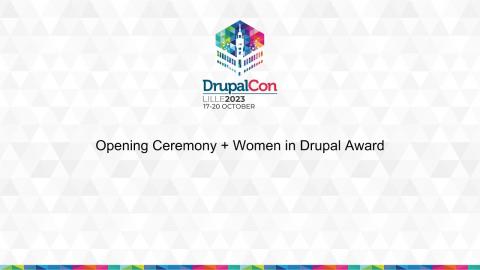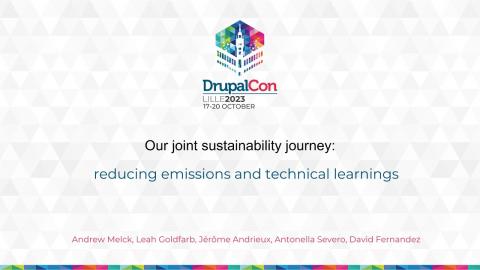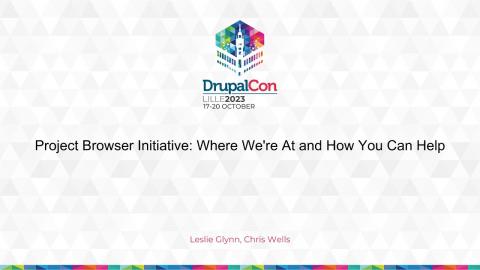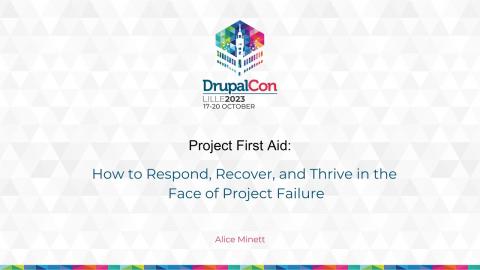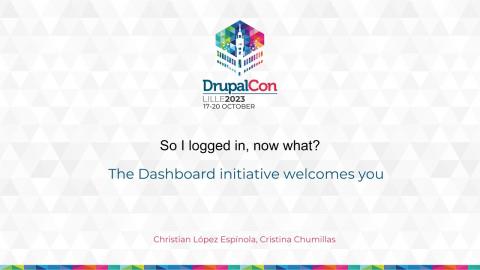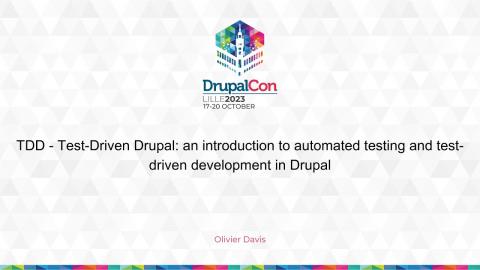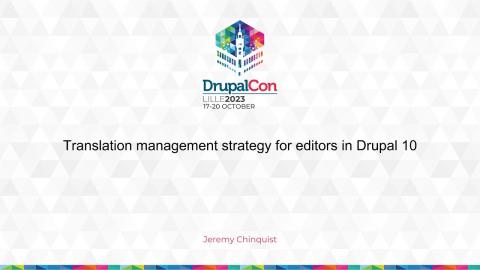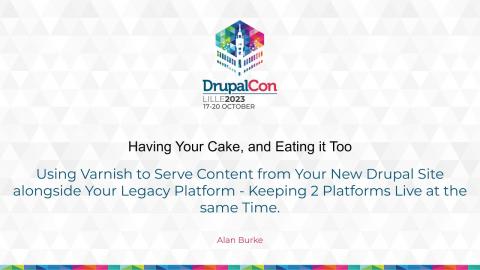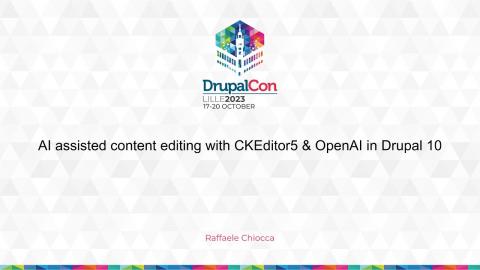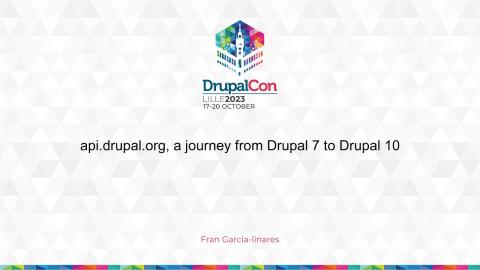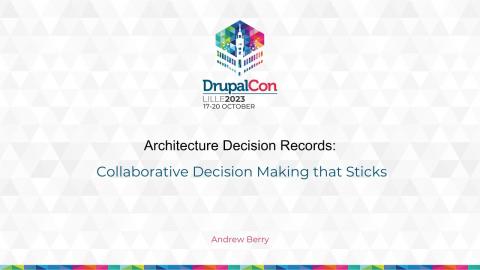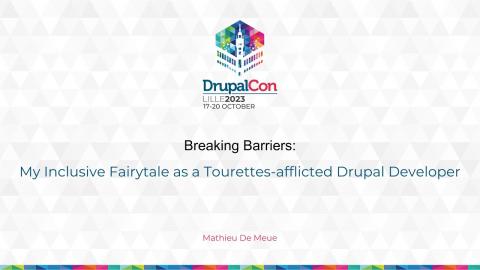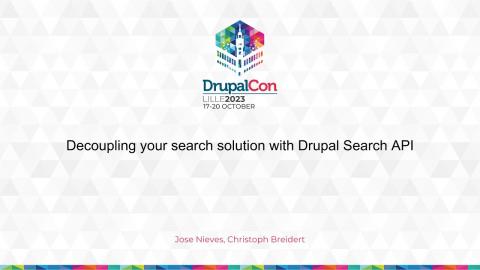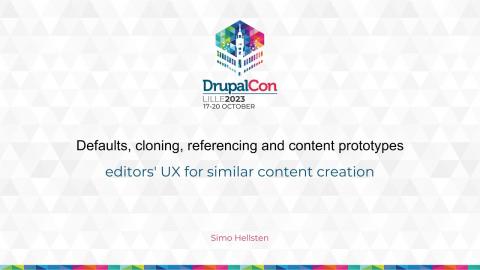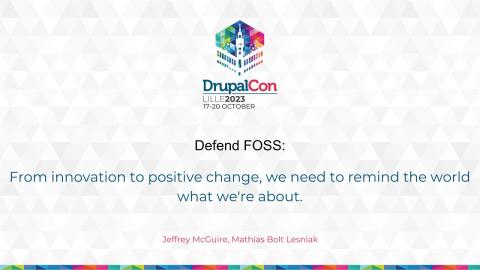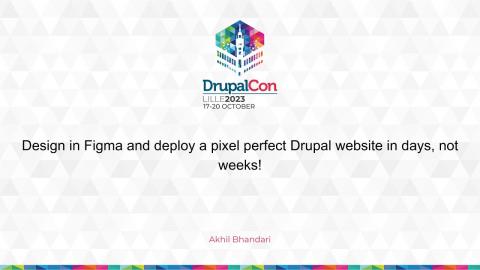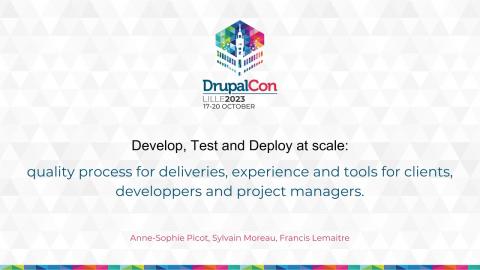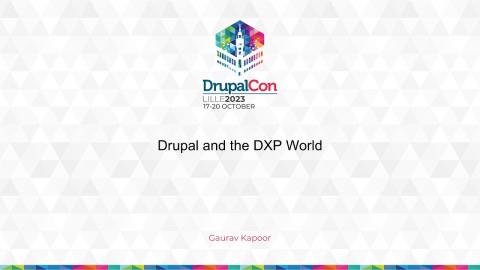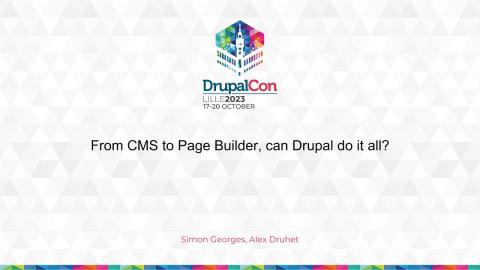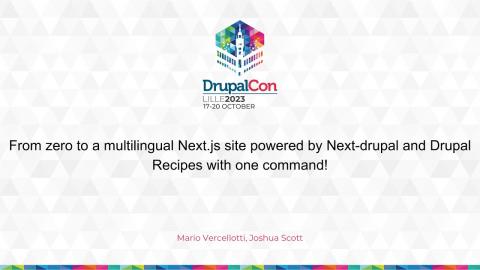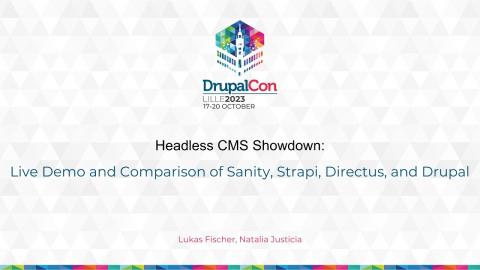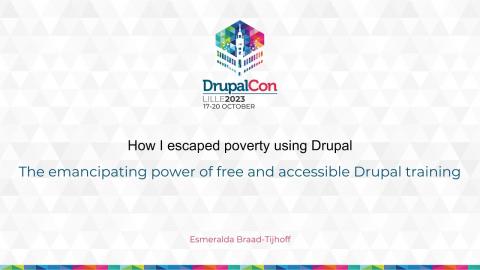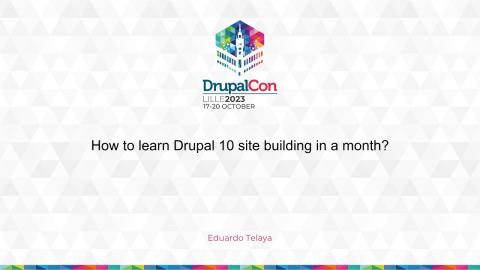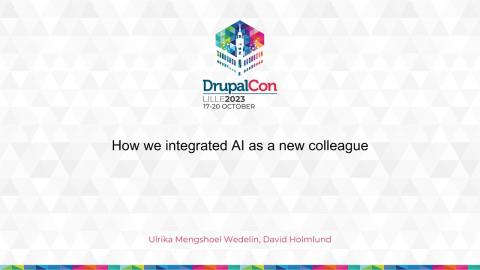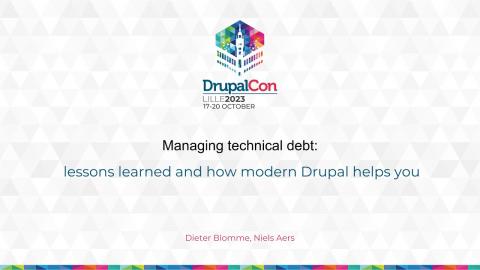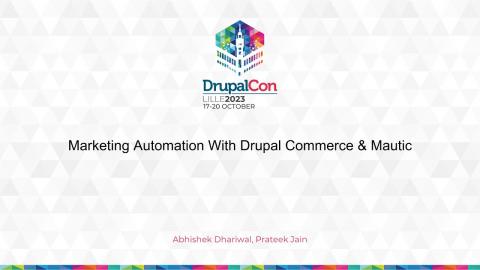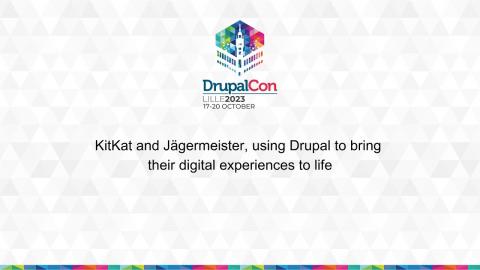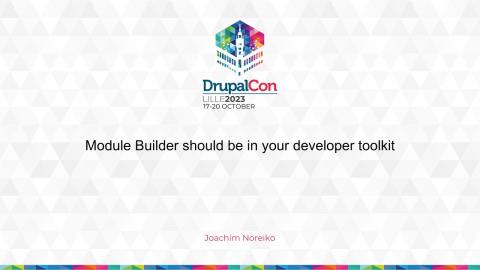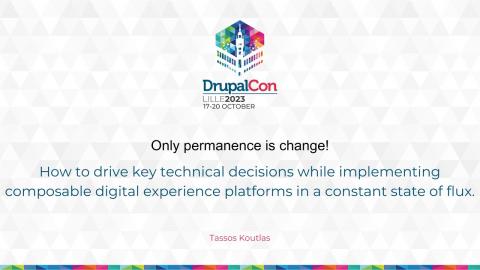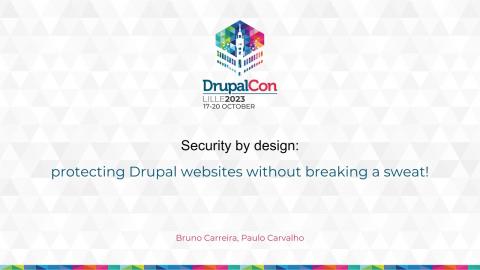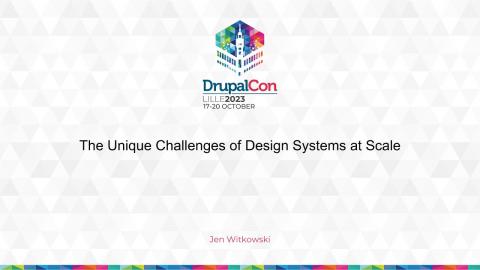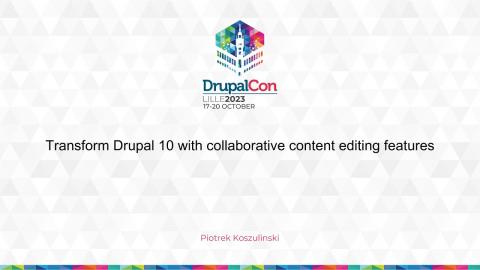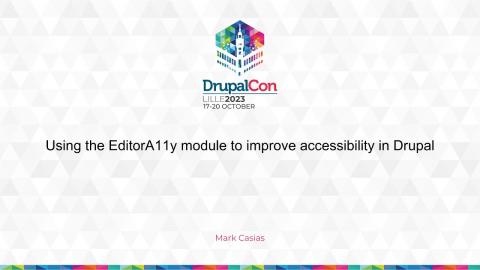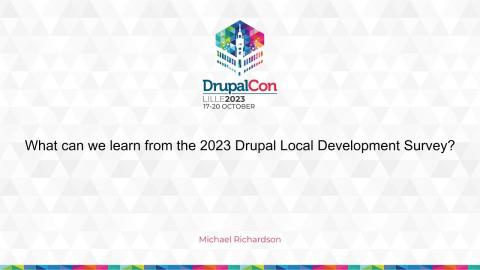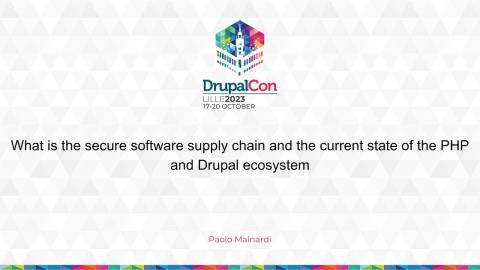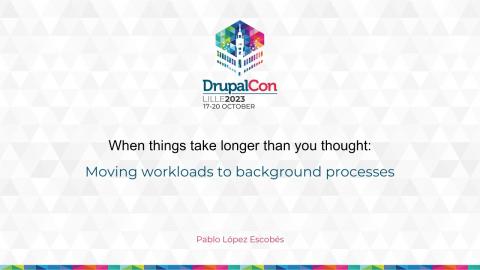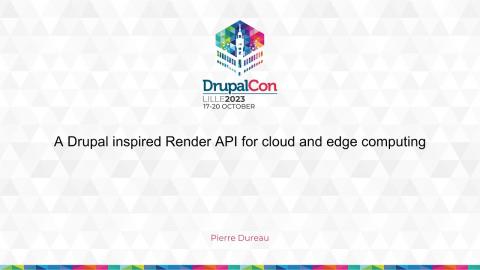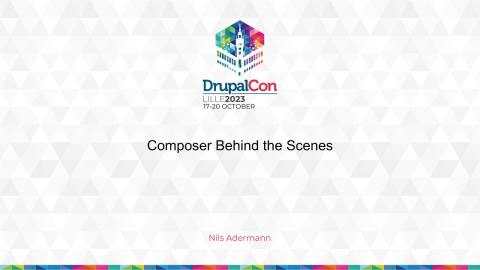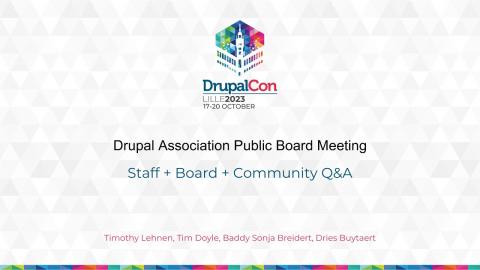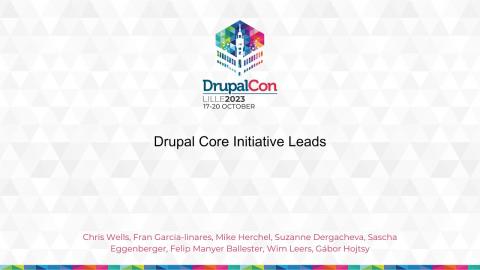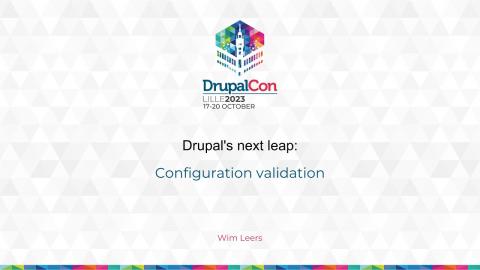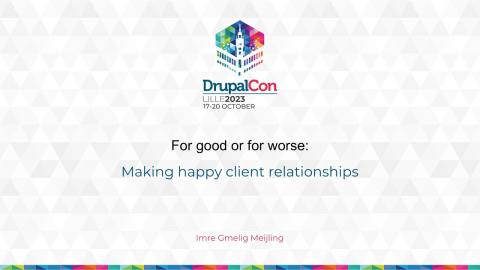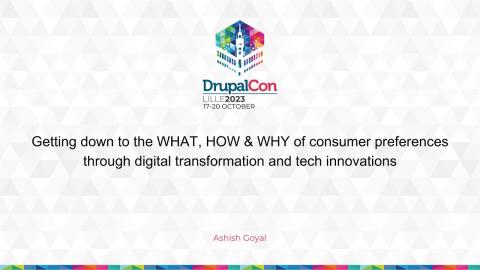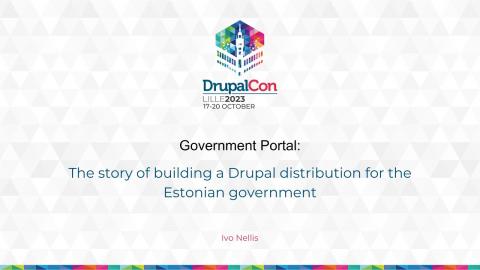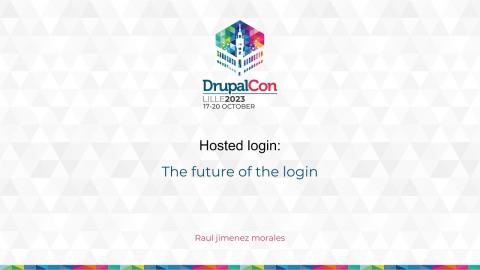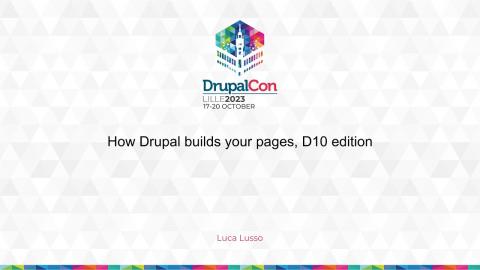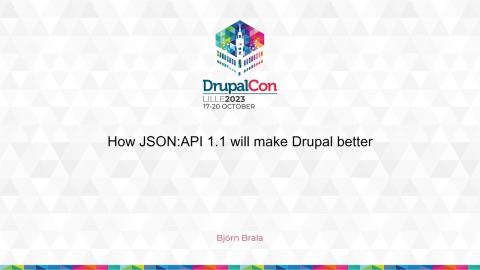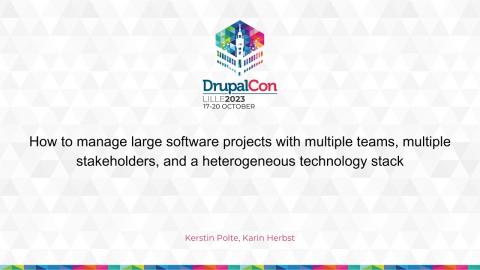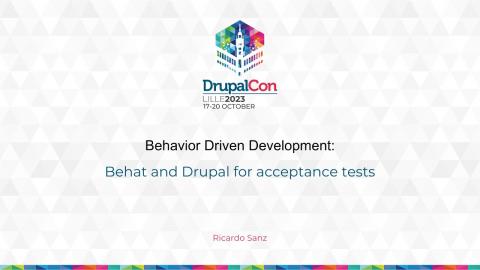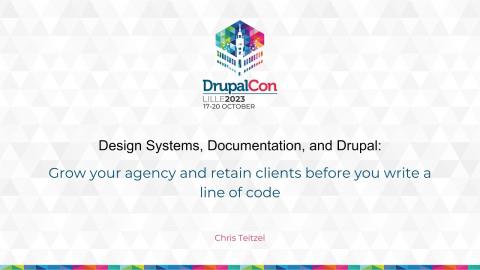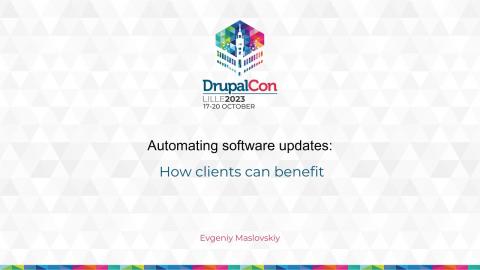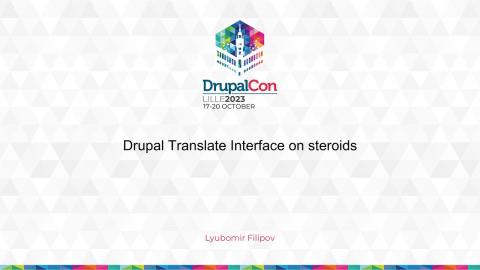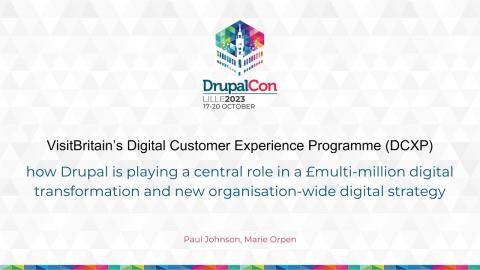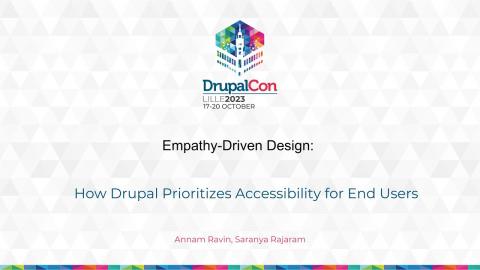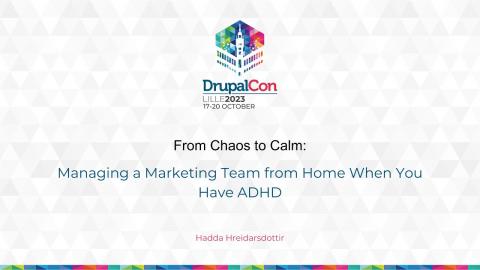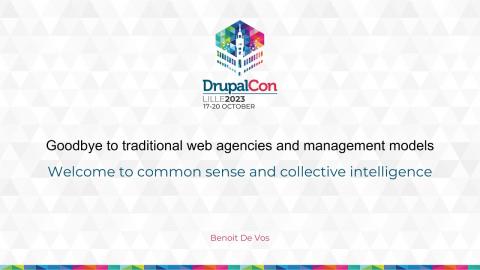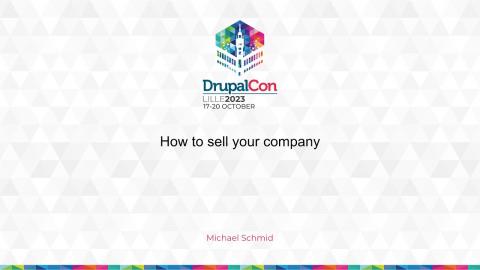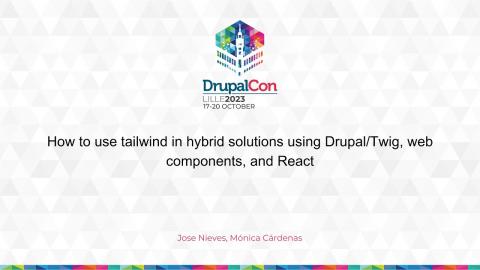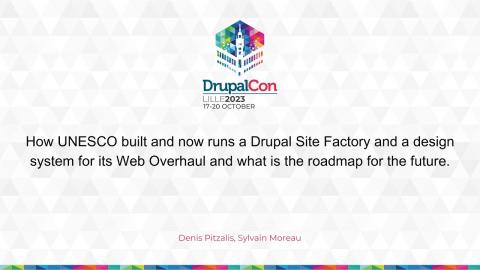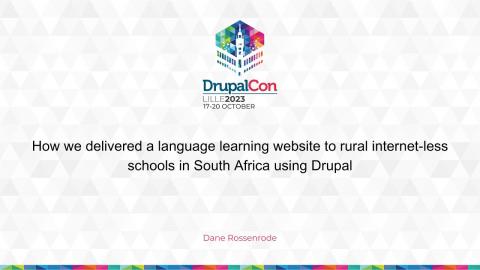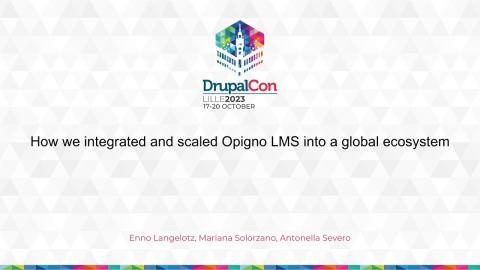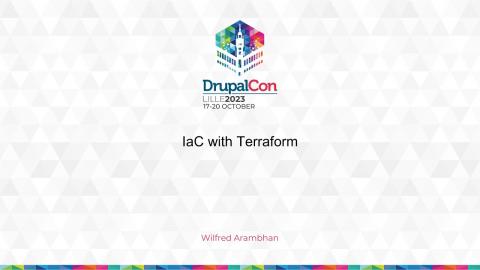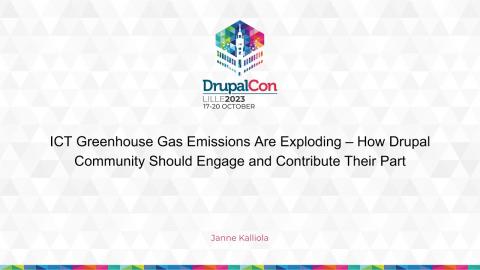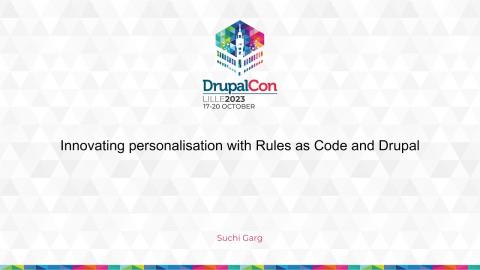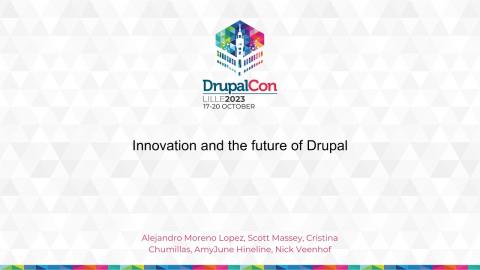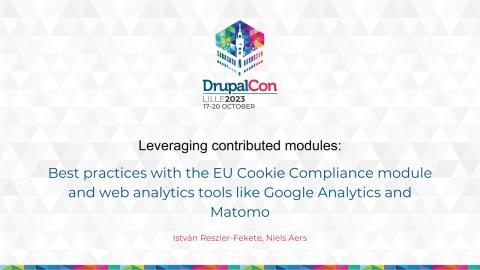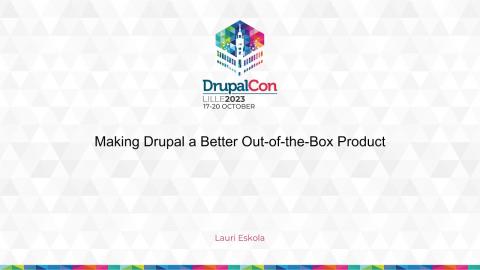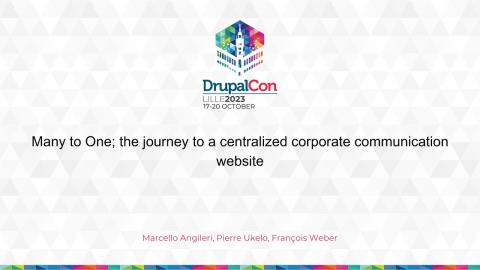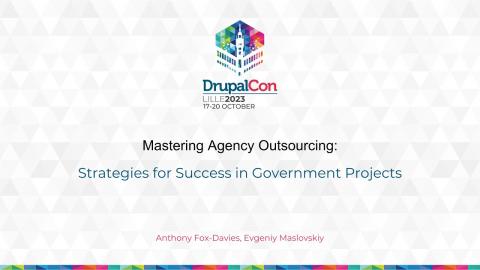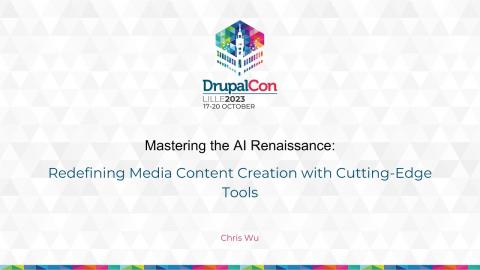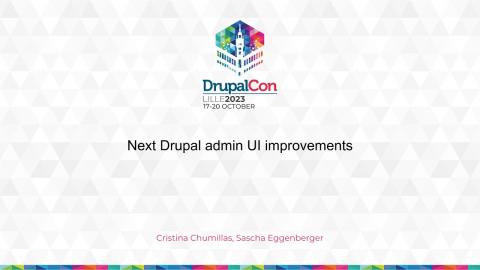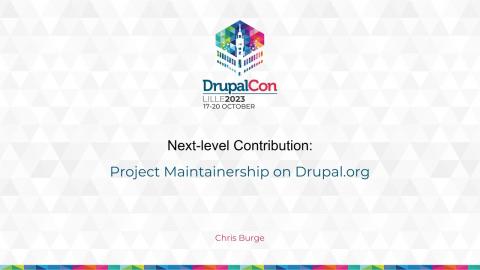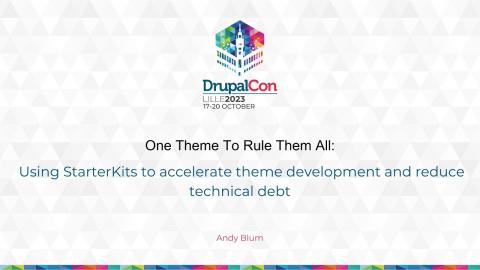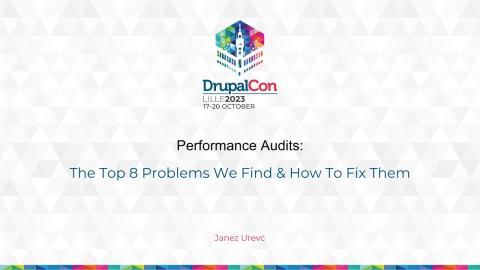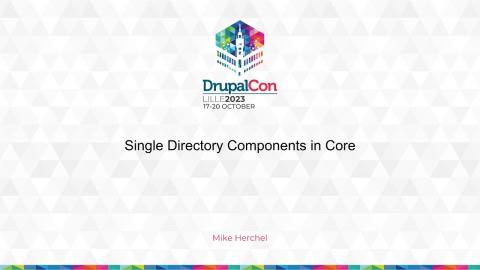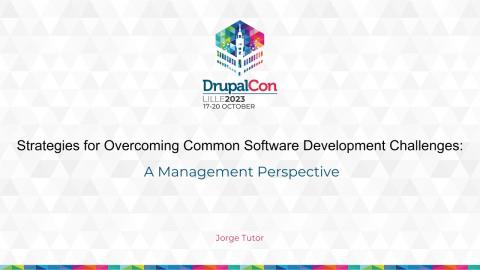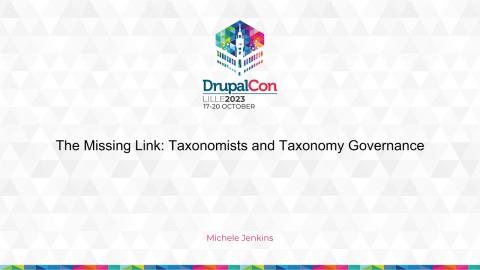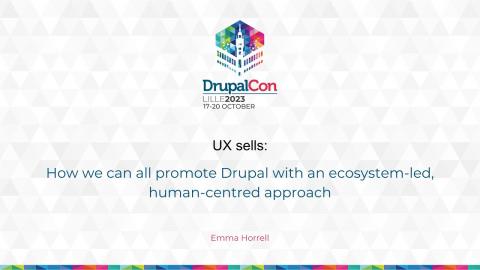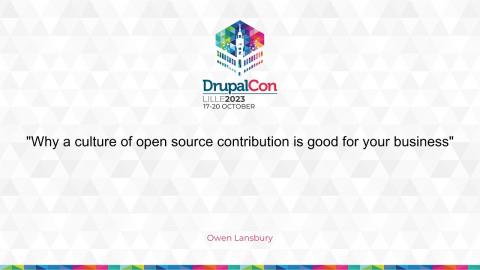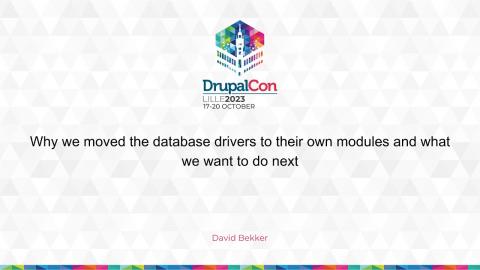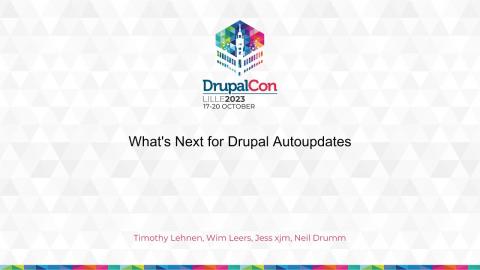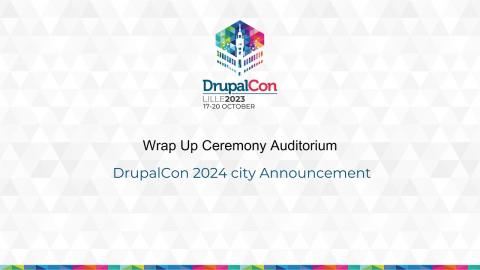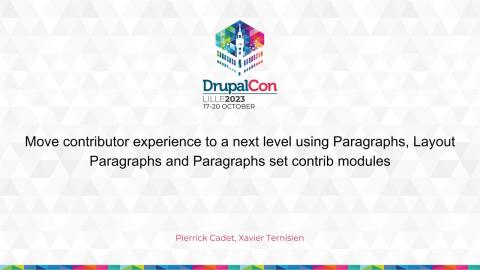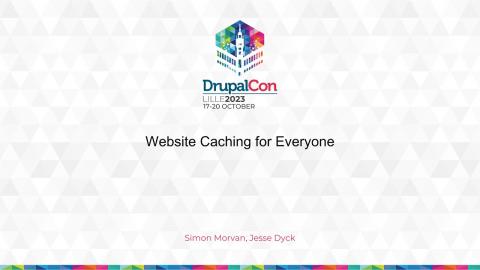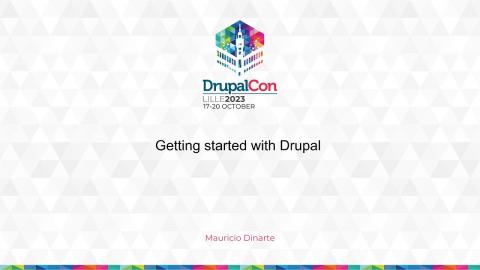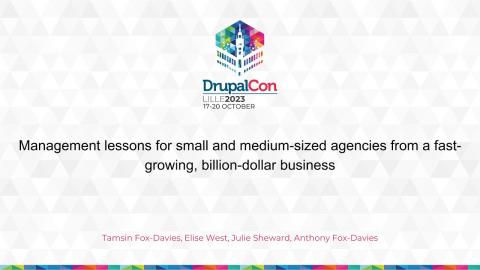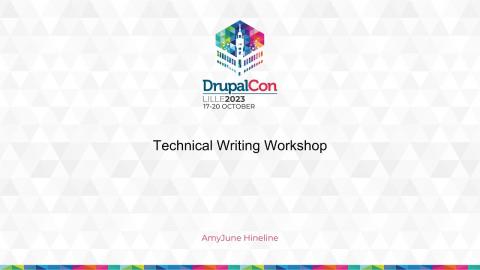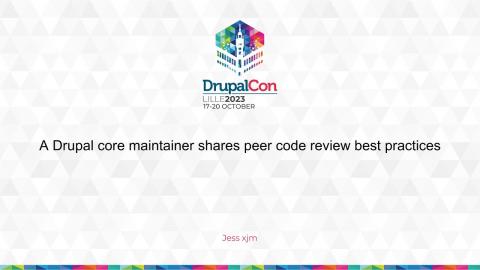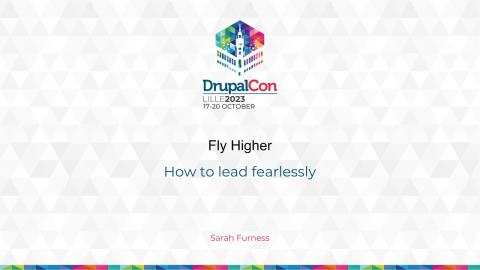Introduction
Videos from DrupalCon Lille 2023.
Video Sponsor(s) / Provided by
Curated Videos
Description
Belgium-born Drupal founder Dries Buytaert is a pioneer in the open source web publishing and digital experience platform space. In his traditional Driesnote he will present an update on the project and the development of Drupal.
Description
https://events.drupal.org/lille2023/keynotes-speakers
Description
The world today is undergoing massive changes. On Feb 24, 2022, it changed significantly for Ukrainian IT teams. We encountered unique challenges and discovered our strength in overcoming them. At the same time, we maintained our commitment to delivering success on the projects we were working on.
During this session, we aim to cover the following:
The challenges we faced in 2022, examining this topic from both perspectives: IT companies and development teams:
•Team relocation
•Active hostilities
•Issues with electricity
•Communication with clients
Real examples of how we overcame these challenges as a company and as a team:
•Team unity and mutual support
•Relocation assistance
•Financial support
•Psychological support
•Flexible project management
•Stories of how our Ukrainian Drupal developers are volunteering and defending the country as part of the Armed Forces of Ukraine while continuing to work on Drupal projects.
•Pillars that help Ukrainian teams support our mental health during wartime.
•How we are preparing for the 2023/2024 winter season.
This session is designed for a global audience, both technical and non-technical, who wish to learn more about overcoming challenges and maintaining resilience in both work and life.
By the end of this session, you will learn more about our Ukrainian colleagues, our challenges, and how we have effectively dealt with them. We will share our experiences and elaborate on what actions we took to support our teams and businesses during wartime.
During this session, we aim to cover the following:
The challenges we faced in 2022, examining this topic from both perspectives: IT companies and development teams:
•Team relocation
•Active hostilities
•Issues with electricity
•Communication with clients
Real examples of how we overcame these challenges as a company and as a team:
•Team unity and mutual support
•Relocation assistance
•Financial support
•Psychological support
•Flexible project management
•Stories of how our Ukrainian Drupal developers are volunteering and defending the country as part of the Armed Forces of Ukraine while continuing to work on Drupal projects.
•Pillars that help Ukrainian teams support our mental health during wartime.
•How we are preparing for the 2023/2024 winter season.
This session is designed for a global audience, both technical and non-technical, who wish to learn more about overcoming challenges and maintaining resilience in both work and life.
By the end of this session, you will learn more about our Ukrainian colleagues, our challenges, and how we have effectively dealt with them. We will share our experiences and elaborate on what actions we took to support our teams and businesses during wartime.
Description
We all understand the importance of Accessibility to some extent. Some of us may have a basic understanding of certain rules, such as color contrast ratios and the need for Alt Text. But how many of us actually UNDERSTAND Accessibility? A lot of people think it affects only people with disabilities - which is wrong. And I'll prove it to you.
In this session, I will provide a comprehensive overview of the key concepts that serve as the foundation for WCAG in a way that you'll be able to THINK Accessibility even if you have no prior experience. I'll give you examples of issues and their resolutions according to the newly drafted WCAG 2.2 which will help you out through our journey.
I'm looking forward to meeting you so we can delve deeper into this important topic!
In this session, I will provide a comprehensive overview of the key concepts that serve as the foundation for WCAG in a way that you'll be able to THINK Accessibility even if you have no prior experience. I'll give you examples of issues and their resolutions according to the newly drafted WCAG 2.2 which will help you out through our journey.
I'm looking forward to meeting you so we can delve deeper into this important topic!
Description
When 200 non-profit organizations with varying resources and expertise are scattered across the globe, the need for a centralized platform to share knowledge and resources becomes vital.
In this session, I'll take a closer look at how we built a platform where a thriving new community was born.
Some non-profits are large and relatively rich, with finance experts onboard. Others are working in underdeveloped countries with small, yet similarly if not more enthusiastic teams, without access to expert financial consultancy about the very key area of how to fund and administer their operations.
We’ve built a knowledge and resource-sharing platform around the OpenSocial Drupal distribution and empowered this network to join forces, share their knowledge and help each other. It was thrilling to see the birth of a new community, to check the KPI analytics, and see the ever-growing numbers.
In this session attendees will:
- Get an inside look at a private, yet thriving, social site that is creating significant value and impact worldwide.
- Learn about the challenges and opportunities in building and customizing the OpenSocial Drupal distribution.
- Understand how Drupal goes beyond being just a CMS, showcasing its capabilities as a powerful tool for fostering community engagement and collaboration.
Client: The largest humanitarian organization in the world.
In this session, I'll take a closer look at how we built a platform where a thriving new community was born.
Some non-profits are large and relatively rich, with finance experts onboard. Others are working in underdeveloped countries with small, yet similarly if not more enthusiastic teams, without access to expert financial consultancy about the very key area of how to fund and administer their operations.
We’ve built a knowledge and resource-sharing platform around the OpenSocial Drupal distribution and empowered this network to join forces, share their knowledge and help each other. It was thrilling to see the birth of a new community, to check the KPI analytics, and see the ever-growing numbers.
In this session attendees will:
- Get an inside look at a private, yet thriving, social site that is creating significant value and impact worldwide.
- Learn about the challenges and opportunities in building and customizing the OpenSocial Drupal distribution.
- Understand how Drupal goes beyond being just a CMS, showcasing its capabilities as a powerful tool for fostering community engagement and collaboration.
Client: The largest humanitarian organization in the world.
Description
This session is about how Drupal and Mautic can form the backbone of an open DXP. It's about how to bringing different worlds together: bringing communities together, developers and marketers together and markets together
.
It's about how we can create a vision where both the Mautic and Drupal community can leverage its unique strengths.
In this session you will learn how an open DXP creates more value for the end user than Drupal alone or Mautic alone. It will be a part business and part community session. You'll learn about communities working together, about marketers and developers coming together and about developers working on both Drupal and Mautic together.
.
It's about how we can create a vision where both the Mautic and Drupal community can leverage its unique strengths.
In this session you will learn how an open DXP creates more value for the end user than Drupal alone or Mautic alone. It will be a part business and part community session. You'll learn about communities working together, about marketers and developers coming together and about developers working on both Drupal and Mautic together.
Description
In this talk at DrupalCon, we will share how our company, Dropsolid, successfully integrated gamification, Drupal commerce, and Microsoft Dynamics integration to create a language-based community with a robust role system. We will also discuss the challenges we faced during this process and the solutions we found to overcome them.
We will showcase the diversity of Drupal and the out-of-the-box capabilities, even beyond the restrictions that 'markets' can offer (i.e. language communities combined with shops based on markets: language/region).
Topics will include:
- Gamification
- API integrations (MS Dynamics, custom endpoints, ...)
- Drupal commerce and complex market-setup
- Community, i.e. a Facebook-like environment for users based on language (connected to both Gamification and Drupal commerce)
- Community, i.e. create content (with a content wizard especially made for basic users)
- Community, i.e. dashboards with tiles that lead to actions (incentives to earn currency for the gamification element)
- The creation of a user interface for web admins to create events and their currency in a visual way for gamification
- Partner portal: a portal for professional partners where they can manage their clients
Whether you're a business owner, marketer, analyst or developer, you'll gain valuable insights into how to combine different technologies to create engaging and functional online communities.
We will showcase the diversity of Drupal and the out-of-the-box capabilities, even beyond the restrictions that 'markets' can offer (i.e. language communities combined with shops based on markets: language/region).
Topics will include:
- Gamification
- API integrations (MS Dynamics, custom endpoints, ...)
- Drupal commerce and complex market-setup
- Community, i.e. a Facebook-like environment for users based on language (connected to both Gamification and Drupal commerce)
- Community, i.e. create content (with a content wizard especially made for basic users)
- Community, i.e. dashboards with tiles that lead to actions (incentives to earn currency for the gamification element)
- The creation of a user interface for web admins to create events and their currency in a visual way for gamification
- Partner portal: a portal for professional partners where they can manage their clients
Whether you're a business owner, marketer, analyst or developer, you'll gain valuable insights into how to combine different technologies to create engaging and functional online communities.
Description
Abstract:
With increasing concerns about data privacy and security, it’s more important than ever for UX designers to consider the implications of their designs on user privacy. In this session, I will explore the challenges of designing for privacy and provide practical tips for balancing user needs with data security. I will cover topics such as:
*Understanding user expectations and attitudes towards privacy
*Identifying and mitigating privacy risks in your designs
*Balancing privacy and usability considerations
*Best practices for communicating privacy information to users
*Designing for consent and user control
*Leveraging privacy-enhancing technologies in your designs
I will also dive into a case study on design of a community forum for UNICEF, which is a platform designed for young women and girls. During the design process, I have identified several privacy risks and challenges specific to the platform and its users, such as sensitive topics, reaching displaced users, identification of users, and privacy intrusion. I will discuss how I have addressed these risks and challenges through the design choices, including creating a safe and supportive community forum, using non-intrusive registration methods, and incorporating privacy-enhancing technologies.
By the end of this session, you will have a better understanding of how to design for privacy in sensitive and challenging contexts and leave with practical tips to improve the privacy of your designs and build more trustworthy digital experiences.
With increasing concerns about data privacy and security, it’s more important than ever for UX designers to consider the implications of their designs on user privacy. In this session, I will explore the challenges of designing for privacy and provide practical tips for balancing user needs with data security. I will cover topics such as:
*Understanding user expectations and attitudes towards privacy
*Identifying and mitigating privacy risks in your designs
*Balancing privacy and usability considerations
*Best practices for communicating privacy information to users
*Designing for consent and user control
*Leveraging privacy-enhancing technologies in your designs
I will also dive into a case study on design of a community forum for UNICEF, which is a platform designed for young women and girls. During the design process, I have identified several privacy risks and challenges specific to the platform and its users, such as sensitive topics, reaching displaced users, identification of users, and privacy intrusion. I will discuss how I have addressed these risks and challenges through the design choices, including creating a safe and supportive community forum, using non-intrusive registration methods, and incorporating privacy-enhancing technologies.
By the end of this session, you will have a better understanding of how to design for privacy in sensitive and challenging contexts and leave with practical tips to improve the privacy of your designs and build more trustworthy digital experiences.
Description
A group of volunteers is currently porting the Drupal community translation server (localize.drupal.org) from Drupal 7 to Drupal 10. This platform is an important part of Drupal's infrastructure: if you ever have installed Drupal in any language other than English, you have already (transparently) downloaded translations from Localize, which is also a collaborative tool where contributors from various linguistic and cultural communities coordinate their efforts to get Drupal core and contrib projects translated.
In a first phase, we have focused on porting existing features. However, by the time we will give this presentation in Lille, we should be working on new features, such as: UI and UX improvements, web services (for instance to get statistics per language), addressing crediting issues, or even integrating efforts around a translation memory tool for Drupal. Volunteers will be more than welcome to work on issues during the event and take care of our tools.
In a first phase, we have focused on porting existing features. However, by the time we will give this presentation in Lille, we should be working on new features, such as: UI and UX improvements, web services (for instance to get statistics per language), addressing crediting issues, or even integrating efforts around a translation memory tool for Drupal. Volunteers will be more than welcome to work on issues during the event and take care of our tools.
Description
In today's digital landscape, delivering exceptional digital experiences is essential for organisations to remain competitive. Imagine a digital experience platform that can learn from your customers, personalise their interactions, and predict their needs - all on its own. That's the power of Drupal DXP with AI. By combining the flexibility and scalability of Drupal with cutting-edge artificial intelligence technologies, we can step into the future of digital experiences. Are you ready to take your digital strategy to the next level? Then this session would be the right choice for you.
At the end of this session, the attendees should be able to have a good understanding on:
- Various AI-powered tools and techniques can be used with Drupal DXP to enhance personalisation, chatbots and conversational interfaces, data analytics, search and recommendation engines, content creation, and management.
- Overview of how Drupal DXP can be integrated with third-party AI tools and services to enhance its capabilities.
- The best practices for integrating AI into Drupal DXP, like data privacy, security, and ethical considerations.
- The challenges and limitations of using AI in Drupal DXP and the strategies for overcoming these challenges.
Target Audience:
We aim to make this session a reference for organisations looking to leverage AI to unlock the full potential of Drupal DXP and deliver exceptional digital experiences.
- Business leaders and decision-makers who are interested in using AI to enhance their organisation's digital experiences and gain a competitive advantage.
- Digital experience professionals working with Drupal are interested in learning more about how AI can be integrated into their work to improve user engagement and satisfaction.
- Anyone who is interested in learning about the potential of AI to enhance digital experiences and wants to stay up-to-date with the latest trends and developments in the field.
At the end of this session, the attendees should be able to have a good understanding on:
- Various AI-powered tools and techniques can be used with Drupal DXP to enhance personalisation, chatbots and conversational interfaces, data analytics, search and recommendation engines, content creation, and management.
- Overview of how Drupal DXP can be integrated with third-party AI tools and services to enhance its capabilities.
- The best practices for integrating AI into Drupal DXP, like data privacy, security, and ethical considerations.
- The challenges and limitations of using AI in Drupal DXP and the strategies for overcoming these challenges.
Target Audience:
We aim to make this session a reference for organisations looking to leverage AI to unlock the full potential of Drupal DXP and deliver exceptional digital experiences.
- Business leaders and decision-makers who are interested in using AI to enhance their organisation's digital experiences and gain a competitive advantage.
- Digital experience professionals working with Drupal are interested in learning more about how AI can be integrated into their work to improve user engagement and satisfaction.
- Anyone who is interested in learning about the potential of AI to enhance digital experiences and wants to stay up-to-date with the latest trends and developments in the field.
Description
We at NETNODE, a small swiss Drupal agency have successfully adopted and blended principles from Holacracy, Sociocracy, and Reinventing Organizations since late 2019. In this session, I will explore the fascinating world of decentralized leadership and share our experience in creating a thriving work environment without a CEO or job titles.
Key Takeaways:
Gain an understanding of Holacracy, Sociocracy, and Reinventing Organizations, and learn how these models can create a more adaptive and empowered work culture.
Discover how NETNODE successfully transitioned from a more traditional organisation model to a flexible, self-managing organization, while continuing to excel as a Drupal agency.
Learn from our experiences, challenges, and successes in adopting these new organizational models and creating a supportive, collaborative, and innovative environment for our team members.
Gain insights into the practical steps and tools that can be used to implement and scale these models in your own organization.
Session Format:
This interactive session will feature a mix of theory and practice, with the first half dedicated to explaining the core concepts and ideas behind Holacracy, Sociocracy, and Reinventing Organizations. The second half will focus on the journey of NETNODE, sharing our experiences in adopting these models, the challenges we faced, and the positive (and negative) outcomes we achieved. There will be ample opportunity for Q&A and group discussion to facilitate knowledge sharing and networking among attendees.
Join me in this session to discover how you can break away from traditional organizational structures and create a more resilient, innovative, and efficient workplace through the power of decentralized leadership models.
Key Takeaways:
Gain an understanding of Holacracy, Sociocracy, and Reinventing Organizations, and learn how these models can create a more adaptive and empowered work culture.
Discover how NETNODE successfully transitioned from a more traditional organisation model to a flexible, self-managing organization, while continuing to excel as a Drupal agency.
Learn from our experiences, challenges, and successes in adopting these new organizational models and creating a supportive, collaborative, and innovative environment for our team members.
Gain insights into the practical steps and tools that can be used to implement and scale these models in your own organization.
Session Format:
This interactive session will feature a mix of theory and practice, with the first half dedicated to explaining the core concepts and ideas behind Holacracy, Sociocracy, and Reinventing Organizations. The second half will focus on the journey of NETNODE, sharing our experiences in adopting these models, the challenges we faced, and the positive (and negative) outcomes we achieved. There will be ample opportunity for Q&A and group discussion to facilitate knowledge sharing and networking among attendees.
Join me in this session to discover how you can break away from traditional organizational structures and create a more resilient, innovative, and efficient workplace through the power of decentralized leadership models.
Description
Mike will talk about how authoring tools like Drupal can help create more inclusive content. Tools like CKEditor can be great, but more often than not allow authors to make basic mistakes, because they don't know the basics of web accessibility. New tools like Editoria11y and Sa11y are examples of some of the new tools available for authors.
The presentation will cover both Drupal's efforts to support authors, some highlights from Funka's We4Authors Cluster for the EC, and finally what opportunities should Drupal invest in for the future.
CivicActions is an agile open source digital agency. We work with clients where we are able to make a positive impact on the world. We are a member of the Digital Services Coalition and support US and Canadian government sites. Our larger clients include: VA.gov, CMS.gov and NSF.gov.
The presentation will cover both Drupal's efforts to support authors, some highlights from Funka's We4Authors Cluster for the EC, and finally what opportunities should Drupal invest in for the future.
CivicActions is an agile open source digital agency. We work with clients where we are able to make a positive impact on the world. We are a member of the Digital Services Coalition and support US and Canadian government sites. Our larger clients include: VA.gov, CMS.gov and NSF.gov.
Description
As software development cycles become more agile and fast-paced, quality assurance (QA) and development (DEV) teams must work together closely to ensure that software products meet high-quality standards. Automation testing is one key component of this effort, allowing teams to test their code quickly and efficiently. However, achieving high automation test coverage can be challenging without collaboration between QA and DEV.
In this session, we will explore how QA and DEV can work together to improve automation test coverage. We will discuss best practices for collaboration, including techniques for creating effective test cases, setting up automated testing environments, and developing strategies for continuous testing.
In this session, we will explore how QA and DEV can work together to improve automation test coverage. We will discuss best practices for collaboration, including techniques for creating effective test cases, setting up automated testing environments, and developing strategies for continuous testing.
Description
This session addresses the challenges of attracting developers to use PHP and sequentially recruiting them in companies and teams where Drupal is the framework of choice. With ten years of experience in growing and onboarding engineers (from 0 to 70+), I would like to share our practices that I believe will need to be applied community-wide and in developmen teams to ensure a sustainable talent inflow for the next generation of contributors to the Drupal ecosystem.
Is PHP still an attractive career option? Do PHP developers earn as much as Python or NodeJS developers? Many conversations today revolve around the popularity of PHP compared to other languages and how that reflects in attracting talent. Applying some stoic philosophy, let’s focus on the things we can control.
In this session, I will explain the strategy and tactics that we have developed over the last 5 years in our team. I will go through the three main things:
• First, you need to reliably find people that can become great developers.
• Second, you need to inject your required skills and experiences directly into their veins, fast.
• Third, you need to make this a process that runs like a machine all the time.
I believe these tactics will be helpful for companies but also in the context of the Drupal community, which will need to start building new talent for the next decade. Drupal can drive the growth of PHP.
Is PHP still an attractive career option? Do PHP developers earn as much as Python or NodeJS developers? Many conversations today revolve around the popularity of PHP compared to other languages and how that reflects in attracting talent. Applying some stoic philosophy, let’s focus on the things we can control.
In this session, I will explain the strategy and tactics that we have developed over the last 5 years in our team. I will go through the three main things:
• First, you need to reliably find people that can become great developers.
• Second, you need to inject your required skills and experiences directly into their veins, fast.
• Third, you need to make this a process that runs like a machine all the time.
I believe these tactics will be helpful for companies but also in the context of the Drupal community, which will need to start building new talent for the next decade. Drupal can drive the growth of PHP.
Description
This is a sequel of the presentation that I did 3 years ago on DrupalCon Amsterdam - https://www.youtube.com/watch?v=RQw7pZMzdDM.
Three years later Layout builder has become a main building block for many Drupal websites.
The ecosystem around Layout builder has more than 90 modules now.
What hasn't changed is that still many of us wonder what is the best module to use.
During my session I'm going to make a review of my top favorite Layout builder related contributed modules. I will talk about their pros and cons and their possible roadmap.
I will also present different scenarios from the real live how and where you can use these modules.
Three years later Layout builder has become a main building block for many Drupal websites.
The ecosystem around Layout builder has more than 90 modules now.
What hasn't changed is that still many of us wonder what is the best module to use.
During my session I'm going to make a review of my top favorite Layout builder related contributed modules. I will talk about their pros and cons and their possible roadmap.
I will also present different scenarios from the real live how and where you can use these modules.
Description
Nestlé and Platform.sh have developed a new test case - focused on Nestlé’s Drupal fleet - which dramatically reduces greenhouse gas emissions in the cloud. Together we will share our approach and the lessons learned in terms of technology, process, and sustainability.
During our previous presentation at DrupalCon Prague, we showed how to measure carbon footprint and what actions are the most effective in driving down emissions. Here we will share what happened next, how we’ve also defined a generally applicable set of steps that can help teams to define usage baselines, what we have accomplished, and the results from our technical deep dive.
In this session you will learn:
· How Nestlé and Platform.sh share a joint commitment to sustainability extending to the cloud.
· How you as a Drupal community member can also help to reduce cloud emissions and meet your sustainability goals.
Join this session if you:
· Want to understand not only how to reduce emissions, but also to increase performance.
· Are curious about technical insights from our pilot case, which can be generalized to any instance in the Drupal world, and beyond.
During our previous presentation at DrupalCon Prague, we showed how to measure carbon footprint and what actions are the most effective in driving down emissions. Here we will share what happened next, how we’ve also defined a generally applicable set of steps that can help teams to define usage baselines, what we have accomplished, and the results from our technical deep dive.
In this session you will learn:
· How Nestlé and Platform.sh share a joint commitment to sustainability extending to the cloud.
· How you as a Drupal community member can also help to reduce cloud emissions and meet your sustainability goals.
Join this session if you:
· Want to understand not only how to reduce emissions, but also to increase performance.
· Are curious about technical insights from our pilot case, which can be generalized to any instance in the Drupal world, and beyond.
Description
Hear from co-initiative leads Leslie Glynn and Chris Wells about the current state of the Project Browser Strategic Initiative, what problems we are trying to solve, what remains to be accomplished to get Project Browser into Drupal core, and where you can chip in to help move the initiative forward.
Description
If you’ve ever delivered a digital project before, you’ll likely know that they can - and do - go wrong. In fact, industry experts estimate that a whopping 70% of digital projects fail. Faced with these kinds of odds, it’s vital to know how best to recognise and respond to a project in peril. Whether your budgets are ballooning or you’re missing milestones, this session aims to arm you with a first aid kit of practical strategies to firefight potential problems and give your project the greatest chance of survival.
In this session, you’ll learn:
- How to spot the symptoms of an unhealthy project (early!)
- Tips for creating a realistic, immediate care plan for a project in crisis
- Simple steps to keep your project out of the metaphorical emergency room moving forward
This session aims to help anyone delivering digital projects, from agencies to project managers, or architects, to thrive in the face of project failure.
In this session, you’ll learn:
- How to spot the symptoms of an unhealthy project (early!)
- Tips for creating a realistic, immediate care plan for a project in crisis
- Simple steps to keep your project out of the metaphorical emergency room moving forward
This session aims to help anyone delivering digital projects, from agencies to project managers, or architects, to thrive in the face of project failure.
Description
When you log in into a Drupal Site, by default you land on a mostly empty page which shows you how old your account is in the site. That’s not the best UX out there.
We aimed to provide users with useful information and commonly used actions by default in Drupal core.
But different personas have different needs, so we had to go deep into the needs of the provided roles in the Drupal standard profile together with the Personas Initiative, but taking into account what other needs the Drupal community might have. That’s how the Dashboard initiative was born.
Dashboards will provide a better and personalized experience giving the opportunity to get at first glance information in an easily understandable format, even consisting of charts, graphs, and other visual aids.
In this session we will share with the audience the joy of our achievements, tell stories about our journey, and gather feedback about what’s next. There are ways everyone can contribute too, and we will point the audience about what’s needed to get our goal and how they can help.
We aimed to provide users with useful information and commonly used actions by default in Drupal core.
But different personas have different needs, so we had to go deep into the needs of the provided roles in the Drupal standard profile together with the Personas Initiative, but taking into account what other needs the Drupal community might have. That’s how the Dashboard initiative was born.
Dashboards will provide a better and personalized experience giving the opportunity to get at first glance information in an easily understandable format, even consisting of charts, graphs, and other visual aids.
In this session we will share with the audience the joy of our achievements, tell stories about our journey, and gather feedback about what’s next. There are ways everyone can contribute too, and we will point the audience about what’s needed to get our goal and how they can help.
Description
Testing is important.
Why? It allows developers to add new features and edit and refactor existing code without the worry of adding regressions, reduces the reliance on manual testing to discover bugs, and by taking a test driven approach, your implementation code is leaner as you only write what is needed for your tests to pass.
Drupal 7 includes the SimpleTest module for unit and functional testing, whilst Drupal 8 onward uses PHPUnit - the defacto PHP testing framework, used by other PHP projects including Symfony and Laravel - making it easier for people to test their code. And with testing being one of the Drupal core gates with tests needing to be included with every new feature or bug fix, and core’s 100% pass rate policy, testing has become an essential skill when contributing to core, or when working on your own projects.
In this talk, we’ll cover the methodology and terminology involved with automated testing, and then take a test driven approach to creating a new Drupal module.
Why? It allows developers to add new features and edit and refactor existing code without the worry of adding regressions, reduces the reliance on manual testing to discover bugs, and by taking a test driven approach, your implementation code is leaner as you only write what is needed for your tests to pass.
Drupal 7 includes the SimpleTest module for unit and functional testing, whilst Drupal 8 onward uses PHPUnit - the defacto PHP testing framework, used by other PHP projects including Symfony and Laravel - making it easier for people to test their code. And with testing being one of the Drupal core gates with tests needing to be included with every new feature or bug fix, and core’s 100% pass rate policy, testing has become an essential skill when contributing to core, or when working on your own projects.
In this talk, we’ll cover the methodology and terminology involved with automated testing, and then take a test driven approach to creating a new Drupal module.
Description
We have all heard it: “I have a small marketing website and I want it in English too.” It sounds simple, and it can be, but do not make the error to think “it is just a copy of each page, add the language switcher and voila, we’re done.”
In this talk I will focus on the approach that we have found to best benefit clients. Drupal’s translation management is a starting point, one that leaves many decisions open. How are menu items handled? How should the language switcher work? How can a screen reader process languages?
The focus will be on the structure for translation for the website and how content creators manage the website and the translations. We go beyond the translation of the pages themselves to think about the bigger picture.
In this talk I will focus on the approach that we have found to best benefit clients. Drupal’s translation management is a starting point, one that leaves many decisions open. How are menu items handled? How should the language switcher work? How can a screen reader process languages?
The focus will be on the structure for translation for the website and how content creators manage the website and the translations. We go beyond the translation of the pages themselves to think about the bigger picture.
Description
For many website projects, the scariest thing is the 'big switch' - turning off the old platform and turning on the new one.
But what if there was another way?
One option is to keep both new and legacy systems running, but using a tool like Varnish to 'split' the traffic between the two systems, only going 'live' with sections as and when they are ready.
This is how we managed this exactly problem with www.ul.ie and in this presentation, I'll give a deep dive as to how we did it.
Topics to be covered include:
- Running your own Varnish instance vs using a 3rd Party provider such as Fastly.
- What is achievable 'out of the box' using Fastly
- Using VCL snippets to achieve more flexibility
- Going all the way with a custom VCL configuration - the risks and rewards
- Tricks to make sure Drupal works well in such a configuration
But what if there was another way?
One option is to keep both new and legacy systems running, but using a tool like Varnish to 'split' the traffic between the two systems, only going 'live' with sections as and when they are ready.
This is how we managed this exactly problem with www.ul.ie and in this presentation, I'll give a deep dive as to how we did it.
Topics to be covered include:
- Running your own Varnish instance vs using a 3rd Party provider such as Fastly.
- What is achievable 'out of the box' using Fastly
- Using VCL snippets to achieve more flexibility
- Going all the way with a custom VCL configuration - the risks and rewards
- Tricks to make sure Drupal works well in such a configuration
Description
If you are struggling with content creation there is a module that, thanks to CKEditor5 and OpenAI integration, allows to generate validated and SEO optimized content, directly from Drupal. We will analyze all the functions available, such as DALL-E API integration to retrieve media content, by means of real use cases. Furthermore, we will explore the future possibilities that come with web products and AI integration.
Description
The api.drupal.org site has been rewritten in Drupal 10+.
We will go through some of the biggest technical decisions and their implementation.
Some of these decisions include:
- To use Drupal or not to use Drupal.
- Do not use the "node" module... at all.
- Do not use "migrations", yet get a 1-to-1 page parity.
- Use of queues for key operations.
- Use the new k8s infrastructure.
- No custom modules or themes (aka make it all reusable via contrib).
You will also learn how to spin up your own "Api Parser" site in a few minutes.
This session offers great insight into the architecture of the new site, and also allows for some conversations to be had around the pros and cons of some Drupal staples, like the "node" module, the "migrations", etc.
We will go through some of the biggest technical decisions and their implementation.
Some of these decisions include:
- To use Drupal or not to use Drupal.
- Do not use the "node" module... at all.
- Do not use "migrations", yet get a 1-to-1 page parity.
- Use of queues for key operations.
- Use the new k8s infrastructure.
- No custom modules or themes (aka make it all reusable via contrib).
You will also learn how to spin up your own "Api Parser" site in a few minutes.
This session offers great insight into the architecture of the new site, and also allows for some conversations to be had around the pros and cons of some Drupal staples, like the "node" module, the "migrations", etc.
Description
Early in 2021, Lullabot's CEO gave the team a goal: find ways to standardize and simplify our processes across multiple projects. While Lullabot has a long history of sharing Drupal best practices through articles, podcasts, and open source contributions, we wanted to improve our work when teams transitioned between projects or when teams were reformed with different members.
Description
Join me on a journey as I share my personal story of overcoming Tourette’s Syndrome and how a community can accept people with disabilities and get more inclusive. As a developer, I struggled with doubts and fears about my ability to succeed in the tech industry, especially given my vocal and motoric tics. But through my Drupal internship and later joining a Drupal team maintaining hundreds of projects and clients, I discovered a supportive community that valued my unique skills and contributions. In this talk, I will share my experiences of navigating the challenges of Tourette’s Syndrome in a professional setting like workspaces, conferences or social events. I’ll also discuss the importance of building a culture of understanding and support in tech companies, how they can offer guidance for creating a more inclusive and welcoming environment for all employees but also on how you can react to having a coworker with a disability. Through my story, you’ll gain insights into the power of perseverance and the importance of community in overcoming obstacles. Whether you’re a developer with a disability, or simply interested in learning more about how to create a more inclusive workplace, this talk is for you. Join me on this journey of hope, inspiration, and discovery, and learn how you can help make the Drupal community an all-inclusive place.
To summarize: As a community member you will get some practical tips on how to support people with disabilities in a professional workspace, told from a personal perspective.
To summarize: As a community member you will get some practical tips on how to support people with disabilities in a professional workspace, told from a personal perspective.
Description
Do you want to build modern search apps with React or similar but still leverage the powerful module family Drupal Search API? We have contributed a new module that exposes the search functionality of Search API with an easy to understand API that lets you build engaging search experiences with the frontend technology of your choice.
Description
Many websites require a lot of similar or nearly identical content. Traditional approaches to user needs have been field default values - that has limited possibilities - and cloning existing content to be modified. But everybody has seen the somewhat embarrassing copy-paste content where names or dates were forgot to be updated.
Referencing content is simple enough method, but the scope of content updates may be hard to check as content is rendered from several entities. The concept of content prototypes provides a powerful middle road approach to mass producing content allowing easily maintainable default content within a content creation process that mitigates user error compared to full cloning.
Different approaches have different uses and one is more complex to implement than the other. This session compares the strengths and weaknesses of different content mass creation strategies.
By DrupalCon Lille the content prototypes -concept will be in use on a Drupal 10 + commerce production site. Session will include comparison and concrete examples of four different content duplication strategies.
Referencing content is simple enough method, but the scope of content updates may be hard to check as content is rendered from several entities. The concept of content prototypes provides a powerful middle road approach to mass producing content allowing easily maintainable default content within a content creation process that mitigates user error compared to full cloning.
Different approaches have different uses and one is more complex to implement than the other. This session compares the strengths and weaknesses of different content mass creation strategies.
By DrupalCon Lille the content prototypes -concept will be in use on a Drupal 10 + commerce production site. Session will include comparison and concrete examples of four different content duplication strategies.
Description
Open Source technology, practices, and thinking have revolutionized how we innovate, collaborate, and do business. The impact goes beyond our daily work and paying our rent. Open source is everywhere; we won! But there's a downside.
We have been so busy with our success that we have forgotten to tell people what makes us and Open Source different. We must remember how radical and important Open Source is. It is extraordinary that we build international communities of experts sharing our best ideas, building businesses, and creating value.
Open Source — and we — have the potential to create more positive change in the world. And we need to tell the world ... again.
Right now, proprietary systems and vendors are winning pitches in government and elsewhere that should be no-brainers for Open Source solutions.
What comes next, and what do we have to do to make sure we can continue to make a positive difference with Open Source in the future?
This session will explore open source at different scales, from small but meaningful, to vast and vital to our future. What has open source made possible? What have we done with it in the last 24 years?
A look back at our origins, the changes and opportunities open source has enabled from small and personal to large. What could applying open source philosophy and practices — "thinking open source" — bring to society, the world, and the future beyond our daily work and business, from promoting peaceful and democratic societies to providing international development aid?
We have been so busy with our success that we have forgotten to tell people what makes us and Open Source different. We must remember how radical and important Open Source is. It is extraordinary that we build international communities of experts sharing our best ideas, building businesses, and creating value.
Open Source — and we — have the potential to create more positive change in the world. And we need to tell the world ... again.
Right now, proprietary systems and vendors are winning pitches in government and elsewhere that should be no-brainers for Open Source solutions.
What comes next, and what do we have to do to make sure we can continue to make a positive difference with Open Source in the future?
This session will explore open source at different scales, from small but meaningful, to vast and vital to our future. What has open source made possible? What have we done with it in the last 24 years?
A look back at our origins, the changes and opportunities open source has enabled from small and personal to large. What could applying open source philosophy and practices — "thinking open source" — bring to society, the world, and the future beyond our daily work and business, from promoting peaceful and democratic societies to providing international development aid?
Description
You have the perfect final visual web design masterpiece, ready to be built. You’ve spent months and an eye-watering design budget creating, researching, validating and testing your visual designs. The designs look exquisite and next…a simple build in Drupal.
Description
Working for multiple clients and multiple websites can be a nightmare, deployment can also be hard and painful. Our customers may increse this stress, and in some cases, sites are not updated for months, even with security updates.
Having gone through all these unsatisfying experiences with a growing customer base, we decided many years ago to solve these issues with a quality framework that could be applied to every project.
In this session we’d like to share our best practices applied on our projects : a bunch of process to make our life easier and keep our client happy ! We’ve been experimenting and working for years with tools, and we’d like to share our experience on how we’re able to deploy easily with an unquestionably trust in our work.
Based on real use cases, we’ll share our experience about deployment, tests, quality process on maintaining sites at scale.
We’ll be copresenting this session with one of our valued customer, to provide you with real-life feedback.
Having gone through all these unsatisfying experiences with a growing customer base, we decided many years ago to solve these issues with a quality framework that could be applied to every project.
In this session we’d like to share our best practices applied on our projects : a bunch of process to make our life easier and keep our client happy ! We’ve been experimenting and working for years with tools, and we’d like to share our experience on how we’re able to deploy easily with an unquestionably trust in our work.
Based on real use cases, we’ll share our experience about deployment, tests, quality process on maintaining sites at scale.
We’ll be copresenting this session with one of our valued customer, to provide you with real-life feedback.
Description
In this session, I'll discuss how combining Drupal with other tools aimed at enhancing the digital experience a company can offer improved access for websites built using Drupal. I will discuss automating marketing, personalizing content, boosting engagement, and gathering information from online access logs to help you make wise business decisions. These days, it's fairly typical for e-commerce websites to use such technologies to increase sales, but many other types of websites can also gain from the extra help. The attendees would end up with the following takeaways:
Description
What if you had no intention of using a content on another page? What if you wanted to customize every little detail of any piece of content on your page? Would you still use Drupal? Can it even be possible?
Spoiler: just because you can does not mean you should. We did it, using Layout Builder, to deploy a website factory on airbus.com, and this session will try to justify why we did it, how it went (both great & wrong), and how we tried to fix it after that.
Spoiler: just because you can does not mean you should. We did it, using Layout Builder, to deploy a website factory on airbus.com, and this session will try to justify why we did it, how it went (both great & wrong), and how we tried to fix it after that.
Description
Setting up a decoupled project with Drupal as the backend in 2023 still involves a lot of setup and configuration. At Wunder, we have simplified this process with our “Next.js for Drupal multilingual template”. It’s freely available on GitHub ( https://github.com/wunderio/next4drupal-project/ ) and by cloning it and running just one command you get:
* Fully decoupled Next.js website serving content stored in Drupal
* Multilingual support in backend and frontend
* Preview mode for content editors
* On-demand frontend updates when content changes
* Metatags and SEO support
* Search indexing with Elasticsearch and frontend search interface
* Comprehensive demo content (powered by migrate) to showcase the site
* Decoupled Webforms
* Drupal Paragraphs support (including nested paragraphs)
* Frontend authentication support
* End to end type safety
In our 45-minute workshop, we will guide developers through the process, show how the pieces fit together, and how they can use this template as the base of their future projects.
Our template takes advantage of:
* the “Next.Js for Drupal” project by Chapter Three ( https://next-drupal.org/ )
* Elasticsearch and ElasticUI
* Lando as the local environment
* The Zod typescript library for runtime type safety
* Next-Auth for authentication
* The upcoming Drupal Recipes initiative for automatic configuration of the backend site.
* Fully decoupled Next.js website serving content stored in Drupal
* Multilingual support in backend and frontend
* Preview mode for content editors
* On-demand frontend updates when content changes
* Metatags and SEO support
* Search indexing with Elasticsearch and frontend search interface
* Comprehensive demo content (powered by migrate) to showcase the site
* Decoupled Webforms
* Drupal Paragraphs support (including nested paragraphs)
* Frontend authentication support
* End to end type safety
In our 45-minute workshop, we will guide developers through the process, show how the pieces fit together, and how they can use this template as the base of their future projects.
Our template takes advantage of:
* the “Next.Js for Drupal” project by Chapter Three ( https://next-drupal.org/ )
* Elasticsearch and ElasticUI
* Lando as the local environment
* The Zod typescript library for runtime type safety
* Next-Auth for authentication
* The upcoming Drupal Recipes initiative for automatic configuration of the backend site.
Description
Embark on an exciting journey as we put top headless CMS solutions—Sanity, Strapi, Directus, and Drupal—to the test in a live demo showdown. In this hands-on session, we will showcase each system's features and capabilities, all while conducting a side-by-side comparison to help you determine the best fit for your projects.
Key Takeaways:
Gain a comprehensive understanding of the features, strengths, and weaknesses of popular headless CMSs, including Sanity, Strapi, Directus, and Drupal.
Learn how to choose the most suitable headless CMS for your specific project requirements and business needs.
Observe the practical application of each system in real-world scenarios through live demonstrations.
Engage in interactive discussions and Q&A sessions to gain insights from industry experts and fellow participants.
Session Format:
This dynamic and interactive session will be divided into several segments, each dedicated to a live demo of one of the four headless CMSs—Sanity, Strapi, Directus, and Drupal. Our expert presenter will walk you through the setup, configuration, and core features of each solution, demonstrating their ease of use and versatility in real time.
Throughout the demonstrations, we will also perform a side-by-side comparison of each system, evaluating their performance in various categories such as Ease of Use, Flexibility, Developer Experience, and Project Activity.
Attendees will have the opportunity to ask questions, share experiences, and participate in discussions, fostering an engaging learning environment. By the end of the session, you will have a clear understanding of the headless CMS landscape and be better equipped to choose the right solution for your specific needs.
Join us for this unique and informative session as we unravel the world of headless CMSs and empower you with the knowledge to make informed decisions for your next web development project.
Key Takeaways:
Gain a comprehensive understanding of the features, strengths, and weaknesses of popular headless CMSs, including Sanity, Strapi, Directus, and Drupal.
Learn how to choose the most suitable headless CMS for your specific project requirements and business needs.
Observe the practical application of each system in real-world scenarios through live demonstrations.
Engage in interactive discussions and Q&A sessions to gain insights from industry experts and fellow participants.
Session Format:
This dynamic and interactive session will be divided into several segments, each dedicated to a live demo of one of the four headless CMSs—Sanity, Strapi, Directus, and Drupal. Our expert presenter will walk you through the setup, configuration, and core features of each solution, demonstrating their ease of use and versatility in real time.
Throughout the demonstrations, we will also perform a side-by-side comparison of each system, evaluating their performance in various categories such as Ease of Use, Flexibility, Developer Experience, and Project Activity.
Attendees will have the opportunity to ask questions, share experiences, and participate in discussions, fostering an engaging learning environment. By the end of the session, you will have a clear understanding of the headless CMS landscape and be better equipped to choose the right solution for your specific needs.
Join us for this unique and informative session as we unravel the world of headless CMSs and empower you with the knowledge to make informed decisions for your next web development project.
Description
How I escaped poverty using Drupal
The emancipating power of free and accessible Drupal training.
I would like to talk about my journey to become a IT woman in a male dominated work environment while being a single mom on welfare. I would like to advocate for free Drupal tutorials and lift up other people who had a rough path in life.
I have never attended any IT studies. In fact, I’m a historian by training and my CV is littered with odd jobs. I had a difficult start in life and I'm the first in my family to attend university (graduated in 2007). Personal circumstances and a tough job market landed me on social welfare at the end of 2017 as a single mother of twee toddlers, one of them with cerebral palsy and lots of special needs.
I needed a way to turn our lives around fast. I did not just needed a job. I needed a job that would pay enough to support a family and would give me flexible hours to be able to take care of the children and hop in out of the hospital with my child.
I worked my way up to become a Drupal Site Builder by using free tutorials online and a php course offered by the city council. Free tutorials to learn coding and the drupalize.me series are a tool to empower people like me, and should be cherished by the community. Free tutorials and extended documentation deserve more time and love from senior developers.
In my presentation, I would like to talk about keeping afloat when you're poor, and about entering Drupal as a way to make a living. I have lots of ‘fun’ stories because I became extremely creative to get my hands on decent secondhand clothing, toys and free food, to the extent of opening up a ‘giveaway shop’ in a squat.
Beside this storyline, I also want to talk about the difficulties I encountered when I tried to enter the male dominated IT world. And I want to stress how inspiring Drupal became to me due its open source nature. Now, I have landed a good job at the Dutch Government, I promote Drupal for the government and started the project to build a distribution (GOVNL). I became a member of the Dutch Drupal Association Board this year. Overall, my story has a happy ending and Drupal helped me immensely with this.
I know living in a West European country gave me lots off opportunities, like a minimum liveable welfare and healthcare that people in for example the US don’t get. But I still feel my journey can broaden other people’s perspective on society and inspire people to look out for one another.
The emancipating power of free and accessible Drupal training.
I would like to talk about my journey to become a IT woman in a male dominated work environment while being a single mom on welfare. I would like to advocate for free Drupal tutorials and lift up other people who had a rough path in life.
I have never attended any IT studies. In fact, I’m a historian by training and my CV is littered with odd jobs. I had a difficult start in life and I'm the first in my family to attend university (graduated in 2007). Personal circumstances and a tough job market landed me on social welfare at the end of 2017 as a single mother of twee toddlers, one of them with cerebral palsy and lots of special needs.
I needed a way to turn our lives around fast. I did not just needed a job. I needed a job that would pay enough to support a family and would give me flexible hours to be able to take care of the children and hop in out of the hospital with my child.
I worked my way up to become a Drupal Site Builder by using free tutorials online and a php course offered by the city council. Free tutorials to learn coding and the drupalize.me series are a tool to empower people like me, and should be cherished by the community. Free tutorials and extended documentation deserve more time and love from senior developers.
In my presentation, I would like to talk about keeping afloat when you're poor, and about entering Drupal as a way to make a living. I have lots of ‘fun’ stories because I became extremely creative to get my hands on decent secondhand clothing, toys and free food, to the extent of opening up a ‘giveaway shop’ in a squat.
Beside this storyline, I also want to talk about the difficulties I encountered when I tried to enter the male dominated IT world. And I want to stress how inspiring Drupal became to me due its open source nature. Now, I have landed a good job at the Dutch Government, I promote Drupal for the government and started the project to build a distribution (GOVNL). I became a member of the Dutch Drupal Association Board this year. Overall, my story has a happy ending and Drupal helped me immensely with this.
I know living in a West European country gave me lots off opportunities, like a minimum liveable welfare and healthcare that people in for example the US don’t get. But I still feel my journey can broaden other people’s perspective on society and inspire people to look out for one another.
Description
Learning a CMS shouldn't be hard or a long period of hours to learn new technology. What if I tell you that I have proved the hypothesis of learning Drupal site building in less than a month?
Description
In this presentation, we will dive into our company's journey of integrating AI into our daily operations, specifically through the implementation of ChatGPT, Midjourney, and Copilot. We will discuss the practical applications, benefits, and challenges of embracing AI as a new colleague and how our company's values have guided us through this process.
Presentation:
Explain what the tools are and how they work for us
- How the tool has been integrated into our company's workflow
- The benefits, challenges, and lessons learned from incorporating the given tool as a colleague
How we are adapting to an AI-Driven Future
Our potential concerns and ethical considerations
Our company's plans for future AI integration and development
Learning Objectives:
Gain practical insights into the integration of ChatGPT, Midjourney, and Copilot as AI colleagues, while understanding their unique roles and functionalities in a business context.
Develop an awareness of ethical considerations, potential biases, and strategies to address these challenges when implementing AI in the workplace
Presentation:
Explain what the tools are and how they work for us
- How the tool has been integrated into our company's workflow
- The benefits, challenges, and lessons learned from incorporating the given tool as a colleague
How we are adapting to an AI-Driven Future
Our potential concerns and ethical considerations
Our company's plans for future AI integration and development
Learning Objectives:
Gain practical insights into the integration of ChatGPT, Midjourney, and Copilot as AI colleagues, while understanding their unique roles and functionalities in a business context.
Develop an awareness of ethical considerations, potential biases, and strategies to address these challenges when implementing AI in the workplace
Description
Modern Drupal is amazing and awesome, your site can continue to grow and evolve indefinitely. But it also poses challenges. Technical debt is impossible to avoid when working on software and the longer it lives and the bigger it grows, the larger that challenge becomes. At Dropsolid we have several cases with these challenges:
* Keeping track of technical debt, measuring it and making sure it remains under control.
* How to make sure clients are engaged and understand the importance of keeping Drupal core and contrib modules up to date?
* How can you pick up new core modules like media and content moderation when existing solutions are already in place?
* Can and should you make big shifts like moving from paragraphs to layout builder?
In this session we will share all the lessons we’ve learned over the years, show some of the challenges we’ve faced and how we’ve overcome them from different angles. Technically, but also regarding client interaction.
* Keeping track of technical debt, measuring it and making sure it remains under control.
* How to make sure clients are engaged and understand the importance of keeping Drupal core and contrib modules up to date?
* How can you pick up new core modules like media and content moderation when existing solutions are already in place?
* Can and should you make big shifts like moving from paragraphs to layout builder?
In this session we will share all the lessons we’ve learned over the years, show some of the challenges we’ve faced and how we’ve overcome them from different angles. Technically, but also regarding client interaction.
Description
Drupal Commerce is an open-source e-commerce platform. It offers a flexible and scalable solution for building and managing online stores. Drupal Commerce includes features like product creation and management, shopping cart functionality, checkout, payment processing, tax calculation, and order management.
But the biggest drawback of Drupal Commerce is that it needs marketing automation features like user segmentation, personalization, campaigns, and lead management. This gap can be filled with Mautic, an open-source marketing automation software platform that enables organizations to automate their marketing activities. The platform also includes advanced segmentation and personalization tools that allow businesses to target campaigns to specific audiences based on behavior, preferences, and demographics.
Objective Of The Session:
The session's primary focus will be on Drupal Commerce and Mautic integration, which enabled the following use cases. This integration has been facilitated with Axelerant's homegrown Mautic plugin and Drupal Commerce module.
Recovering Abandoned Carts
Marketing automation can help ecommerce businesses recover lost sales by sending automated emails to customers who have left items in their shopping cart without completing the purchase. For example, when a customer abandons their cart on an ecommerce site, the organization can send an email with a reminder of the products they left behind and a discount offer to encourage the purchase.
Upselling And Cross-Selling
Marketing automation can help ecommerce businesses increase revenue by offering targeted product recommendations to customers based on browsing and purchase history. For example, a customer who has purchased a pair of shoes on an ecommerce site may receive an automated email with recommendations for complementary items such as socks or shoe care products.
Launching Win-Back Campaigns
Marketing automation can help ecommerce businesses re-engage customers who haven't purchased in a while by sending them targeted win-back campaigns. For example, a company can send an automated email to a customer who hasn't purchased in 6 months with a special offer or personalized recommendations based on purchase history.
But the biggest drawback of Drupal Commerce is that it needs marketing automation features like user segmentation, personalization, campaigns, and lead management. This gap can be filled with Mautic, an open-source marketing automation software platform that enables organizations to automate their marketing activities. The platform also includes advanced segmentation and personalization tools that allow businesses to target campaigns to specific audiences based on behavior, preferences, and demographics.
Objective Of The Session:
The session's primary focus will be on Drupal Commerce and Mautic integration, which enabled the following use cases. This integration has been facilitated with Axelerant's homegrown Mautic plugin and Drupal Commerce module.
Recovering Abandoned Carts
Marketing automation can help ecommerce businesses recover lost sales by sending automated emails to customers who have left items in their shopping cart without completing the purchase. For example, when a customer abandons their cart on an ecommerce site, the organization can send an email with a reminder of the products they left behind and a discount offer to encourage the purchase.
Upselling And Cross-Selling
Marketing automation can help ecommerce businesses increase revenue by offering targeted product recommendations to customers based on browsing and purchase history. For example, a customer who has purchased a pair of shoes on an ecommerce site may receive an automated email with recommendations for complementary items such as socks or shoe care products.
Launching Win-Back Campaigns
Marketing automation can help ecommerce businesses re-engage customers who haven't purchased in a while by sending them targeted win-back campaigns. For example, a company can send an automated email to a customer who hasn't purchased in 6 months with a special offer or personalized recommendations based on purchase history.
Description
With a decade of digital experience, Arush is a seasoned marketer with a passion for strategy, creativity, and data-driven results. He brings a unique blend of technical and creative skills to the table and has a proven track record of executing effective campaigns that drive growth.
Description
Your next custom module won't be written by AI, at least not for a while yet. But most of it could be written by Module Builder.
This session will explain why Module Builder deserves to be among the essential tools you add to any project to speed up and smooth over your development tasks.
Module Builder simplifies your work when writing custom code. Need a route and controller? A form? A config entity type with an admin UI? A kernel test? From a few options, Module Builder creates the boilerplate for all the common Drupal coding patterns.
Because Module Builder analyses your codebase, it can generate all hooks, plugins of all types, inject any service - even those you've only just written yourself!
This session will explain why Module Builder deserves to be among the essential tools you add to any project to speed up and smooth over your development tasks.
Module Builder simplifies your work when writing custom code. Need a route and controller? A form? A config entity type with an admin UI? A kernel test? From a few options, Module Builder creates the boilerplate for all the common Drupal coding patterns.
Because Module Builder analyses your codebase, it can generate all hooks, plugins of all types, inject any service - even those you've only just written yourself!
Description
Over the last few years the average Drupal project has changed significantly. From sizeable web builds we are now landing contracts for multi-million dollar composable digital experience platforms with decoupled front-ends, elaborate system architectures and multiple third party integrations. The infrastructure needs also have changed. From a few servers with simple go-to market mechanisms, we are now looking to containerised public clouds, distributed file systems, high availability databases, multivariate cache implementations and a multitude of autoscaling environments to cater for development, integration and deployment pipelines.
Our ways of working have shifted also. From a couple of photoshop files completed before development started, we are now taking for granted multidisciplinary agile teams working in tandem with iterative component based design, decoupled JS front-end frameworks, third-party component libraries and automated testing in many parts of the code.
Digital does not have an end date – it's in product-mode. We are not really working on projects anymore, are we? Our work often is not governed by a beginning, a middle and an end. We are working on products, platforms or services, with fluid scope, flexible timelines and adjustable budgets. Our work often needs refinement, refactoring, adaptation. We are solving problems, providing solutions and consulting with our clients on an ongoing basis.
We are in a constant state of flux. And that comes with a whole set of challenges.
How do you make the best technical decisions in such a dynamic environment? How can you know if something is good enough for now and manage scope? How do you quantify and manage the technical debt introduced? How do you document those decisions so they can be revisited later on? How do you give voice to everyone who has something valuable to contribute? How do you create consensus within your team?
To manage all these challenges, we created a decision-making framework to help teams make key technical decisions (KTDs) in complex/dynamic projects. We call this framework The KTD process.
In this session, FFW will present a battle-tested, heuristic methodology for driving key technical decisions when implementing composable digital experience platforms and digital products for international clients. Topics will include:
- A innovative and complex technical architecture of a reference composable digital experience platform built by FFW.
- What are/were the architectural/technical problems experienced by the delivery teams when implementing such complex DXP projects,
- The KTD process and how we use it to guide architectural decisions at a platform level.
- How Tech Connect meetings (part of the KTD process) guide technical implementation details which then inform user story delivery.
- How KTD processes run alongside standard agile practices.
- Benefits of the approach (governance, audit, alignment, consensus, trust).
- Lessons learnt running the KTD process for this particular project.
The audience will:
- gain a perspective on how key technical decisions, which are by nature disruptive, can be made during the lifecycle of the project (beginning and during).
- understand how the KTD process can be used to create alignment, consensus and trust within the organisation.
- understand how the KTD process can be used to create a living documentation of the project key decisions, like a time machine that can go back in time.
- understand how decisions can be changed and revisited during the lifecycle of the project without making.
Our ways of working have shifted also. From a couple of photoshop files completed before development started, we are now taking for granted multidisciplinary agile teams working in tandem with iterative component based design, decoupled JS front-end frameworks, third-party component libraries and automated testing in many parts of the code.
Digital does not have an end date – it's in product-mode. We are not really working on projects anymore, are we? Our work often is not governed by a beginning, a middle and an end. We are working on products, platforms or services, with fluid scope, flexible timelines and adjustable budgets. Our work often needs refinement, refactoring, adaptation. We are solving problems, providing solutions and consulting with our clients on an ongoing basis.
We are in a constant state of flux. And that comes with a whole set of challenges.
How do you make the best technical decisions in such a dynamic environment? How can you know if something is good enough for now and manage scope? How do you quantify and manage the technical debt introduced? How do you document those decisions so they can be revisited later on? How do you give voice to everyone who has something valuable to contribute? How do you create consensus within your team?
To manage all these challenges, we created a decision-making framework to help teams make key technical decisions (KTDs) in complex/dynamic projects. We call this framework The KTD process.
In this session, FFW will present a battle-tested, heuristic methodology for driving key technical decisions when implementing composable digital experience platforms and digital products for international clients. Topics will include:
- A innovative and complex technical architecture of a reference composable digital experience platform built by FFW.
- What are/were the architectural/technical problems experienced by the delivery teams when implementing such complex DXP projects,
- The KTD process and how we use it to guide architectural decisions at a platform level.
- How Tech Connect meetings (part of the KTD process) guide technical implementation details which then inform user story delivery.
- How KTD processes run alongside standard agile practices.
- Benefits of the approach (governance, audit, alignment, consensus, trust).
- Lessons learnt running the KTD process for this particular project.
The audience will:
- gain a perspective on how key technical decisions, which are by nature disruptive, can be made during the lifecycle of the project (beginning and during).
- understand how the KTD process can be used to create alignment, consensus and trust within the organisation.
- understand how the KTD process can be used to create a living documentation of the project key decisions, like a time machine that can go back in time.
- understand how decisions can be changed and revisited during the lifecycle of the project without making.
Description
Have you ever got lost on which security measures you should use in your website? Maybe not, maybe you are an expert and can lock everything like Fort Knox and don't really need a guideline to help you protect your project... but if you're not this session is for you!
Here we will present our "Security by design" concept including specific guidelines to better protect your Drupal websites using tools such as core Drupal functionalities and services, a set of community modules and our recommended configurations as well as good coding practices.
With these guidelines, we expect to help everyone in the community to build websites with a safer and more robust infrastructure and codebase by making Security a natural element in our development practices.
Here we will present our "Security by design" concept including specific guidelines to better protect your Drupal websites using tools such as core Drupal functionalities and services, a set of community modules and our recommended configurations as well as good coding practices.
With these guidelines, we expect to help everyone in the community to build websites with a safer and more robust infrastructure and codebase by making Security a natural element in our development practices.
Description
Setting up a design system can help create consistency and guardrails for authors, designers, strategists, developers, and all involved in creating and maintaining websites or applications.
But what happens when that design system needs to expand to support numerous applications and websites, each with a different purpose and audience?
In this session, we’ll share some challenges we’ve encountered when working with large design systems that need to scale. We’ll discuss the following challenges:
- scaling and maintaining design patterns
- naming systems at scale
- maintaining a “system of systems.”
- governance and adoption at scale
- component content flexibility and guidance at scale
This session is for those already familiar with design systems but unsure how to scale them to multiple websites and applications.
But what happens when that design system needs to expand to support numerous applications and websites, each with a different purpose and audience?
In this session, we’ll share some challenges we’ve encountered when working with large design systems that need to scale. We’ll discuss the following challenges:
- scaling and maintaining design patterns
- naming systems at scale
- maintaining a “system of systems.”
- governance and adoption at scale
- component content flexibility and guidance at scale
This session is for those already familiar with design systems but unsure how to scale them to multiple websites and applications.
Description
This 20-minute session will include some live demos to help you discover the world of collaborative content editing in Drupal 10, and transform your user experience with some game-changing CKEditor 5 plugins. Learn how to enable real-time collaboration, comments, track changes (content suggestions), notifications, granular revision history, and granular content permissions in Drupal 10. Le’s streamline your content creation process in a few simple steps!
Description
A good website must be accessible. While Drupal is a very accessible platform, sometimes once a site is built, an editorial team will make updates that do not adhere to accessibility best practices. The Editora11y module is a new module which checks the content automatically and will warn editors and site builders on accessibility errors. This session will introduce the module, and show how to set it up properly. The session will also cover the Editora11y modules ability to preform site wide accessibility checks so site maintainers can review and correct accessibility issues.
Description
The Drupal Local Development Survey aims to help inform the Drupal development community about itself, by asking Drupal devs all over the world about the tools and processes they use to build and maintain amazing Drupal sites.
The 2023 survey received over 800 responses from across the globe and was translated into French, Japanese, and Traditional Chinese to help extend it's reach.
In this session, we'll take a look at survey results from this year and review some of the lessons it can teach us about how developers are using Drupal, the processes and methodologies they're using, and where they're hosting their sites.
We'll also discuss some of the ad-hoc feedback we received in the survey, and ways in which we can improve the 2024 survey to get even more meaningful data from the Drupal community.
The 2023 survey received over 800 responses from across the globe and was translated into French, Japanese, and Traditional Chinese to help extend it's reach.
In this session, we'll take a look at survey results from this year and review some of the lessons it can teach us about how developers are using Drupal, the processes and methodologies they're using, and where they're hosting their sites.
We'll also discuss some of the ad-hoc feedback we received in the survey, and ways in which we can improve the 2024 survey to get even more meaningful data from the Drupal community.
Description
In this talk I’ll present the current state of the software supply chain, the big global recent events (SolarWinds, log4shell, codecov, packagist) and the state of the PHP and Drupal ecosystem, the threats and the mitigations that can be applied using tools like Sigstore, Syft, and Grype for digital signatures, SBOM generation, and automatic vulnerability scanning and how to use them for real-world projects to gain unprecedented levels of knowledge of your digital artifacts.
There will be also a demo of the mentioned tools in action to implement a secure supply chain pipeline for your Drupal projects.
There will be also a demo of the mentioned tools in action to implement a secure supply chain pipeline for your Drupal projects.
Description
Your Drupal site needs to assign automatically a taxonomy term to some nodes at creation time. This sounds like a simple task that can be achieved with a hook or event subscriber.
Suddenly, editors experience the dreaded White Screen of Dead or random timeout messages when creating new terms that attempt to update thousands of nodes. Even worse: the process is not completed so you need to audit the whole site to sort the content out.
When these automatic tasks are complex or imply a big number of entities that need to be updated, the risk to run out of time or resources increases. Under these circumstances it is better to use background processes.
Drupal provides batches, cron & queues. These tools help execute heavy tasks in a separate process where timeouts and memory consumption can be controlled and errors can be handled. We will explore these tools, and look at examples on how to deal with simple tasks or complex ones depending on the needs.
Developers who manage large sites that need to be updated based on different triggers will take advantage of the various approaches and strategies explained.
This session will help you to identify possible bottlenecks in your Drupal projects and how to tackle them by moving tasks to the background.
Suddenly, editors experience the dreaded White Screen of Dead or random timeout messages when creating new terms that attempt to update thousands of nodes. Even worse: the process is not completed so you need to audit the whole site to sort the content out.
When these automatic tasks are complex or imply a big number of entities that need to be updated, the risk to run out of time or resources increases. Under these circumstances it is better to use background processes.
Drupal provides batches, cron & queues. These tools help execute heavy tasks in a separate process where timeouts and memory consumption can be controlled and errors can be handled. We will explore these tools, and look at examples on how to deal with simple tasks or complex ones depending on the needs.
Developers who manage large sites that need to be updated based on different triggers will take advantage of the various approaches and strategies explained.
This session will help you to identify possible bottlenecks in your Drupal projects and how to tackle them by moving tasks to the background.
Description
Design systems are hot and trendy right now because they are cost effective. By collecting documented UI artefacts (components, styles, themes, layouts…), they ease the collaboration between designers and developers, and they allow the reuse of the same design on several Web applications.
One of the issues challenging their adoption is their availability as universal corporate assets, agnostic about technical stacks. We solved this by packaging them as WebAssembly microservices, available on the edge, on the cloud and directly in browsers.
However, defining an API data format (high-level, declarative, serializable, safe, idempotent, stateless....) for those rendering services was not an easy task.
We are Drupal lovers. So, after evaluating other protocols (Protobuf, Graphql, RSC Wire…), we got a fresh look at the Render API and we fell in love again. This 15 year old API is a bit quirky and dusty, but also inspiring, standing the test of time, with clever ways of managing nesting, aggregation, alteration (preprocessing), data bubbling, caching…
So, our new API works like a charm, while being strongly and proudly inspired by 15 years of Drupal wisdom. We will show you what we kept, and also what we changed to make data structure flatter, 30% more compact, more consistent and predictable. With some ideas which could find their way to Drupal Core.
One of the issues challenging their adoption is their availability as universal corporate assets, agnostic about technical stacks. We solved this by packaging them as WebAssembly microservices, available on the edge, on the cloud and directly in browsers.
However, defining an API data format (high-level, declarative, serializable, safe, idempotent, stateless....) for those rendering services was not an easy task.
We are Drupal lovers. So, after evaluating other protocols (Protobuf, Graphql, RSC Wire…), we got a fresh look at the Render API and we fell in love again. This 15 year old API is a bit quirky and dusty, but also inspiring, standing the test of time, with clever ways of managing nesting, aggregation, alteration (preprocessing), data bubbling, caching…
So, our new API works like a charm, while being strongly and proudly inspired by 15 years of Drupal wisdom. We will show you what we kept, and also what we changed to make data structure flatter, 30% more compact, more consistent and predictable. With some ideas which could find their way to Drupal Core.
Description
Ever wondered what happens under the hood when you run a Composer update or why Composer 2 got so much faster? Learn about some of its inner workings, some lesser known parts and why they may be useful to you, as well as upcoming features and future plans. Includes Q&A for anything you always wanted to know about Composer.
Description
Join members of the Drupal Association board and staff for a public board meeting, community discussion and Q&A.
The Drupal Association is a 501c3 non-profit based in the United States and serving a global community.
At this session you can ask direct questions of board and staff members, ask about the legal and financial structure of the organization, ask about key initiatives and strategic goals, or really anything else as it relates to our work.
This is a casual format driven by the audience, so please have questions ready.
The Drupal Association is a 501c3 non-profit based in the United States and serving a global community.
At this session you can ask direct questions of board and staff members, ask about the legal and financial structure of the organization, ask about key initiatives and strategic goals, or really anything else as it relates to our work.
This is a casual format driven by the audience, so please have questions ready.
Description
Drupal’s initiatives form powerful teams that make great things happen. Core initiatives self-organize to get new improvements to the base system while community initiatives coordinate event organization, spread diversity best practices, collaborate on promotional materials, and so on. In the fifth instalment of this keynote, we’ll hear from a sampling of the key leaders in the community about what they are working on, what their challenges are and how you can get involved.
Description
Drupal 8 shipped with many exciting new concepts, including "configuration", "configuration and content entities", "validation constraints" and "API-First".
The missing link between these has always been the inability to modify configuration through Drupal's REST or JSON:API. Because only content entities have validation constraints.
This has been the #1 blocker to the Drupal (JS) Admin UI initiative: validation of configuration unfortunately (but understandably) still is hardcoded in the PHP-based form logic.
But … in the background, the foundation was laid during the Drupal 8 cycle to validate configuration. In fact, one contrib module has been doing it since 3 years before this DrupalCon is taking place — no core hacks required.
In 2022, Drupal 10's CKEditor 5 module is the first time that Drupal core is using validation constraints instead of form-based validation logic!
In 2023, we've been slowly but steadily expanding the foundations throughout Drupal core…
Not only does this allow modifying configuration through APIs, it also allows us to eliminate subtle configuration errors that go unnoticed, and thus make Drupal more reliable in general!
It also paves the path for the Recipes Initiative as well as the many configuration management-related modules to become much more reliable.
Come and find out what you can do with config validation, how you can use it *today* and … if you like: how you can help us reach the finish line :)
The missing link between these has always been the inability to modify configuration through Drupal's REST or JSON:API. Because only content entities have validation constraints.
This has been the #1 blocker to the Drupal (JS) Admin UI initiative: validation of configuration unfortunately (but understandably) still is hardcoded in the PHP-based form logic.
But … in the background, the foundation was laid during the Drupal 8 cycle to validate configuration. In fact, one contrib module has been doing it since 3 years before this DrupalCon is taking place — no core hacks required.
In 2022, Drupal 10's CKEditor 5 module is the first time that Drupal core is using validation constraints instead of form-based validation logic!
In 2023, we've been slowly but steadily expanding the foundations throughout Drupal core…
Not only does this allow modifying configuration through APIs, it also allows us to eliminate subtle configuration errors that go unnoticed, and thus make Drupal more reliable in general!
It also paves the path for the Recipes Initiative as well as the many configuration management-related modules to become much more reliable.
Come and find out what you can do with config validation, how you can use it *today* and … if you like: how you can help us reach the finish line :)
Description
As professional service providers we often walk a fine line in delivering bespoke software to a diverse set of clients. Each with their own traits and desires. Clients want partnerships. So do agencies and service providers. Like in every human relationship, this calls for compromises and the need to give and take. From small to large, contracts and requirements are always contending with core Agile values. No methods, contracts or processes can replace nor dismiss the essential ingredients of understanding, openness, passion and creativity which are key in making software development a success and ensuring happy relationships. Which is often quite hard to achieve.
This session is for business owners, sales professionals and client facing experts. It will share some lessons learned (sometimes the hard way) about:
• How to do digital projects with inexperienced Agile teams
• How to deliver digital services within time and budget
• Prevent overpromising
• Delivering bad news
• Negotiating contracts that are not Agile
Imre Gmelig Meijling is business owner of React Online The Netherlands. Imre worked in various roles in different agencies in Europe. He will share 25 years of lessons learned in the digital industry, sometimes the hard way. Among his clients are United Nations, Disney and Konica-Minolta. Imre has also been an active member of the Drupal community since 2006, working on the DrupalCon Europe Community Advisory Comittee. He is former chair of the Dutch Drupal Association and co creator of the Splash Awards and Drupaljam.
This session is for business owners, sales professionals and client facing experts. It will share some lessons learned (sometimes the hard way) about:
• How to do digital projects with inexperienced Agile teams
• How to deliver digital services within time and budget
• Prevent overpromising
• Delivering bad news
• Negotiating contracts that are not Agile
Imre Gmelig Meijling is business owner of React Online The Netherlands. Imre worked in various roles in different agencies in Europe. He will share 25 years of lessons learned in the digital industry, sometimes the hard way. Among his clients are United Nations, Disney and Konica-Minolta. Imre has also been an active member of the Drupal community since 2006, working on the DrupalCon Europe Community Advisory Comittee. He is former chair of the Dutch Drupal Association and co creator of the Splash Awards and Drupaljam.
Description
From sourcing the catalogue to conducting a facility-bound survey to delivering insights for world's most loved toy makers, Its a 6 month long process that requires lot of fieldwork and research and honestly doesnt warrant so much time and effort in today's world of set-it-and-forget-it. For our clients, who are one of the largest toys and games maker for kids and young adults alike, we recently ran a point of view on how tech can bring in the much needed breath of fresh air and steps to achieve digital transformation "Nirvana". Innovations included play sets in a virtual environment to perceive granularly; verbal and behavioral feedback to capture what kids are doing rather than solely responding; making parents, the primary buyers, a part of the process and a shopping-style like environment to enact customer experiences that matters.
Description
The Estonian Government is using Drupal CMS extensively. In this session, we will introduce the Government Portal - a Drupal distribution that the Estonian Government is using to run the websites of 11 ministries and their agencies.
In this session we will cover the following:
- Understand the execution of the project end to end. How and why the project was initiated.
- How the project was governed?
- How the platform has been evolved over the years?
- Provide the technical overview, understanding the underlying architecture and the infrastructure used to maintain the platform.
We will conclude the session with the key learnings and takeaways we have gained as the developers and maintainers of the platform.
In this session we will cover the following:
- Understand the execution of the project end to end. How and why the project was initiated.
- How the project was governed?
- How the platform has been evolved over the years?
- Provide the technical overview, understanding the underlying architecture and the infrastructure used to maintain the platform.
We will conclude the session with the key learnings and takeaways we have gained as the developers and maintainers of the platform.
Description
Identity has become an important part of business, using hosted login service is the easiest way to ensure your user data is protected.
In this session we will explain what hosted login is, how to easily implement this service on your drupal website and what are the benefits of use it.
We will show how to work with one of the most used Identity provider on the market and demonstrate the most recent authentication features available like Passkey, FingerPrint, PaswordLess.
Passkey will be a replacement of the way we claim the user information and we will see how easy is implement those features in our website using hosted login.
In this session we will explain what hosted login is, how to easily implement this service on your drupal website and what are the benefits of use it.
We will show how to work with one of the most used Identity provider on the market and demonstrate the most recent authentication features available like Passkey, FingerPrint, PaswordLess.
Passkey will be a replacement of the way we claim the user information and we will see how easy is implement those features in our website using hosted login.
Description
Have you ever wondered what happens when a HTTP request reaches your Drupal web site? How does Drupal find the correct code to execute? Which parts of the page come from the cache and which ones are built from scratch? Which queries are executed against the database? And, why not, how much time and memory the request requires to be converted into a response?
Whether you are a contrib developer or a simple curious person the answers to those questions will let you better understand how Drupal 10 works.
The WebProfiler module can help you in discovering how all the different subsystems of Drupal 10 interact to take a request and return a response. WebProfiler collects data during the build of each page of the site and lets you easily explore the internals of Drupal 10.
Follow the journey of a request entering the stack middleware, passing the routing component and the controller through the ViewSubscriber and Twig. Discover how services provide functionalities and how events give the opportunity (or the chance) to write decoupled code.
Knowing your system will allow you to find bottlenecks, reduce resources and lower the costs.
Whether you are a contrib developer or a simple curious person the answers to those questions will let you better understand how Drupal 10 works.
The WebProfiler module can help you in discovering how all the different subsystems of Drupal 10 interact to take a request and return a response. WebProfiler collects data during the build of each page of the site and lets you easily explore the internals of Drupal 10.
Follow the journey of a request entering the stack middleware, passing the routing component and the controller through the ViewSubscriber and Twig. Discover how services provide functionalities and how events give the opportunity (or the chance) to write decoupled code.
Knowing your system will allow you to find bottlenecks, reduce resources and lower the costs.
Description
Drupal's JSON:API implementation is one of the best ones around. Recently JSON:API released version 1.1 of the specification. There is a lot of new goodies. Extensions and profiles enable describing implementation specific features like Drupal's filtering. Possibilities to use describeBy to link to OpenAPI or JSON schema specification. @-members which could add JSON-LD information to responses.
Description
Over the past years we have created a re-usable Drupal application with a full Commercetools shop integration for a large pan European B2B food retailer. The application is deployed on more than 20 websites and the shops connect with different ERP systems ranging from SAP to custom solutions. In total our applications serve more than 250.000 unique visitors per month, and the shops generate more than 1 billion € annual revenue.
Description
Behavior Driven Development (BDD) is a software development process that originates from TDD (Test Driven Development). The main idea is based on how the software must be understood from both technical and business points of view, focused on its value to the user through User Stories.
Description
Design Systems, Documentation, and Drupal: Grow your agency and retain clients before you write a line of code
Throughout the last few years businesses have had to become agile, efficient, and resilient. To do this, we need to ditch the idea of large monolithic websites that are refreshed every few years as technologies change. Instead, by investing in how the work is done before a line of code is even written has the ability to pay dividends for years to come.
Beyond just components, a Design System brings together all aspects of a brand to create a foundation for designers and developers to communicate by creating a cross-functional shared library of documentation. By having a single source for a brand’s identity all parties involved in the website process, from copywriters to developers to designers, can rapidly adjust to business needs and continue to deploy a reliable website.
During this session we’ll walk through how your agency can use design systems to grow your book of business while tightly coupling your team with your clients. Having all this documentation in place before a site is ever built allows all stakeholders to trust that their needs are met, designers have a repeatable and clear style guideline to work from, and developers can re-use predictable code and components to eliminate long QA cycles. In the end, this leads to a long relationship that can stand the test of the constantly evolving business landscape.
Throughout the last few years businesses have had to become agile, efficient, and resilient. To do this, we need to ditch the idea of large monolithic websites that are refreshed every few years as technologies change. Instead, by investing in how the work is done before a line of code is even written has the ability to pay dividends for years to come.
Beyond just components, a Design System brings together all aspects of a brand to create a foundation for designers and developers to communicate by creating a cross-functional shared library of documentation. By having a single source for a brand’s identity all parties involved in the website process, from copywriters to developers to designers, can rapidly adjust to business needs and continue to deploy a reliable website.
During this session we’ll walk through how your agency can use design systems to grow your book of business while tightly coupling your team with your clients. Having all this documentation in place before a site is ever built allows all stakeholders to trust that their needs are met, designers have a repeatable and clear style guideline to work from, and developers can re-use predictable code and components to eliminate long QA cycles. In the end, this leads to a long relationship that can stand the test of the constantly evolving business landscape.
Description
As a client, you want your shiny new Drupal platform to keep working with as few security and performance issues as possible. You also know that all projects require support and maintenance, with software updates being a key part of essential maintenance for every site. However, you may not be aware that manually updating software takes time, is open to human error, and usually doesn’t happen as quickly as you may wish - leaving you open to security risks. In this session, SystemSeed CTO, Evgeniy Maslovskiy, will share two of our client case studies and demonstrate the impact of automated testing on site performance, security, and client budgets.
You’ll learn:
- Why automated testing is better than manual testing for site performance and security
- The difference automated testing has made to two different SystemSeed clients through the real statistics that we will share
- How we build automated testing into our overall project process - and what impact that has on delivery dates.
- Why many agencies aren’t interested in this type of efficiency, even though it benefits you
- How to ask your new or existing agency if they are willing and able to set up and run automated tests for your projects
- Where to start with automated testing as a client
- How to sell automated testing to your boss as a success tool for your project
This session is ideal for client representatives including Product owners, Heads of Web and Digital, CTOs, CFOs, CEOs and Heads of IT
You’ll learn:
- Why automated testing is better than manual testing for site performance and security
- The difference automated testing has made to two different SystemSeed clients through the real statistics that we will share
- How we build automated testing into our overall project process - and what impact that has on delivery dates.
- Why many agencies aren’t interested in this type of efficiency, even though it benefits you
- How to ask your new or existing agency if they are willing and able to set up and run automated tests for your projects
- Where to start with automated testing as a client
- How to sell automated testing to your boss as a success tool for your project
This session is ideal for client representatives including Product owners, Heads of Web and Digital, CTOs, CFOs, CEOs and Heads of IT
Description
Whether you're a product owner, a digital strategist, or a Drupal team lead, this session will provide you with valuable insights on executing large-scale multilingual digital transformation programs on Drupal.
We managed to deploy over 50 different decoupled sites for a client and we identified a common pain point when it comes to translation. We will showcase our solution of providing translations in Drupal, understanding the needs of multilingual countries, and the distinction between multilingual versus intercountry dimensions.
Topics to be presented include:
- Identifying all translation strings
- Providing guidance for people and business owners that need to translate this (videos, screenshots)
- Providing a common interface - try to use translations between countries - note: Canadian French is different than Belgium French and etc
- Keeping track of all changes (using design systems, backlog, release, and changelog)
- Optimizing the process and try to reduce any technical involvement when it comes to translations
- Considering any 3rd-party dependencies
Business leaders will get the shared knowledge of a big team (over 100 people working on a platform for a couple of years) and all the issues that the team solved. By showing the different steps we went through, it will help a business leader to make decisions at an earlier stage for their project.
We managed to deploy over 50 different decoupled sites for a client and we identified a common pain point when it comes to translation. We will showcase our solution of providing translations in Drupal, understanding the needs of multilingual countries, and the distinction between multilingual versus intercountry dimensions.
Topics to be presented include:
- Identifying all translation strings
- Providing guidance for people and business owners that need to translate this (videos, screenshots)
- Providing a common interface - try to use translations between countries - note: Canadian French is different than Belgium French and etc
- Keeping track of all changes (using design systems, backlog, release, and changelog)
- Optimizing the process and try to reduce any technical involvement when it comes to translations
- Considering any 3rd-party dependencies
Business leaders will get the shared knowledge of a big team (over 100 people working on a platform for a couple of years) and all the issues that the team solved. By showing the different steps we went through, it will help a business leader to make decisions at an earlier stage for their project.
Description
VisitBritain is the national tourism agency for England, Scotland, Wales and Northern Ireland; VisitEngland is the national tourism agency for England. Collectively, they are responsible for promoting Great Britain and Northern Ireland as a tourist destination worldwide and growing visitor numbers, stimulating domestic tourism, and contributing to Great Britain and Northern Ireland's economic growth.
CTI Digital is the lead digital agency responsible for VisitBritain’s Digital Customer Experience Programme (DCXP), were engaged to deliver a new, integrated digital ecosystem with a single global content management system and digital asset management system.
The Drupal based platform is playing a central role in a wider £multi-million digital transformation and new organisation-wide digital strategy to enable the organisation to better serve key industry and consumer audiences.
Deep structural improvements were required to the customer experience and governance practices across 11 websites. Given the scale of the project, this work is being delivered over four years, with the first new public website for travel consumers going live in late 2022.
This session is intended for any organisation or agency embarking upon an ambitious digital transformation looking to learn about:
- How to audit and review large digital estates efficiently
- The importance of strategic decision making at the start and how these affect later decisions
- Creating a global design system to meet the needs of diverse unrelated audiences
- Designing a DXP to accelerate innovation in a cost effective manner
- Drupal’s role in achieving enhanced digital governance - VisitBritain's framework to measure success
- Challenges we faced and how these were combatted
Visit Britain are the national tourism agency, a non-departmental public body funded by the Department for Culture, Media & Sport (DCMS) https://www.visitbritain.org/about-us
Sites currently live on the new DCXP powered by Drupal
- Visit Britain https://www.visitbritain.com/en
- Visit Britain Shop https://www.visitbritainshop.com/world/en Drupal and Magento hybrid solution where Magento is headless (Drupal head)
CTI Digital is the lead digital agency responsible for VisitBritain’s Digital Customer Experience Programme (DCXP), were engaged to deliver a new, integrated digital ecosystem with a single global content management system and digital asset management system.
The Drupal based platform is playing a central role in a wider £multi-million digital transformation and new organisation-wide digital strategy to enable the organisation to better serve key industry and consumer audiences.
Deep structural improvements were required to the customer experience and governance practices across 11 websites. Given the scale of the project, this work is being delivered over four years, with the first new public website for travel consumers going live in late 2022.
This session is intended for any organisation or agency embarking upon an ambitious digital transformation looking to learn about:
- How to audit and review large digital estates efficiently
- The importance of strategic decision making at the start and how these affect later decisions
- Creating a global design system to meet the needs of diverse unrelated audiences
- Designing a DXP to accelerate innovation in a cost effective manner
- Drupal’s role in achieving enhanced digital governance - VisitBritain's framework to measure success
- Challenges we faced and how these were combatted
Visit Britain are the national tourism agency, a non-departmental public body funded by the Department for Culture, Media & Sport (DCMS) https://www.visitbritain.org/about-us
Sites currently live on the new DCXP powered by Drupal
- Visit Britain https://www.visitbritain.com/en
- Visit Britain Shop https://www.visitbritainshop.com/world/en Drupal and Magento hybrid solution where Magento is headless (Drupal head)
Description
In the digital era, website accessibility has become essential to user experience. Drupal, a popular open-source content management system, has made accessibility a top priority in its development process. Assume there is a website where you may apply for jobs or where you can complete a college project. People who are blind cannot apply for employment on the site if accessibility is not taken into account. Someone taking classes cannot finish their assignments independently because the site does not operate for them.
We will introduce a few Drupal modules that help you incorporate into the site to enhance accessibility and user experience.
This abstract will explore how Drupal has embraced an "accessibility-first" approach, placing the needs of all users, including those with disabilities, at the forefront of its design philosophy.
Finally, we will discuss the challenges that Drupal faces in ensuring ongoing accessibility and the future steps it can take to maintain its leadership in accessibility and put users first.
At the end of this session, the attendees should be able to:
1. Identify the legal and ethical implications of failing to prioritise accessibility in Drupal web development.
2. Understand the benefits of using accessible modules in Drupal for all users, not just those with disabilities.
3. Understand how to maintain and update Drupal accessibility modules to ensure ongoing compliance with accessibility standards.
4. Gain knowledge on how to test the accessibility of Drupal websites and modules using automated and manual testing tools.
Target Audience:
This session is targeted to Product owners, Business owners, Accessibility specialists, UX/UI professionals, Project managers, Content creators, Webmasters, Consultants and Quality Assurance Engineers.
We will introduce a few Drupal modules that help you incorporate into the site to enhance accessibility and user experience.
This abstract will explore how Drupal has embraced an "accessibility-first" approach, placing the needs of all users, including those with disabilities, at the forefront of its design philosophy.
Finally, we will discuss the challenges that Drupal faces in ensuring ongoing accessibility and the future steps it can take to maintain its leadership in accessibility and put users first.
At the end of this session, the attendees should be able to:
1. Identify the legal and ethical implications of failing to prioritise accessibility in Drupal web development.
2. Understand the benefits of using accessible modules in Drupal for all users, not just those with disabilities.
3. Understand how to maintain and update Drupal accessibility modules to ensure ongoing compliance with accessibility standards.
4. Gain knowledge on how to test the accessibility of Drupal websites and modules using automated and manual testing tools.
Target Audience:
This session is targeted to Product owners, Business owners, Accessibility specialists, UX/UI professionals, Project managers, Content creators, Webmasters, Consultants and Quality Assurance Engineers.
Description
Description: Managing a marketing team from home can be challenging at the best of times, but when you're a mum with ADHD, it can feel like an insurmountable task. The constant distractions, the struggle to stay organized, and the pressure to juggle work and family responsibilities can leave you feeling overwhelmed and exhausted.
But it doesn't have to be this way. In this talk, we'll explore practical strategies and tools that can help you manage your marketing team from home, even if you have ADHD. We'll cover:
Creating a structured routine: How can you establish a routine that works for you and your family, and helps you stay on track with work tasks?
Minimizing distractions: What tools and techniques can you use to minimize distractions and stay focused during work hours?
Prioritizing tasks: How can you identify the most important tasks and prioritize them effectively, without getting bogged down in details?
Communicating effectively: How can you ensure clear communication with your team, despite the challenges of remote work?
Managing stress: How can you manage stress and avoid burnout, while juggling the demands of work and family life?
By the end of this talk, you'll have a better understanding of how to manage a marketing team from home when you have ADHD, and you'll be equipped with practical tools and strategies that can help you thrive in this challenging environment. Whether you're a mum with ADHD, or anyone struggling with the unique challenges of remote work, this talk is for you.
But it doesn't have to be this way. In this talk, we'll explore practical strategies and tools that can help you manage your marketing team from home, even if you have ADHD. We'll cover:
Creating a structured routine: How can you establish a routine that works for you and your family, and helps you stay on track with work tasks?
Minimizing distractions: What tools and techniques can you use to minimize distractions and stay focused during work hours?
Prioritizing tasks: How can you identify the most important tasks and prioritize them effectively, without getting bogged down in details?
Communicating effectively: How can you ensure clear communication with your team, despite the challenges of remote work?
Managing stress: How can you manage stress and avoid burnout, while juggling the demands of work and family life?
By the end of this talk, you'll have a better understanding of how to manage a marketing team from home when you have ADHD, and you'll be equipped with practical tools and strategies that can help you thrive in this challenging environment. Whether you're a mum with ADHD, or anyone struggling with the unique challenges of remote work, this talk is for you.
Description
Keeping staff commited to an agency may seem like a daily challenge, especially with today's younger generation. We will share our lessons learned from our journey growing our agency from 8 to 27 people over the last 4 years . Our growth was not driven by the figures but by the search for meaning and relying on our collective intelligence. We will share our motivation to look after our evolutionary purpose - the tools we used to define our mission vision and values in teams. How we built a survey to measure the employee well-being and the customer satisfaction. We'll come back on our personal and team Objectives and Key Results (OKRs) that are shared transparently through the agency. We'll explain how the PCM - Process Communication Model helped us to get to know each other better and to communicate better.
Description
amazee.io recently got acquired by another company (Mirantis).
Description
If you are building hybrid applications with Drupal with embedded Javascript applications you have probably been confronted with re-using your styles across multiple applications.
Description
With hundreds of websites built upon various (and often outdated) technologies, and maintained by cross-cultural teams all across the globe, UNESCO faced by 2020 a major challenge: how to normalize and industrialize this complex ecosystem, connected to various Information Systems, and be able to scale for the next 15 years at last.
Guess what? The answer was Drupal + a design system!!
After almost one year of hard work, UNESCO launched its first website built upon this webfactory in April 2021. Since then, many websites were released on this new technical architecture and design system, including www.unesco.org in November 2021, for the Institution's 75th birthday.
In this session, Sylvain and Maxime will showcase how they redesigned and rebuilt the entire UNESCO web ecosystem/Web Factory upon Drupal, having in mind: scalability (hundreds of websites to be developed on this factory), IS interoperability (lots of other web components are plugged to this factory), security, and maintainability.
The rock-solid basis includes the following:
- An interconnected Drupal web Factory with 6 installation profiles for UNESCO's various needs and use cases
- A strong design system based on bootstrap to handle the design of every new website, inside the factory or outside the factory
- A global coordination/project management designed to onboard multiple agencies to work on mutiple web projects on this base
This session is intended to provide the audience with real feedback on failures and successes encountered for 3 years and be able to learn from these in order to succeed in building and running Drupal Website Factories.
Guess what? The answer was Drupal + a design system!!
After almost one year of hard work, UNESCO launched its first website built upon this webfactory in April 2021. Since then, many websites were released on this new technical architecture and design system, including www.unesco.org in November 2021, for the Institution's 75th birthday.
In this session, Sylvain and Maxime will showcase how they redesigned and rebuilt the entire UNESCO web ecosystem/Web Factory upon Drupal, having in mind: scalability (hundreds of websites to be developed on this factory), IS interoperability (lots of other web components are plugged to this factory), security, and maintainability.
The rock-solid basis includes the following:
- An interconnected Drupal web Factory with 6 installation profiles for UNESCO's various needs and use cases
- A strong design system based on bootstrap to handle the design of every new website, inside the factory or outside the factory
- A global coordination/project management designed to onboard multiple agencies to work on mutiple web projects on this base
This session is intended to provide the audience with real feedback on failures and successes encountered for 3 years and be able to learn from these in order to succeed in building and running Drupal Website Factories.
Description
In South Africa, 78% of Grade 4 learners (around 9-10 years old) cannot read for meaning in English. That's because they're required to switch from learning in their home language to English in that year. It's incredibly tough problem, and something we've started to tacking using an innovative little "offline server" boxes and Drupal.
Description
The Opigno distribution brings great opportunities both for employees as well as customers to serve as a modern Learning Management System (LMS) and add to the value of Nestlé's digital offerings. Opigno provides a platform to better support trainings and deeper content interactions, but how do you integrate it effectively in a global company that already has its own Drupal distribution and strict security guidelines that must be followed?
We will present the challenges that we encountered and how we solved them to create a basis for a platform that is now being used in different countries all over the world to bring additional value to Nestlé's customers and partners.
The session topics will include:
- Use of Opigno in combination with the current market websites for a better customer experience based on the example of Nestle Professional. How we are using Opigno's capabilities to help different markets with much needed functionality.
- Integration of Opigno into the Nestlé ecosystem in parallel to the existing Nestlé Drupal Lightnest distribution.
- Technical challenges of making Opigno compliant with Nestlé security procedures and preparing it for a world-wide rollout.
This session is targeted to product owners, business owners, and architects considering using a Learning Management System to enhance their content offerings and better engage their customers and visitors.
We will present the challenges that we encountered and how we solved them to create a basis for a platform that is now being used in different countries all over the world to bring additional value to Nestlé's customers and partners.
The session topics will include:
- Use of Opigno in combination with the current market websites for a better customer experience based on the example of Nestle Professional. How we are using Opigno's capabilities to help different markets with much needed functionality.
- Integration of Opigno into the Nestlé ecosystem in parallel to the existing Nestlé Drupal Lightnest distribution.
- Technical challenges of making Opigno compliant with Nestlé security procedures and preparing it for a world-wide rollout.
This session is targeted to product owners, business owners, and architects considering using a Learning Management System to enhance their content offerings and better engage their customers and visitors.
Description
Concept of IaC is increasingly getting popular lately. The practice of setting up a stack or resources on cloud with a script/ template is not only considered necessary but a must have in any project.
In this session we will go through why this is important.
We will dive into some basics of terraform. We will go through a demo creating AWS EC2 to setup a vanilla Drupal. We will automate this with Azure Devops.
Contents
* What is IaC
* Task categories in IaC
* IaC Tools
* What is Terraform
* Terraform architecture and Stage commands
* Demo/ video
* Questions
In this session we will go through why this is important.
We will dive into some basics of terraform. We will go through a demo creating AWS EC2 to setup a vanilla Drupal. We will automate this with Azure Devops.
Contents
* What is IaC
* Task categories in IaC
* IaC Tools
* What is Terraform
* Terraform architecture and Stage commands
* Demo/ video
* Questions
Description
ICT is quickly becoming a bigger source of greenhouse gas emissions than flying. A recent study by Lancaster University estimated our emissions to be between 2.1 and 3.9 per cent of global emissions. This means software spews out between 1,222,000,000 and 2,270,000,000 tons of carbon dioxide equivalent to atmosphere – every single year.
Even if Drupal usage might be just a drop in a bucket, we are still responsible for the planet,the future generations and need to do our part.
In this session, I’ll explain the importance of the matter, how one could approach it, and what each and everyone of us can do about the emissions. I will also show three ways of mitigating the issue with measuring the environmental impact, reducing waste, and minimising software. Further, there will be practical guidance that fits Drupal in specific and CMS/DXP platforms in general.
After the session, you most probably end up having“oh crap” and “yes, we can do it” thoughts. When returning from DrupalCon, you feel compelled to make changes in the ways you think, code, design, and host sites – for the best of the planet.
I’ve written a “Green Code” book that explains the same matters on a more generic level. It is freely available on Exove’s website.
Even if Drupal usage might be just a drop in a bucket, we are still responsible for the planet,the future generations and need to do our part.
In this session, I’ll explain the importance of the matter, how one could approach it, and what each and everyone of us can do about the emissions. I will also show three ways of mitigating the issue with measuring the environmental impact, reducing waste, and minimising software. Further, there will be practical guidance that fits Drupal in specific and CMS/DXP platforms in general.
After the session, you most probably end up having“oh crap” and “yes, we can do it” thoughts. When returning from DrupalCon, you feel compelled to make changes in the ways you think, code, design, and host sites – for the best of the planet.
I’ve written a “Green Code” book that explains the same matters on a more generic level. It is freely available on Exove’s website.
Description
Anyone who has ever needed to understand what government benefits them or someone they cared for was entitled to know the web of perplexing rules and regulations involved with lodging a claim.
Description
Striving for GDPR compliance for websites is crucial to safeguarding the privacy and personal data of users, maintaining their trust, and avoiding costly penalties and legal consequences.
In this session, we will share the key takeaways of our extensive research into GDPR compliance for Drupal websites and the different tools to aim for it. We will discuss our decision to adopt the EU Cookie Compliance module instead of relying on third-party solutions and demonstrate how we use it alongside tools like Google Tag Manager and Matomo.
Our approach exclusively utilizes contributed modules and includes comprehensive configuration options to provide you with all the necessary tools for GDPR compliance while also incorporating user experience improvements.
In this session, we will share the key takeaways of our extensive research into GDPR compliance for Drupal websites and the different tools to aim for it. We will discuss our decision to adopt the EU Cookie Compliance module instead of relying on third-party solutions and demonstrate how we use it alongside tools like Google Tag Manager and Matomo.
Our approach exclusively utilizes contributed modules and includes comprehensive configuration options to provide you with all the necessary tools for GDPR compliance while also incorporating user experience improvements.
Description
Despite the Drupal community's efforts, Drupal still has a reputation for having a steep learning curve, which can discourage new users from adopting it. In this presentation, we will discuss the steps that can be taken to improve Drupal's user experience and address this perception.
Our discussion will focus on how we could improve Drupal's user experience by addressing challenges identified through user research. We will also explore ways to enhance the process for working on user experience improvements.
After this presentation, participants should have an idea how they could utilize their expertise to contribute to improving Drupal's user experience.
Our discussion will focus on how we could improve Drupal's user experience by addressing challenges identified through user research. We will also explore ways to enhance the process for working on user experience improvements.
After this presentation, participants should have an idea how they could utilize their expertise to contribute to improving Drupal's user experience.
Description
At Novartis, one of the world's leading pharmaceutical companies, the Channel Management team faced the daunting task of migrating almost 100 corporate websites, with over 15 million annual page views, from Drupal 7 (Beluga) to Drupal 9 (Arctic). However, instead of simply lifting and shifting, they saw this as an opportunity to consolidate all of their standalone country sites under one single umbrella: novartis.com, with dedicated country sections.
Description
Successful and growing agencies can find themselves short on senior staff when working on large government contracts. These are typically high-profile projects with significant budgets and come with specific requirements such as security vetting of staff.
High-quality delivery is essential, so the agency needs to be careful about who they add to their talent pool to fulfill the client’s needs. However, finding highly skilled supplementary resources that will gel with the in-house team is hard and places an additional management burden on running the agency.
SystemSeed often works as a partner to other agencies on government contracts, and we have seen what works and what doesn’t work in this process.
This session will delve into the world of agency outsourcing for government projects, sharing invaluable lessons learned and opportunities for growth. Through an anonymous case study and practical tips, you'll discover how to augment your team effectively and create strong partnerships with other agencies.
We’ll look at pitfalls to avoid, as well as practical ways to get this sort of partnership right; when to share sensitive information (and when to hold it back); and making the most of knowledge transfer between internal and external team members.
This session is perfect for agency directors, operations managers, and senior-level freelancers looking to navigate the complexities of outsourcing and achieve success in government projects.
What you will learn:
- The benefits of agency outsourcing for government projects
- Key factors to consider when selecting an outsourcing partner
- Common pitfalls in agency outsourcing and how to avoid them
- Best practices for fostering successful collaborations between agencies
- Tips and tricks to shortcut your learning curve and start off on the right foot with your partner agency.
Who should attend:
- Agency directors
- Operations managers
- Senior-level freelancers in the Drupal community
Don't miss this opportunity to gain valuable insights and practical strategies for mastering agency outsourcing in government projects!
High-quality delivery is essential, so the agency needs to be careful about who they add to their talent pool to fulfill the client’s needs. However, finding highly skilled supplementary resources that will gel with the in-house team is hard and places an additional management burden on running the agency.
SystemSeed often works as a partner to other agencies on government contracts, and we have seen what works and what doesn’t work in this process.
This session will delve into the world of agency outsourcing for government projects, sharing invaluable lessons learned and opportunities for growth. Through an anonymous case study and practical tips, you'll discover how to augment your team effectively and create strong partnerships with other agencies.
We’ll look at pitfalls to avoid, as well as practical ways to get this sort of partnership right; when to share sensitive information (and when to hold it back); and making the most of knowledge transfer between internal and external team members.
This session is perfect for agency directors, operations managers, and senior-level freelancers looking to navigate the complexities of outsourcing and achieve success in government projects.
What you will learn:
- The benefits of agency outsourcing for government projects
- Key factors to consider when selecting an outsourcing partner
- Common pitfalls in agency outsourcing and how to avoid them
- Best practices for fostering successful collaborations between agencies
- Tips and tricks to shortcut your learning curve and start off on the right foot with your partner agency.
Who should attend:
- Agency directors
- Operations managers
- Senior-level freelancers in the Drupal community
Don't miss this opportunity to gain valuable insights and practical strategies for mastering agency outsourcing in government projects!
Description
The emergence of Generative AI in March 2023 marks a groundbreaking 'iPhone moment' in technology, with profound implications for the way we work. Within media content editorial teams, we are exploring the potential of integrating AI tools into content creation workflows to benefit aspects such as content drafting, video production and advanced content search.
In this talk, I will present novel approaches to using AI to enhance editorial workflows, improve content quality, and tailor content to target audiences.
In this talk, I will present novel approaches to using AI to enhance editorial workflows, improve content quality, and tailor content to target audiences.
Description
After getting Claro as the default Drupal administration theme, now we can focus on improving the administration experience beyond the visuals.
We will cover several existing and future initiatives that will improve the default experience users have with Drupal's administration UI, both for site builders and for content editors. Whether you want to see what's coming next or you want to get involved, we will walk through which exciting changes are happening and where, which parts of the existing interface will be improved and which new features are around the corner.
We will cover several existing and future initiatives that will improve the default experience users have with Drupal's administration UI, both for site builders and for content editors. Whether you want to see what's coming next or you want to get involved, we will walk through which exciting changes are happening and where, which parts of the existing interface will be improved and which new features are around the corner.
Description
Drupal is inseparable from its open-source community, and contribution is a key part of its success. While contribution can take many forms, this session will focus on empowering Drupal contributors to create and maintain projects on Drupal.org.
Description
Drupal added a new StarterKit Theme Generator Tool as an experimental feature in Drupal 9.3, and promoted it to "stable" in 10.0. While the tool hasn't received much attention, it will revolutionize the way agencies and product teams create themes for years to come!
This session will cover:
- What the StarterKit tool does out of the box
- How to make your own StarterKit theme
- How Olivero implements StarterKit
- How this tool can accelerate theme development
- How it can help with theme maintenance
To get the most out of this session, attendees should have basic knowledge of Drupal theme creation and object-oriented PHP.
This session will cover:
- What the StarterKit tool does out of the box
- How to make your own StarterKit theme
- How Olivero implements StarterKit
- How this tool can accelerate theme development
- How it can help with theme maintenance
To get the most out of this session, attendees should have basic knowledge of Drupal theme creation and object-oriented PHP.
Description
In this talk, Tag1 Consulting, the leading experts in Drupal performance, provide a brief overview of our performance audit process, review the most common problems we’ve found across dozens of audits, show you quick wins that can be implemented in hours, and discuss more fundamental architectural issues.
Our team helped create most of Drupal’s performance capabilities (BigPipe, Cache, Dynamic Page Cache, Memcached, etc.) so we’re frequently involved in performance audits as well as integrating performance testing into DevOps tooling. First, we’ll share an overview of our audit process - knowing where to focus, and how to iterate, as well as properly diagnosing problems, triaging, and choosing what to fix within your given constraints (e.g., time, money) is critical to success.
Then, we’ll walk you through the top 8 most common problems we find, issues we see in almost every audit, and show you the fixes that we would usually suggest. Some are quick wins that almost everyone can implement in a matter of hours. Others, on the other hand, are more fundamental issues, which require more work to fix as they are related to the architecture of the project. We will explain how to avoid those when planning your next project.
Lastly, we’ll give you a quick preview of the work we are doing with Google to improve Drupal’s Core Web Vitals to provide you with a few more quick wins to speed up your site.
Our team helped create most of Drupal’s performance capabilities (BigPipe, Cache, Dynamic Page Cache, Memcached, etc.) so we’re frequently involved in performance audits as well as integrating performance testing into DevOps tooling. First, we’ll share an overview of our audit process - knowing where to focus, and how to iterate, as well as properly diagnosing problems, triaging, and choosing what to fix within your given constraints (e.g., time, money) is critical to success.
Then, we’ll walk you through the top 8 most common problems we find, issues we see in almost every audit, and show you the fixes that we would usually suggest. Some are quick wins that almost everyone can implement in a matter of hours. Others, on the other hand, are more fundamental issues, which require more work to fix as they are related to the architecture of the project. We will explain how to avoid those when planning your next project.
Lastly, we’ll give you a quick preview of the work we are doing with Google to improve Drupal’s Core Web Vitals to provide you with a few more quick wins to speed up your site.
Description
Twig was introduced into Drupal core over 10 years ago. Since then, improvements to Drupal’s front-end API have been minimal. Meanwhile, other front-end ecosystems have implemented a superior developer experience including hot-reloading, tooling for automation, component libraries, shared component repositories, and more.
Description
In today's fast-paced technology environment, software development teams face numerous challenges that can hinder their ability to deliver high-quality products on time. These challenges often stem from a lack of effective communication and collaboration between development teams and their management counterparts. In this session, we will explore the most common challenges that development teams face from a management and delivery perspective, as well as practical strategies for overcoming them.
Index:
Unrealistic Deadlines
Poorly Defined Requirements
Inadequate Resources
Insufficient Communication
Scope Creep
Lack of Flexibility
Poor Quality Control
Inadequate Testing
Team Member Turnover
Lack of Recognition
Unrealistic Deadlines: The imposition of unrealistic deadlines can lead to rushed or incomplete work, a poorly tested product, and dissatisfied clients.
Poorly Defined Requirements: A lack of clear, detailed requirements can lead to confusion and misunderstandings within the development team. This can result in significant delays and rework, as well as a product that doesn't meet the needs of end-users.
Inadequate Resources: Development teams may not have access to the resources they need (such as hardware, software, or personnel), which can hinder progress and negatively impact quality.
Insufficient Communication: Poor communication between management and the development team can lead to misunderstandings, delays, and missed opportunities.
Scope Creep: When management changes project requirements midstream or adds additional tasks without adjusting the timeline or resources accordingly, it can put undue pressure on the development team and compromise the project's success.
Lack of Flexibility: Management may be resistant to changing project requirements or timelines, even when circumstances change. This can be frustrating for the development team and negatively impact project outcomes.
Poor Quality Control: If management does not prioritize quality control, it can lead to a buggy, unstable product that does not meet the needs of the end-user.
Inadequate Testing: If management does not allocate enough time or resources for testing, it can lead to product failures, security vulnerabilities, or other issues that could have been caught earlier in the development cycle.
Team Member Turnover: High rates of team member turnover can negatively impact project continuity, knowledge transfer, and team morale.
Lack of Recognition: When management does not recognize or acknowledge the efforts and achievements of the development team, it can lead to low morale and reduced motivation.
In conclusion, this session will provide valuable insights and practical strategies for anyone involved in software development management or delivery, from developers and project managers to senior executives. Attendees will leave with a better understanding of the most common challenges that development teams face and the tools and techniques they need to overcome them, ultimately leading to more successful software development projects.
Index:
Unrealistic Deadlines
Poorly Defined Requirements
Inadequate Resources
Insufficient Communication
Scope Creep
Lack of Flexibility
Poor Quality Control
Inadequate Testing
Team Member Turnover
Lack of Recognition
Unrealistic Deadlines: The imposition of unrealistic deadlines can lead to rushed or incomplete work, a poorly tested product, and dissatisfied clients.
Poorly Defined Requirements: A lack of clear, detailed requirements can lead to confusion and misunderstandings within the development team. This can result in significant delays and rework, as well as a product that doesn't meet the needs of end-users.
Inadequate Resources: Development teams may not have access to the resources they need (such as hardware, software, or personnel), which can hinder progress and negatively impact quality.
Insufficient Communication: Poor communication between management and the development team can lead to misunderstandings, delays, and missed opportunities.
Scope Creep: When management changes project requirements midstream or adds additional tasks without adjusting the timeline or resources accordingly, it can put undue pressure on the development team and compromise the project's success.
Lack of Flexibility: Management may be resistant to changing project requirements or timelines, even when circumstances change. This can be frustrating for the development team and negatively impact project outcomes.
Poor Quality Control: If management does not prioritize quality control, it can lead to a buggy, unstable product that does not meet the needs of the end-user.
Inadequate Testing: If management does not allocate enough time or resources for testing, it can lead to product failures, security vulnerabilities, or other issues that could have been caught earlier in the development cycle.
Team Member Turnover: High rates of team member turnover can negatively impact project continuity, knowledge transfer, and team morale.
Lack of Recognition: When management does not recognize or acknowledge the efforts and achievements of the development team, it can lead to low morale and reduced motivation.
In conclusion, this session will provide valuable insights and practical strategies for anyone involved in software development management or delivery, from developers and project managers to senior executives. Attendees will leave with a better understanding of the most common challenges that development teams face and the tools and techniques they need to overcome them, ultimately leading to more successful software development projects.
Description
Taxonomies are a key feature of Drupal architecture, but traditional web design teams do not always have the background for design and governance needed to support them. A taxonomist can bring best practices and a wealth of experience to this often overlooked area. This talk explains what skills and deliverables a taxonomist can provide, when to incorporate them into a project, and how to work with them (both in house resources and external consultants). In addition, we'll look at the roles and responsibilities associated with taxonomy governance to ensure a consistant, credible, and useful taxonomy.
Description
How do people decide on Drupal? - that's been the question on our minds in the “Promote Drupal” group supporting the Drupal.org redesign. We sought answers in Drupal personas research. Applying UX and content design concepts – like Jobs To Be Done, journey mapping, content priority guides and usability testing – we unravelled the anatomy of the decision-making process to identify what really speaks to those undecided about Drupal. And we discovered it's not all about Drupal.org.
In this session I’ll share what we learned, how we learned it and explain how anyone in the community (from developers, to editors, to agency partners) can use evidence-based, UX-driven insights to effectively market Drupal in their day-to-day work.
You’ll learn:
- How to use practical empathy to reframe Drupal’s strengths
- Effective ways to dispel Drupal myths and misconceptions
- The power of behavioural psychology to change minds and guide choices
In this session I’ll share what we learned, how we learned it and explain how anyone in the community (from developers, to editors, to agency partners) can use evidence-based, UX-driven insights to effectively market Drupal in their day-to-day work.
You’ll learn:
- How to use practical empathy to reframe Drupal’s strengths
- Effective ways to dispel Drupal myths and misconceptions
- The power of behavioural psychology to change minds and guide choices
Description
Many business owners view open source code contribution on company time as a drain on billable hours. As a company committed to the Drupal open source project, PreviousNext has had a formalised approach to code contribution baked into company culture, policies and processes. Rather than being a cost to the company, its helped us retain staff at a rate that's almost triple the industry average, high levels of profitability and retention of long term clients. This talk will share the details of how we did this within our own company and how it can be applied to your own company or team tomorrow. It will also explore how company sponsored contribution is the key to the longevity and viability of open source projects like Drupal.
Description
In Drupal 9.4 the database drivers for MySQL, MariaDB, PostgreSQL and SQLite were moved to their own modules. This session is about why we did that and what we want to do next.
We had a number of problems with the old situation:
1. Having contributed modules with a database driver copy their driver files to the directory drupal_root/drivers is not very composer friendly.
2. The database driver classes are unfortunately not enough to make Drupal work for a specific database. All database drivers need to override things like (views and other) plugins and entity storage classes. Those overrides need to live in a module
3. Tests are not always the same for every database driver. Those overrides also need to live in a module.
4. The by Drupal core supported database drivers are the example for contributed database drivers. Just like the Drupal core module and themes are the example for the contributed module and themes.
5. Database drivers should be able to extend another database driver. Just like modules can do.
Having the by Drupal core supported database drivers in their own modules makes it possible to do:
A. Create a new database driver for MySQL that allows queries to be run asynchronously. For instance with multiple blocks on a page, the block data can be loaded in parallel from the database instead of synchronously. PHP 8.1 has added the Fibers functionality and that allows I/O and database queries to run asynchronously. The database driver for MySQLi allows Drupal to use asynchronous queries.
B. Store content entity data in a document format. Content entity data is now stored in multiple tables and with a high number of entities, getting entity data out of the database will become slow. When used in combination with authenticated users and a lot of content, will result in Drupal becoming slow. Storing content entity data in a document format will make it fast again. The only database that a the moment has enough functionality to make it work with Drupal is MongoDB.
Using caching is great, but has it limitations. If we make hard Drupal calls a lot faster, we can use Drupal without any caching or with a lot less. PHP is fast enough for this. Databases are fast too. Only storing data following the relational database rules makes will result in complicated queries for getting the data out of the database. Complicated queries with large amounts of data will result in a performance nightmare. That is why we are using so much caching with Drupal sites. For anonymous users this is not a problem, only with authenticated users is caching a lot of times not possible. The solution is to store content entity data in a document format. In that way we almost always can get the data out of the database with a simple query (and therefor a fast query). When all queries are simple queries, the resulting Drupal page call will be fast.
I have already build a database driver for MongoDB. The driver is in the form of a Drupal module and the project can be found here: https://gitlab.com/daffie/mongodb867. It is based on Drupal 8.6.7 it hacks Drupal core with a (plus)1.5 MB patch file. This is totally not maintainable. To fix that problem I have started to work on Drupal core to make the MongoDB database driver module work without patching/hacking Drupal core.
I would like to end with a group discussion about what we want to do next. What does the group think. Do they have other/new ideas. Hopefully get other people involved in what is next. This can also happen after the official session.
I am the main contributor in having the database drivers moved to their own modules, I am also the subsystem maintainer for the Database API and I have over 500 Drupal core commit credits.
We had a number of problems with the old situation:
1. Having contributed modules with a database driver copy their driver files to the directory drupal_root/drivers is not very composer friendly.
2. The database driver classes are unfortunately not enough to make Drupal work for a specific database. All database drivers need to override things like (views and other) plugins and entity storage classes. Those overrides need to live in a module
3. Tests are not always the same for every database driver. Those overrides also need to live in a module.
4. The by Drupal core supported database drivers are the example for contributed database drivers. Just like the Drupal core module and themes are the example for the contributed module and themes.
5. Database drivers should be able to extend another database driver. Just like modules can do.
Having the by Drupal core supported database drivers in their own modules makes it possible to do:
A. Create a new database driver for MySQL that allows queries to be run asynchronously. For instance with multiple blocks on a page, the block data can be loaded in parallel from the database instead of synchronously. PHP 8.1 has added the Fibers functionality and that allows I/O and database queries to run asynchronously. The database driver for MySQLi allows Drupal to use asynchronous queries.
B. Store content entity data in a document format. Content entity data is now stored in multiple tables and with a high number of entities, getting entity data out of the database will become slow. When used in combination with authenticated users and a lot of content, will result in Drupal becoming slow. Storing content entity data in a document format will make it fast again. The only database that a the moment has enough functionality to make it work with Drupal is MongoDB.
Using caching is great, but has it limitations. If we make hard Drupal calls a lot faster, we can use Drupal without any caching or with a lot less. PHP is fast enough for this. Databases are fast too. Only storing data following the relational database rules makes will result in complicated queries for getting the data out of the database. Complicated queries with large amounts of data will result in a performance nightmare. That is why we are using so much caching with Drupal sites. For anonymous users this is not a problem, only with authenticated users is caching a lot of times not possible. The solution is to store content entity data in a document format. In that way we almost always can get the data out of the database with a simple query (and therefor a fast query). When all queries are simple queries, the resulting Drupal page call will be fast.
I have already build a database driver for MongoDB. The driver is in the form of a Drupal module and the project can be found here: https://gitlab.com/daffie/mongodb867. It is based on Drupal 8.6.7 it hacks Drupal core with a (plus)1.5 MB patch file. This is totally not maintainable. To fix that problem I have started to work on Drupal core to make the MongoDB database driver module work without patching/hacking Drupal core.
I would like to end with a group discussion about what we want to do next. What does the group think. Do they have other/new ideas. Hopefully get other people involved in what is next. This can also happen after the official session.
I am the main contributor in having the database drivers moved to their own modules, I am also the subsystem maintainer for the Database API and I have over 500 Drupal core commit credits.
Description
Exciting progress is being made in finishing a contribute module version of automatic updates for Drupal 10 that is very likely to move into Drupal core and be available for everyone soon.
Come and learn about the promises and limitation of automatic updates, the extensive work across PHP communities to develop a PHP TUF library and to create a generic composer stager library for being a new version of your site. We'll also discuss the security models.
We hope you will come away with the big picture for what's next as being exciting by some of the important technical pieces.
Come and learn about the promises and limitation of automatic updates, the extensive work across PHP communities to develop a PHP TUF library and to create a generic composer stager library for being a new version of your site. We'll also discuss the security models.
We hope you will come away with the big picture for what's next as being exciting by some of the important technical pieces.
Description
Paragraphs contrib module is one of the most used and enjoyed module. It allows site builders to manage autonomously their content on a website.
We will talk about how the OVHcloud website was developed a few years ago and how Drupal brought a kind of revolution. We will also explain how we wanted to give more flexibility and autonomy to our end users by setting up Paragraphs. Then, we will mostly focus on leveraging a nice contribution interface based on Layout Paragraphs and Paragraphs set contrib modules (and some custom code too).
We will finish by explaining what the next version might look like.
We will talk about how the OVHcloud website was developed a few years ago and how Drupal brought a kind of revolution. We will also explain how we wanted to give more flexibility and autonomy to our end users by setting up Paragraphs. Then, we will mostly focus on leveraging a nice contribution interface based on Layout Paragraphs and Paragraphs set contrib modules (and some custom code too).
We will finish by explaining what the next version might look like.
Description
TL:DR: Website caching is a necessity in these days of online shopping, Core Web Vitals, and high latency internet in space. Learn about the different layers of cache that can help speed up a website and how to deal with the issues that can crop up from them.
—
Website caching is a necessity in these days of online shopping, Core Web Vitals, and high latency internet in space. But it’s also incredibly complicated, with sometimes 5 or more different layers active at a time. Knowing how to deal with caching and the issues that can crop up will go a long way in helping you manage your websites.
Whether you are a website administrator for a small business, a seasoned front-end developer just getting into Drupal, or a senior PHP developer with years of experience in Drupal, you probably run into caching issues daily, and this session will provide many tips on dealing with them.
We will take you on a tour of each of the common caching methods, from browser cache and HTTP headers to server-side in-memory object cache with Drupal modules, and how to use content delivery networks to store full-page output. We’ll start basic, talking about what a header is and work our way to Drupal’s cache bins, showing you how to debug stale content along the way.
Attendees with leave this session being able to:
- Explain the difference between the layers of cache involved in a web request
- Understand different caching strategies at play in Drupal
- Troubleshoot multiple layers of cache
Targeted audience:
- Developers, both front-end and back-end, will learn many advanced techniques
- Drupal site administrators will learn the basis of caching
- DevOps/SysAdmins will learn more about the services they may need to support
—
Website caching is a necessity in these days of online shopping, Core Web Vitals, and high latency internet in space. But it’s also incredibly complicated, with sometimes 5 or more different layers active at a time. Knowing how to deal with caching and the issues that can crop up will go a long way in helping you manage your websites.
Whether you are a website administrator for a small business, a seasoned front-end developer just getting into Drupal, or a senior PHP developer with years of experience in Drupal, you probably run into caching issues daily, and this session will provide many tips on dealing with them.
We will take you on a tour of each of the common caching methods, from browser cache and HTTP headers to server-side in-memory object cache with Drupal modules, and how to use content delivery networks to store full-page output. We’ll start basic, talking about what a header is and work our way to Drupal’s cache bins, showing you how to debug stale content along the way.
Attendees with leave this session being able to:
- Explain the difference between the layers of cache involved in a web request
- Understand different caching strategies at play in Drupal
- Troubleshoot multiple layers of cache
Targeted audience:
- Developers, both front-end and back-end, will learn many advanced techniques
- Drupal site administrators will learn the basis of caching
- DevOps/SysAdmins will learn more about the services they may need to support
Description
This workshop is for people who want to get a solid foundation in Drupal site building. No Drupal experience is required!
With hands-on, guided exercises from start to finish, attendees will have the opportunity to get comfortable with Drupal's administration interface and build a simple, fully functional website.
You will learn how different concepts relate to each other: nodes, content types, fields, views, users, blocks, taxonomy terms, and menus. By the end of the workshop, you will be able to identify the different building blocks of a Drupal site and know where to look when modifications are needed.
Learning objectives:
- Step through the Drupal installation process
- Create nodes and understand their properties
- Create content types and add fields
- Configure fields of different types
- Create taxonomy vocabularies and terms
- Create views to display listings of content
- Create, place, and control the visibility of blocks
Setup instructions:
A working Drupal 10 installation is needed to follow the exercises. Online services like https://pantheon.io/ can be used. You can have a local installation using the Drupal quick-start command: https://www.drupal.org/docs/installing-drupal/drupal-quick-start-command Alternatively, you can use a tool like DDEV, Lando, or Docksal.
With hands-on, guided exercises from start to finish, attendees will have the opportunity to get comfortable with Drupal's administration interface and build a simple, fully functional website.
You will learn how different concepts relate to each other: nodes, content types, fields, views, users, blocks, taxonomy terms, and menus. By the end of the workshop, you will be able to identify the different building blocks of a Drupal site and know where to look when modifications are needed.
Learning objectives:
- Step through the Drupal installation process
- Create nodes and understand their properties
- Create content types and add fields
- Configure fields of different types
- Create taxonomy vocabularies and terms
- Create views to display listings of content
- Create, place, and control the visibility of blocks
Setup instructions:
A working Drupal 10 installation is needed to follow the exercises. Online services like https://pantheon.io/ can be used. You can have a local installation using the Drupal quick-start command: https://www.drupal.org/docs/installing-drupal/drupal-quick-start-command Alternatively, you can use a tool like DDEV, Lando, or Docksal.
Description
"Successfully running a small agency is not easy. The CEO and their team (if they have one) usually have to wear many hats and juggle multiple roles every day.
Company strategy, recruitment, staff management, sales, operations, DevOps, client account management, marketing and much more usually falls to the same one or two people - and often they are also part of the project delivery team as well.
Most of the time, the people juggling all these roles have had to learn how to do them through necessity whilst on the job and can find themselves making it up as they go along. Does any of that sound familiar?
The good news is that those of us in smaller organisations can learn a lot from big players in the industry by understanding and replicating some of the practices that they consider ‘business as usual’.
In this session, Julie Sheward, SystemSeed Chief Operating Officer, will share some of the key lessons that she brought with her from her previous roles leading regional and global business operations teams at Thoughtworks and show you how they were implemented at SystemSeed over a six-month period.
You’ll also hear from Anthony as CEO at SystemSeed about the pains and gains of taking these big business ideas and applying them to a much smaller team. He’ll share some facts and figures, and also explain how some key initiatives at SystemSeed are drawing on Julie’s experience for future growth.
What you’ll learn:
- What’s worked for us (and what hasn’t) over the past 6 months - with numbers.
- Three ‘big agency’ lessons you can employ at your small agency as soon as you get home.
- The mindset of a big agency operations manager, and how it can help you create a better business for yourself.
- Two things that many big agencies do that smaller agencies should ignore.
- What to watch out for as your agency grows - and how to overcome the issues.
This session is for you if you are an owner, CEO, CTO, Head of department, or a manager at a small or medium-sized agency. You will come away with a better understanding of how big agencies become successful as well as actionable tips to help you get out of the weeds in your own agency.
"
Company strategy, recruitment, staff management, sales, operations, DevOps, client account management, marketing and much more usually falls to the same one or two people - and often they are also part of the project delivery team as well.
Most of the time, the people juggling all these roles have had to learn how to do them through necessity whilst on the job and can find themselves making it up as they go along. Does any of that sound familiar?
The good news is that those of us in smaller organisations can learn a lot from big players in the industry by understanding and replicating some of the practices that they consider ‘business as usual’.
In this session, Julie Sheward, SystemSeed Chief Operating Officer, will share some of the key lessons that she brought with her from her previous roles leading regional and global business operations teams at Thoughtworks and show you how they were implemented at SystemSeed over a six-month period.
You’ll also hear from Anthony as CEO at SystemSeed about the pains and gains of taking these big business ideas and applying them to a much smaller team. He’ll share some facts and figures, and also explain how some key initiatives at SystemSeed are drawing on Julie’s experience for future growth.
What you’ll learn:
- What’s worked for us (and what hasn’t) over the past 6 months - with numbers.
- Three ‘big agency’ lessons you can employ at your small agency as soon as you get home.
- The mindset of a big agency operations manager, and how it can help you create a better business for yourself.
- Two things that many big agencies do that smaller agencies should ignore.
- What to watch out for as your agency grows - and how to overcome the issues.
This session is for you if you are an owner, CEO, CTO, Head of department, or a manager at a small or medium-sized agency. You will come away with a better understanding of how big agencies become successful as well as actionable tips to help you get out of the weeds in your own agency.
"
Description
"Are you an architect, consultant, or engineer looking for another way to amplify your expertise? This workshop will share how you can do just that through writing.
This workshop explores overcoming the fears of publishing, getting started with an idea, and refining and crafting an article you can be proud of.
The advice given in this workshop is meant for people new to writing and can help reinforce information veteran writers may be familiar with. The information is also pliable enough to be adapted to people looking to flesh out a topic for an oral presentation.
This workshop aims to dispel the myths around writing, make them feel more comfortable sharing their experience, and provide them with platforms to get started.
The workshop covers:
- Impostor syndrome
- Finding a topic
- Creating an outline
- Creating a great article
This workshop is an excellent fit for you if you’ve ever felt uncomfortable about writing or wanted to write but found yourself thinking:
- “What would I write about?”
- “I’m not an expert in anything.”
- ""I can't narrow down a topic""
"
This workshop explores overcoming the fears of publishing, getting started with an idea, and refining and crafting an article you can be proud of.
The advice given in this workshop is meant for people new to writing and can help reinforce information veteran writers may be familiar with. The information is also pliable enough to be adapted to people looking to flesh out a topic for an oral presentation.
This workshop aims to dispel the myths around writing, make them feel more comfortable sharing their experience, and provide them with platforms to get started.
The workshop covers:
- Impostor syndrome
- Finding a topic
- Creating an outline
- Creating a great article
This workshop is an excellent fit for you if you’ve ever felt uncomfortable about writing or wanted to write but found yourself thinking:
- “What would I write about?”
- “I’m not an expert in anything.”
- ""I can't narrow down a topic""
"
Description
"Improve your teams' peer code review process, your code maintainability, and your Drupal contributions. Learn from a Drupal core release manager—with over ten years of Drupal core experience—how to give an efficient and effective peer code review.
Peer code reviews are essential, improving maintainability, increasing productivity, and reducing costs. They can reduce the rate of defects (bugs) introduced into a codebase by as much as 80-90 percent. Most importantly, they build a shared understanding of the application within a team, and are an opportunity for developers to mentor each other.
Drupal core's peer code review process has two phases:
An initial peer code review cycle with one or more other contributors.
A final stage of code review by a Drupal core committer (one of the 15 people like xjm who can accept changes into Drupal core's production codebase).
As a result, the core committers are exposed to all the peer review (good and not-so-good) that is done by contributors throughout Drupal core issue queue. This makes committers ideal mentors as well as subject matter experts on both best practices and pitfalls to avoid.
In this session, you will also discover research and psychological principles for when code review is effective and when it is not. You will learn how to structure your change sets for reviewers, which can improve the whole team's code and maintainability. Finally, you will learn about automation and tooling that can help reviewers focus on what's most important."
Peer code reviews are essential, improving maintainability, increasing productivity, and reducing costs. They can reduce the rate of defects (bugs) introduced into a codebase by as much as 80-90 percent. Most importantly, they build a shared understanding of the application within a team, and are an opportunity for developers to mentor each other.
Drupal core's peer code review process has two phases:
An initial peer code review cycle with one or more other contributors.
A final stage of code review by a Drupal core committer (one of the 15 people like xjm who can accept changes into Drupal core's production codebase).
As a result, the core committers are exposed to all the peer review (good and not-so-good) that is done by contributors throughout Drupal core issue queue. This makes committers ideal mentors as well as subject matter experts on both best practices and pitfalls to avoid.
In this session, you will also discover research and psychological principles for when code review is effective and when it is not. You will learn how to structure your change sets for reviewers, which can improve the whole team's code and maintainability. Finally, you will learn about automation and tooling that can help reviewers focus on what's most important."
Description
"What’s the number one thing that holds people back from realising their true potential? Fear. It could be fear of failure, fear of rejection, fear of looking stupid, fear of making mistakes. The point is, these fears can really get in the way.
So, whether you are looking for greater collaboration, better teamwork or more confident leadership, it all starts in the same place. It starts with courage.
Sarah will show how you can change your relationship with you biggest fears in order to lead authentically, more skilfully and ultimately with more confidence.
So, whether you are looking for greater collaboration, better teamwork or more confident leadership, it all starts in the same place. It starts with courage.
Sarah will show how you can change your relationship with you biggest fears in order to lead authentically, more skilfully and ultimately with more confidence.
Description
Relive some of the best moments of DrupalCon Lille 2023 (17-20 October 2023) - Lille Grand Palais, Lille, France.
Production by Kuoni Tumlare | Congress
Production by Kuoni Tumlare | Congress
Description
Relive some of the best moments of DrupalCon Lille 2023 (17-20 October 2023) - Lille Grand Palais, Lille, France.
Production by Kuoni Tumlare | Congress
Production by Kuoni Tumlare | Congress
Description
Belgium-born Drupal founder Dries Buytaert is a pioneer in the open source web publishing and digital experience platform space. In his traditional Driesnote he will present an update on the project and the development of Drupal.
Description
https://events.drupal.org/lille2023/keynotes-speakers
Description
The world today is undergoing massive changes. On Feb 24, 2022, it changed significantly for Ukrainian IT teams. We encountered unique challenges and discovered our strength in overcoming them. At the same time, we maintained our commitment to delivering success on the projects we were working on.
During this session, we aim to cover the following:
The challenges we faced in 2022, examining this topic from both perspectives: IT companies and development teams:
•Team relocation
•Active hostilities
•Issues with electricity
•Communication with clients
Real examples of how we overcame these challenges as a company and as a team:
•Team unity and mutual support
•Relocation assistance
•Financial support
•Psychological support
•Flexible project management
•Stories of how our Ukrainian Drupal developers are volunteering and defending the country as part of the Armed Forces of Ukraine while continuing to work on Drupal projects.
•Pillars that help Ukrainian teams support our mental health during wartime.
•How we are preparing for the 2023/2024 winter season.
This session is designed for a global audience, both technical and non-technical, who wish to learn more about overcoming challenges and maintaining resilience in both work and life.
By the end of this session, you will learn more about our Ukrainian colleagues, our challenges, and how we have effectively dealt with them. We will share our experiences and elaborate on what actions we took to support our teams and businesses during wartime.
During this session, we aim to cover the following:
The challenges we faced in 2022, examining this topic from both perspectives: IT companies and development teams:
•Team relocation
•Active hostilities
•Issues with electricity
•Communication with clients
Real examples of how we overcame these challenges as a company and as a team:
•Team unity and mutual support
•Relocation assistance
•Financial support
•Psychological support
•Flexible project management
•Stories of how our Ukrainian Drupal developers are volunteering and defending the country as part of the Armed Forces of Ukraine while continuing to work on Drupal projects.
•Pillars that help Ukrainian teams support our mental health during wartime.
•How we are preparing for the 2023/2024 winter season.
This session is designed for a global audience, both technical and non-technical, who wish to learn more about overcoming challenges and maintaining resilience in both work and life.
By the end of this session, you will learn more about our Ukrainian colleagues, our challenges, and how we have effectively dealt with them. We will share our experiences and elaborate on what actions we took to support our teams and businesses during wartime.
Description
We all understand the importance of Accessibility to some extent. Some of us may have a basic understanding of certain rules, such as color contrast ratios and the need for Alt Text. But how many of us actually UNDERSTAND Accessibility? A lot of people think it affects only people with disabilities - which is wrong. And I'll prove it to you.
In this session, I will provide a comprehensive overview of the key concepts that serve as the foundation for WCAG in a way that you'll be able to THINK Accessibility even if you have no prior experience. I'll give you examples of issues and their resolutions according to the newly drafted WCAG 2.2 which will help you out through our journey.
I'm looking forward to meeting you so we can delve deeper into this important topic!
In this session, I will provide a comprehensive overview of the key concepts that serve as the foundation for WCAG in a way that you'll be able to THINK Accessibility even if you have no prior experience. I'll give you examples of issues and their resolutions according to the newly drafted WCAG 2.2 which will help you out through our journey.
I'm looking forward to meeting you so we can delve deeper into this important topic!
Description
When 200 non-profit organizations with varying resources and expertise are scattered across the globe, the need for a centralized platform to share knowledge and resources becomes vital.
In this session, I'll take a closer look at how we built a platform where a thriving new community was born.
Some non-profits are large and relatively rich, with finance experts onboard. Others are working in underdeveloped countries with small, yet similarly if not more enthusiastic teams, without access to expert financial consultancy about the very key area of how to fund and administer their operations.
We’ve built a knowledge and resource-sharing platform around the OpenSocial Drupal distribution and empowered this network to join forces, share their knowledge and help each other. It was thrilling to see the birth of a new community, to check the KPI analytics, and see the ever-growing numbers.
In this session attendees will:
- Get an inside look at a private, yet thriving, social site that is creating significant value and impact worldwide.
- Learn about the challenges and opportunities in building and customizing the OpenSocial Drupal distribution.
- Understand how Drupal goes beyond being just a CMS, showcasing its capabilities as a powerful tool for fostering community engagement and collaboration.
Client: The largest humanitarian organization in the world.
In this session, I'll take a closer look at how we built a platform where a thriving new community was born.
Some non-profits are large and relatively rich, with finance experts onboard. Others are working in underdeveloped countries with small, yet similarly if not more enthusiastic teams, without access to expert financial consultancy about the very key area of how to fund and administer their operations.
We’ve built a knowledge and resource-sharing platform around the OpenSocial Drupal distribution and empowered this network to join forces, share their knowledge and help each other. It was thrilling to see the birth of a new community, to check the KPI analytics, and see the ever-growing numbers.
In this session attendees will:
- Get an inside look at a private, yet thriving, social site that is creating significant value and impact worldwide.
- Learn about the challenges and opportunities in building and customizing the OpenSocial Drupal distribution.
- Understand how Drupal goes beyond being just a CMS, showcasing its capabilities as a powerful tool for fostering community engagement and collaboration.
Client: The largest humanitarian organization in the world.
Description
This session is about how Drupal and Mautic can form the backbone of an open DXP. It's about how to bringing different worlds together: bringing communities together, developers and marketers together and markets together
.
It's about how we can create a vision where both the Mautic and Drupal community can leverage its unique strengths.
In this session you will learn how an open DXP creates more value for the end user than Drupal alone or Mautic alone. It will be a part business and part community session. You'll learn about communities working together, about marketers and developers coming together and about developers working on both Drupal and Mautic together.
.
It's about how we can create a vision where both the Mautic and Drupal community can leverage its unique strengths.
In this session you will learn how an open DXP creates more value for the end user than Drupal alone or Mautic alone. It will be a part business and part community session. You'll learn about communities working together, about marketers and developers coming together and about developers working on both Drupal and Mautic together.
Description
In this talk at DrupalCon, we will share how our company, Dropsolid, successfully integrated gamification, Drupal commerce, and Microsoft Dynamics integration to create a language-based community with a robust role system. We will also discuss the challenges we faced during this process and the solutions we found to overcome them.
We will showcase the diversity of Drupal and the out-of-the-box capabilities, even beyond the restrictions that 'markets' can offer (i.e. language communities combined with shops based on markets: language/region).
Topics will include:
- Gamification
- API integrations (MS Dynamics, custom endpoints, ...)
- Drupal commerce and complex market-setup
- Community, i.e. a Facebook-like environment for users based on language (connected to both Gamification and Drupal commerce)
- Community, i.e. create content (with a content wizard especially made for basic users)
- Community, i.e. dashboards with tiles that lead to actions (incentives to earn currency for the gamification element)
- The creation of a user interface for web admins to create events and their currency in a visual way for gamification
- Partner portal: a portal for professional partners where they can manage their clients
Whether you're a business owner, marketer, analyst or developer, you'll gain valuable insights into how to combine different technologies to create engaging and functional online communities.
We will showcase the diversity of Drupal and the out-of-the-box capabilities, even beyond the restrictions that 'markets' can offer (i.e. language communities combined with shops based on markets: language/region).
Topics will include:
- Gamification
- API integrations (MS Dynamics, custom endpoints, ...)
- Drupal commerce and complex market-setup
- Community, i.e. a Facebook-like environment for users based on language (connected to both Gamification and Drupal commerce)
- Community, i.e. create content (with a content wizard especially made for basic users)
- Community, i.e. dashboards with tiles that lead to actions (incentives to earn currency for the gamification element)
- The creation of a user interface for web admins to create events and their currency in a visual way for gamification
- Partner portal: a portal for professional partners where they can manage their clients
Whether you're a business owner, marketer, analyst or developer, you'll gain valuable insights into how to combine different technologies to create engaging and functional online communities.
Description
Abstract:
With increasing concerns about data privacy and security, it’s more important than ever for UX designers to consider the implications of their designs on user privacy. In this session, I will explore the challenges of designing for privacy and provide practical tips for balancing user needs with data security. I will cover topics such as:
*Understanding user expectations and attitudes towards privacy
*Identifying and mitigating privacy risks in your designs
*Balancing privacy and usability considerations
*Best practices for communicating privacy information to users
*Designing for consent and user control
*Leveraging privacy-enhancing technologies in your designs
I will also dive into a case study on design of a community forum for UNICEF, which is a platform designed for young women and girls. During the design process, I have identified several privacy risks and challenges specific to the platform and its users, such as sensitive topics, reaching displaced users, identification of users, and privacy intrusion. I will discuss how I have addressed these risks and challenges through the design choices, including creating a safe and supportive community forum, using non-intrusive registration methods, and incorporating privacy-enhancing technologies.
By the end of this session, you will have a better understanding of how to design for privacy in sensitive and challenging contexts and leave with practical tips to improve the privacy of your designs and build more trustworthy digital experiences.
With increasing concerns about data privacy and security, it’s more important than ever for UX designers to consider the implications of their designs on user privacy. In this session, I will explore the challenges of designing for privacy and provide practical tips for balancing user needs with data security. I will cover topics such as:
*Understanding user expectations and attitudes towards privacy
*Identifying and mitigating privacy risks in your designs
*Balancing privacy and usability considerations
*Best practices for communicating privacy information to users
*Designing for consent and user control
*Leveraging privacy-enhancing technologies in your designs
I will also dive into a case study on design of a community forum for UNICEF, which is a platform designed for young women and girls. During the design process, I have identified several privacy risks and challenges specific to the platform and its users, such as sensitive topics, reaching displaced users, identification of users, and privacy intrusion. I will discuss how I have addressed these risks and challenges through the design choices, including creating a safe and supportive community forum, using non-intrusive registration methods, and incorporating privacy-enhancing technologies.
By the end of this session, you will have a better understanding of how to design for privacy in sensitive and challenging contexts and leave with practical tips to improve the privacy of your designs and build more trustworthy digital experiences.
Description
A group of volunteers is currently porting the Drupal community translation server (localize.drupal.org) from Drupal 7 to Drupal 10. This platform is an important part of Drupal's infrastructure: if you ever have installed Drupal in any language other than English, you have already (transparently) downloaded translations from Localize, which is also a collaborative tool where contributors from various linguistic and cultural communities coordinate their efforts to get Drupal core and contrib projects translated.
In a first phase, we have focused on porting existing features. However, by the time we will give this presentation in Lille, we should be working on new features, such as: UI and UX improvements, web services (for instance to get statistics per language), addressing crediting issues, or even integrating efforts around a translation memory tool for Drupal. Volunteers will be more than welcome to work on issues during the event and take care of our tools.
In a first phase, we have focused on porting existing features. However, by the time we will give this presentation in Lille, we should be working on new features, such as: UI and UX improvements, web services (for instance to get statistics per language), addressing crediting issues, or even integrating efforts around a translation memory tool for Drupal. Volunteers will be more than welcome to work on issues during the event and take care of our tools.
Description
In today's digital landscape, delivering exceptional digital experiences is essential for organisations to remain competitive. Imagine a digital experience platform that can learn from your customers, personalise their interactions, and predict their needs - all on its own. That's the power of Drupal DXP with AI. By combining the flexibility and scalability of Drupal with cutting-edge artificial intelligence technologies, we can step into the future of digital experiences. Are you ready to take your digital strategy to the next level? Then this session would be the right choice for you.
At the end of this session, the attendees should be able to have a good understanding on:
- Various AI-powered tools and techniques can be used with Drupal DXP to enhance personalisation, chatbots and conversational interfaces, data analytics, search and recommendation engines, content creation, and management.
- Overview of how Drupal DXP can be integrated with third-party AI tools and services to enhance its capabilities.
- The best practices for integrating AI into Drupal DXP, like data privacy, security, and ethical considerations.
- The challenges and limitations of using AI in Drupal DXP and the strategies for overcoming these challenges.
Target Audience:
We aim to make this session a reference for organisations looking to leverage AI to unlock the full potential of Drupal DXP and deliver exceptional digital experiences.
- Business leaders and decision-makers who are interested in using AI to enhance their organisation's digital experiences and gain a competitive advantage.
- Digital experience professionals working with Drupal are interested in learning more about how AI can be integrated into their work to improve user engagement and satisfaction.
- Anyone who is interested in learning about the potential of AI to enhance digital experiences and wants to stay up-to-date with the latest trends and developments in the field.
At the end of this session, the attendees should be able to have a good understanding on:
- Various AI-powered tools and techniques can be used with Drupal DXP to enhance personalisation, chatbots and conversational interfaces, data analytics, search and recommendation engines, content creation, and management.
- Overview of how Drupal DXP can be integrated with third-party AI tools and services to enhance its capabilities.
- The best practices for integrating AI into Drupal DXP, like data privacy, security, and ethical considerations.
- The challenges and limitations of using AI in Drupal DXP and the strategies for overcoming these challenges.
Target Audience:
We aim to make this session a reference for organisations looking to leverage AI to unlock the full potential of Drupal DXP and deliver exceptional digital experiences.
- Business leaders and decision-makers who are interested in using AI to enhance their organisation's digital experiences and gain a competitive advantage.
- Digital experience professionals working with Drupal are interested in learning more about how AI can be integrated into their work to improve user engagement and satisfaction.
- Anyone who is interested in learning about the potential of AI to enhance digital experiences and wants to stay up-to-date with the latest trends and developments in the field.
Description
We at NETNODE, a small swiss Drupal agency have successfully adopted and blended principles from Holacracy, Sociocracy, and Reinventing Organizations since late 2019. In this session, I will explore the fascinating world of decentralized leadership and share our experience in creating a thriving work environment without a CEO or job titles.
Key Takeaways:
Gain an understanding of Holacracy, Sociocracy, and Reinventing Organizations, and learn how these models can create a more adaptive and empowered work culture.
Discover how NETNODE successfully transitioned from a more traditional organisation model to a flexible, self-managing organization, while continuing to excel as a Drupal agency.
Learn from our experiences, challenges, and successes in adopting these new organizational models and creating a supportive, collaborative, and innovative environment for our team members.
Gain insights into the practical steps and tools that can be used to implement and scale these models in your own organization.
Session Format:
This interactive session will feature a mix of theory and practice, with the first half dedicated to explaining the core concepts and ideas behind Holacracy, Sociocracy, and Reinventing Organizations. The second half will focus on the journey of NETNODE, sharing our experiences in adopting these models, the challenges we faced, and the positive (and negative) outcomes we achieved. There will be ample opportunity for Q&A and group discussion to facilitate knowledge sharing and networking among attendees.
Join me in this session to discover how you can break away from traditional organizational structures and create a more resilient, innovative, and efficient workplace through the power of decentralized leadership models.
Key Takeaways:
Gain an understanding of Holacracy, Sociocracy, and Reinventing Organizations, and learn how these models can create a more adaptive and empowered work culture.
Discover how NETNODE successfully transitioned from a more traditional organisation model to a flexible, self-managing organization, while continuing to excel as a Drupal agency.
Learn from our experiences, challenges, and successes in adopting these new organizational models and creating a supportive, collaborative, and innovative environment for our team members.
Gain insights into the practical steps and tools that can be used to implement and scale these models in your own organization.
Session Format:
This interactive session will feature a mix of theory and practice, with the first half dedicated to explaining the core concepts and ideas behind Holacracy, Sociocracy, and Reinventing Organizations. The second half will focus on the journey of NETNODE, sharing our experiences in adopting these models, the challenges we faced, and the positive (and negative) outcomes we achieved. There will be ample opportunity for Q&A and group discussion to facilitate knowledge sharing and networking among attendees.
Join me in this session to discover how you can break away from traditional organizational structures and create a more resilient, innovative, and efficient workplace through the power of decentralized leadership models.
Description
Mike will talk about how authoring tools like Drupal can help create more inclusive content. Tools like CKEditor can be great, but more often than not allow authors to make basic mistakes, because they don't know the basics of web accessibility. New tools like Editoria11y and Sa11y are examples of some of the new tools available for authors.
The presentation will cover both Drupal's efforts to support authors, some highlights from Funka's We4Authors Cluster for the EC, and finally what opportunities should Drupal invest in for the future.
CivicActions is an agile open source digital agency. We work with clients where we are able to make a positive impact on the world. We are a member of the Digital Services Coalition and support US and Canadian government sites. Our larger clients include: VA.gov, CMS.gov and NSF.gov.
The presentation will cover both Drupal's efforts to support authors, some highlights from Funka's We4Authors Cluster for the EC, and finally what opportunities should Drupal invest in for the future.
CivicActions is an agile open source digital agency. We work with clients where we are able to make a positive impact on the world. We are a member of the Digital Services Coalition and support US and Canadian government sites. Our larger clients include: VA.gov, CMS.gov and NSF.gov.
Description
As software development cycles become more agile and fast-paced, quality assurance (QA) and development (DEV) teams must work together closely to ensure that software products meet high-quality standards. Automation testing is one key component of this effort, allowing teams to test their code quickly and efficiently. However, achieving high automation test coverage can be challenging without collaboration between QA and DEV.
In this session, we will explore how QA and DEV can work together to improve automation test coverage. We will discuss best practices for collaboration, including techniques for creating effective test cases, setting up automated testing environments, and developing strategies for continuous testing.
In this session, we will explore how QA and DEV can work together to improve automation test coverage. We will discuss best practices for collaboration, including techniques for creating effective test cases, setting up automated testing environments, and developing strategies for continuous testing.
Description
This session addresses the challenges of attracting developers to use PHP and sequentially recruiting them in companies and teams where Drupal is the framework of choice. With ten years of experience in growing and onboarding engineers (from 0 to 70+), I would like to share our practices that I believe will need to be applied community-wide and in developmen teams to ensure a sustainable talent inflow for the next generation of contributors to the Drupal ecosystem.
Is PHP still an attractive career option? Do PHP developers earn as much as Python or NodeJS developers? Many conversations today revolve around the popularity of PHP compared to other languages and how that reflects in attracting talent. Applying some stoic philosophy, let’s focus on the things we can control.
In this session, I will explain the strategy and tactics that we have developed over the last 5 years in our team. I will go through the three main things:
• First, you need to reliably find people that can become great developers.
• Second, you need to inject your required skills and experiences directly into their veins, fast.
• Third, you need to make this a process that runs like a machine all the time.
I believe these tactics will be helpful for companies but also in the context of the Drupal community, which will need to start building new talent for the next decade. Drupal can drive the growth of PHP.
Is PHP still an attractive career option? Do PHP developers earn as much as Python or NodeJS developers? Many conversations today revolve around the popularity of PHP compared to other languages and how that reflects in attracting talent. Applying some stoic philosophy, let’s focus on the things we can control.
In this session, I will explain the strategy and tactics that we have developed over the last 5 years in our team. I will go through the three main things:
• First, you need to reliably find people that can become great developers.
• Second, you need to inject your required skills and experiences directly into their veins, fast.
• Third, you need to make this a process that runs like a machine all the time.
I believe these tactics will be helpful for companies but also in the context of the Drupal community, which will need to start building new talent for the next decade. Drupal can drive the growth of PHP.
Description
This is a sequel of the presentation that I did 3 years ago on DrupalCon Amsterdam - https://www.youtube.com/watch?v=RQw7pZMzdDM.
Three years later Layout builder has become a main building block for many Drupal websites.
The ecosystem around Layout builder has more than 90 modules now.
What hasn't changed is that still many of us wonder what is the best module to use.
During my session I'm going to make a review of my top favorite Layout builder related contributed modules. I will talk about their pros and cons and their possible roadmap.
I will also present different scenarios from the real live how and where you can use these modules.
Three years later Layout builder has become a main building block for many Drupal websites.
The ecosystem around Layout builder has more than 90 modules now.
What hasn't changed is that still many of us wonder what is the best module to use.
During my session I'm going to make a review of my top favorite Layout builder related contributed modules. I will talk about their pros and cons and their possible roadmap.
I will also present different scenarios from the real live how and where you can use these modules.
Description
Nestlé and Platform.sh have developed a new test case - focused on Nestlé’s Drupal fleet - which dramatically reduces greenhouse gas emissions in the cloud. Together we will share our approach and the lessons learned in terms of technology, process, and sustainability.
During our previous presentation at DrupalCon Prague, we showed how to measure carbon footprint and what actions are the most effective in driving down emissions. Here we will share what happened next, how we’ve also defined a generally applicable set of steps that can help teams to define usage baselines, what we have accomplished, and the results from our technical deep dive.
In this session you will learn:
· How Nestlé and Platform.sh share a joint commitment to sustainability extending to the cloud.
· How you as a Drupal community member can also help to reduce cloud emissions and meet your sustainability goals.
Join this session if you:
· Want to understand not only how to reduce emissions, but also to increase performance.
· Are curious about technical insights from our pilot case, which can be generalized to any instance in the Drupal world, and beyond.
During our previous presentation at DrupalCon Prague, we showed how to measure carbon footprint and what actions are the most effective in driving down emissions. Here we will share what happened next, how we’ve also defined a generally applicable set of steps that can help teams to define usage baselines, what we have accomplished, and the results from our technical deep dive.
In this session you will learn:
· How Nestlé and Platform.sh share a joint commitment to sustainability extending to the cloud.
· How you as a Drupal community member can also help to reduce cloud emissions and meet your sustainability goals.
Join this session if you:
· Want to understand not only how to reduce emissions, but also to increase performance.
· Are curious about technical insights from our pilot case, which can be generalized to any instance in the Drupal world, and beyond.
Description
Hear from co-initiative leads Leslie Glynn and Chris Wells about the current state of the Project Browser Strategic Initiative, what problems we are trying to solve, what remains to be accomplished to get Project Browser into Drupal core, and where you can chip in to help move the initiative forward.
Description
If you’ve ever delivered a digital project before, you’ll likely know that they can - and do - go wrong. In fact, industry experts estimate that a whopping 70% of digital projects fail. Faced with these kinds of odds, it’s vital to know how best to recognise and respond to a project in peril. Whether your budgets are ballooning or you’re missing milestones, this session aims to arm you with a first aid kit of practical strategies to firefight potential problems and give your project the greatest chance of survival.
In this session, you’ll learn:
- How to spot the symptoms of an unhealthy project (early!)
- Tips for creating a realistic, immediate care plan for a project in crisis
- Simple steps to keep your project out of the metaphorical emergency room moving forward
This session aims to help anyone delivering digital projects, from agencies to project managers, or architects, to thrive in the face of project failure.
In this session, you’ll learn:
- How to spot the symptoms of an unhealthy project (early!)
- Tips for creating a realistic, immediate care plan for a project in crisis
- Simple steps to keep your project out of the metaphorical emergency room moving forward
This session aims to help anyone delivering digital projects, from agencies to project managers, or architects, to thrive in the face of project failure.
Description
When you log in into a Drupal Site, by default you land on a mostly empty page which shows you how old your account is in the site. That’s not the best UX out there.
We aimed to provide users with useful information and commonly used actions by default in Drupal core.
But different personas have different needs, so we had to go deep into the needs of the provided roles in the Drupal standard profile together with the Personas Initiative, but taking into account what other needs the Drupal community might have. That’s how the Dashboard initiative was born.
Dashboards will provide a better and personalized experience giving the opportunity to get at first glance information in an easily understandable format, even consisting of charts, graphs, and other visual aids.
In this session we will share with the audience the joy of our achievements, tell stories about our journey, and gather feedback about what’s next. There are ways everyone can contribute too, and we will point the audience about what’s needed to get our goal and how they can help.
We aimed to provide users with useful information and commonly used actions by default in Drupal core.
But different personas have different needs, so we had to go deep into the needs of the provided roles in the Drupal standard profile together with the Personas Initiative, but taking into account what other needs the Drupal community might have. That’s how the Dashboard initiative was born.
Dashboards will provide a better and personalized experience giving the opportunity to get at first glance information in an easily understandable format, even consisting of charts, graphs, and other visual aids.
In this session we will share with the audience the joy of our achievements, tell stories about our journey, and gather feedback about what’s next. There are ways everyone can contribute too, and we will point the audience about what’s needed to get our goal and how they can help.
Description
Testing is important.
Why? It allows developers to add new features and edit and refactor existing code without the worry of adding regressions, reduces the reliance on manual testing to discover bugs, and by taking a test driven approach, your implementation code is leaner as you only write what is needed for your tests to pass.
Drupal 7 includes the SimpleTest module for unit and functional testing, whilst Drupal 8 onward uses PHPUnit - the defacto PHP testing framework, used by other PHP projects including Symfony and Laravel - making it easier for people to test their code. And with testing being one of the Drupal core gates with tests needing to be included with every new feature or bug fix, and core’s 100% pass rate policy, testing has become an essential skill when contributing to core, or when working on your own projects.
In this talk, we’ll cover the methodology and terminology involved with automated testing, and then take a test driven approach to creating a new Drupal module.
Why? It allows developers to add new features and edit and refactor existing code without the worry of adding regressions, reduces the reliance on manual testing to discover bugs, and by taking a test driven approach, your implementation code is leaner as you only write what is needed for your tests to pass.
Drupal 7 includes the SimpleTest module for unit and functional testing, whilst Drupal 8 onward uses PHPUnit - the defacto PHP testing framework, used by other PHP projects including Symfony and Laravel - making it easier for people to test their code. And with testing being one of the Drupal core gates with tests needing to be included with every new feature or bug fix, and core’s 100% pass rate policy, testing has become an essential skill when contributing to core, or when working on your own projects.
In this talk, we’ll cover the methodology and terminology involved with automated testing, and then take a test driven approach to creating a new Drupal module.
Description
We have all heard it: “I have a small marketing website and I want it in English too.” It sounds simple, and it can be, but do not make the error to think “it is just a copy of each page, add the language switcher and voila, we’re done.”
In this talk I will focus on the approach that we have found to best benefit clients. Drupal’s translation management is a starting point, one that leaves many decisions open. How are menu items handled? How should the language switcher work? How can a screen reader process languages?
The focus will be on the structure for translation for the website and how content creators manage the website and the translations. We go beyond the translation of the pages themselves to think about the bigger picture.
In this talk I will focus on the approach that we have found to best benefit clients. Drupal’s translation management is a starting point, one that leaves many decisions open. How are menu items handled? How should the language switcher work? How can a screen reader process languages?
The focus will be on the structure for translation for the website and how content creators manage the website and the translations. We go beyond the translation of the pages themselves to think about the bigger picture.
Description
For many website projects, the scariest thing is the 'big switch' - turning off the old platform and turning on the new one.
But what if there was another way?
One option is to keep both new and legacy systems running, but using a tool like Varnish to 'split' the traffic between the two systems, only going 'live' with sections as and when they are ready.
This is how we managed this exactly problem with www.ul.ie and in this presentation, I'll give a deep dive as to how we did it.
Topics to be covered include:
- Running your own Varnish instance vs using a 3rd Party provider such as Fastly.
- What is achievable 'out of the box' using Fastly
- Using VCL snippets to achieve more flexibility
- Going all the way with a custom VCL configuration - the risks and rewards
- Tricks to make sure Drupal works well in such a configuration
But what if there was another way?
One option is to keep both new and legacy systems running, but using a tool like Varnish to 'split' the traffic between the two systems, only going 'live' with sections as and when they are ready.
This is how we managed this exactly problem with www.ul.ie and in this presentation, I'll give a deep dive as to how we did it.
Topics to be covered include:
- Running your own Varnish instance vs using a 3rd Party provider such as Fastly.
- What is achievable 'out of the box' using Fastly
- Using VCL snippets to achieve more flexibility
- Going all the way with a custom VCL configuration - the risks and rewards
- Tricks to make sure Drupal works well in such a configuration
Description
If you are struggling with content creation there is a module that, thanks to CKEditor5 and OpenAI integration, allows to generate validated and SEO optimized content, directly from Drupal. We will analyze all the functions available, such as DALL-E API integration to retrieve media content, by means of real use cases. Furthermore, we will explore the future possibilities that come with web products and AI integration.
Description
The api.drupal.org site has been rewritten in Drupal 10+.
We will go through some of the biggest technical decisions and their implementation.
Some of these decisions include:
- To use Drupal or not to use Drupal.
- Do not use the "node" module... at all.
- Do not use "migrations", yet get a 1-to-1 page parity.
- Use of queues for key operations.
- Use the new k8s infrastructure.
- No custom modules or themes (aka make it all reusable via contrib).
You will also learn how to spin up your own "Api Parser" site in a few minutes.
This session offers great insight into the architecture of the new site, and also allows for some conversations to be had around the pros and cons of some Drupal staples, like the "node" module, the "migrations", etc.
We will go through some of the biggest technical decisions and their implementation.
Some of these decisions include:
- To use Drupal or not to use Drupal.
- Do not use the "node" module... at all.
- Do not use "migrations", yet get a 1-to-1 page parity.
- Use of queues for key operations.
- Use the new k8s infrastructure.
- No custom modules or themes (aka make it all reusable via contrib).
You will also learn how to spin up your own "Api Parser" site in a few minutes.
This session offers great insight into the architecture of the new site, and also allows for some conversations to be had around the pros and cons of some Drupal staples, like the "node" module, the "migrations", etc.
Description
Early in 2021, Lullabot's CEO gave the team a goal: find ways to standardize and simplify our processes across multiple projects. While Lullabot has a long history of sharing Drupal best practices through articles, podcasts, and open source contributions, we wanted to improve our work when teams transitioned between projects or when teams were reformed with different members.
Description
Join me on a journey as I share my personal story of overcoming Tourette’s Syndrome and how a community can accept people with disabilities and get more inclusive. As a developer, I struggled with doubts and fears about my ability to succeed in the tech industry, especially given my vocal and motoric tics. But through my Drupal internship and later joining a Drupal team maintaining hundreds of projects and clients, I discovered a supportive community that valued my unique skills and contributions. In this talk, I will share my experiences of navigating the challenges of Tourette’s Syndrome in a professional setting like workspaces, conferences or social events. I’ll also discuss the importance of building a culture of understanding and support in tech companies, how they can offer guidance for creating a more inclusive and welcoming environment for all employees but also on how you can react to having a coworker with a disability. Through my story, you’ll gain insights into the power of perseverance and the importance of community in overcoming obstacles. Whether you’re a developer with a disability, or simply interested in learning more about how to create a more inclusive workplace, this talk is for you. Join me on this journey of hope, inspiration, and discovery, and learn how you can help make the Drupal community an all-inclusive place.
To summarize: As a community member you will get some practical tips on how to support people with disabilities in a professional workspace, told from a personal perspective.
To summarize: As a community member you will get some practical tips on how to support people with disabilities in a professional workspace, told from a personal perspective.
Description
Do you want to build modern search apps with React or similar but still leverage the powerful module family Drupal Search API? We have contributed a new module that exposes the search functionality of Search API with an easy to understand API that lets you build engaging search experiences with the frontend technology of your choice.
Description
Many websites require a lot of similar or nearly identical content. Traditional approaches to user needs have been field default values - that has limited possibilities - and cloning existing content to be modified. But everybody has seen the somewhat embarrassing copy-paste content where names or dates were forgot to be updated.
Referencing content is simple enough method, but the scope of content updates may be hard to check as content is rendered from several entities. The concept of content prototypes provides a powerful middle road approach to mass producing content allowing easily maintainable default content within a content creation process that mitigates user error compared to full cloning.
Different approaches have different uses and one is more complex to implement than the other. This session compares the strengths and weaknesses of different content mass creation strategies.
By DrupalCon Lille the content prototypes -concept will be in use on a Drupal 10 + commerce production site. Session will include comparison and concrete examples of four different content duplication strategies.
Referencing content is simple enough method, but the scope of content updates may be hard to check as content is rendered from several entities. The concept of content prototypes provides a powerful middle road approach to mass producing content allowing easily maintainable default content within a content creation process that mitigates user error compared to full cloning.
Different approaches have different uses and one is more complex to implement than the other. This session compares the strengths and weaknesses of different content mass creation strategies.
By DrupalCon Lille the content prototypes -concept will be in use on a Drupal 10 + commerce production site. Session will include comparison and concrete examples of four different content duplication strategies.
Description
Open Source technology, practices, and thinking have revolutionized how we innovate, collaborate, and do business. The impact goes beyond our daily work and paying our rent. Open source is everywhere; we won! But there's a downside.
We have been so busy with our success that we have forgotten to tell people what makes us and Open Source different. We must remember how radical and important Open Source is. It is extraordinary that we build international communities of experts sharing our best ideas, building businesses, and creating value.
Open Source — and we — have the potential to create more positive change in the world. And we need to tell the world ... again.
Right now, proprietary systems and vendors are winning pitches in government and elsewhere that should be no-brainers for Open Source solutions.
What comes next, and what do we have to do to make sure we can continue to make a positive difference with Open Source in the future?
This session will explore open source at different scales, from small but meaningful, to vast and vital to our future. What has open source made possible? What have we done with it in the last 24 years?
A look back at our origins, the changes and opportunities open source has enabled from small and personal to large. What could applying open source philosophy and practices — "thinking open source" — bring to society, the world, and the future beyond our daily work and business, from promoting peaceful and democratic societies to providing international development aid?
We have been so busy with our success that we have forgotten to tell people what makes us and Open Source different. We must remember how radical and important Open Source is. It is extraordinary that we build international communities of experts sharing our best ideas, building businesses, and creating value.
Open Source — and we — have the potential to create more positive change in the world. And we need to tell the world ... again.
Right now, proprietary systems and vendors are winning pitches in government and elsewhere that should be no-brainers for Open Source solutions.
What comes next, and what do we have to do to make sure we can continue to make a positive difference with Open Source in the future?
This session will explore open source at different scales, from small but meaningful, to vast and vital to our future. What has open source made possible? What have we done with it in the last 24 years?
A look back at our origins, the changes and opportunities open source has enabled from small and personal to large. What could applying open source philosophy and practices — "thinking open source" — bring to society, the world, and the future beyond our daily work and business, from promoting peaceful and democratic societies to providing international development aid?
Description
You have the perfect final visual web design masterpiece, ready to be built. You’ve spent months and an eye-watering design budget creating, researching, validating and testing your visual designs. The designs look exquisite and next…a simple build in Drupal.
Description
Working for multiple clients and multiple websites can be a nightmare, deployment can also be hard and painful. Our customers may increse this stress, and in some cases, sites are not updated for months, even with security updates.
Having gone through all these unsatisfying experiences with a growing customer base, we decided many years ago to solve these issues with a quality framework that could be applied to every project.
In this session we’d like to share our best practices applied on our projects : a bunch of process to make our life easier and keep our client happy ! We’ve been experimenting and working for years with tools, and we’d like to share our experience on how we’re able to deploy easily with an unquestionably trust in our work.
Based on real use cases, we’ll share our experience about deployment, tests, quality process on maintaining sites at scale.
We’ll be copresenting this session with one of our valued customer, to provide you with real-life feedback.
Having gone through all these unsatisfying experiences with a growing customer base, we decided many years ago to solve these issues with a quality framework that could be applied to every project.
In this session we’d like to share our best practices applied on our projects : a bunch of process to make our life easier and keep our client happy ! We’ve been experimenting and working for years with tools, and we’d like to share our experience on how we’re able to deploy easily with an unquestionably trust in our work.
Based on real use cases, we’ll share our experience about deployment, tests, quality process on maintaining sites at scale.
We’ll be copresenting this session with one of our valued customer, to provide you with real-life feedback.
Description
In this session, I'll discuss how combining Drupal with other tools aimed at enhancing the digital experience a company can offer improved access for websites built using Drupal. I will discuss automating marketing, personalizing content, boosting engagement, and gathering information from online access logs to help you make wise business decisions. These days, it's fairly typical for e-commerce websites to use such technologies to increase sales, but many other types of websites can also gain from the extra help. The attendees would end up with the following takeaways:
Description
What if you had no intention of using a content on another page? What if you wanted to customize every little detail of any piece of content on your page? Would you still use Drupal? Can it even be possible?
Spoiler: just because you can does not mean you should. We did it, using Layout Builder, to deploy a website factory on airbus.com, and this session will try to justify why we did it, how it went (both great & wrong), and how we tried to fix it after that.
Spoiler: just because you can does not mean you should. We did it, using Layout Builder, to deploy a website factory on airbus.com, and this session will try to justify why we did it, how it went (both great & wrong), and how we tried to fix it after that.
Description
Setting up a decoupled project with Drupal as the backend in 2023 still involves a lot of setup and configuration. At Wunder, we have simplified this process with our “Next.js for Drupal multilingual template”. It’s freely available on GitHub ( https://github.com/wunderio/next4drupal-project/ ) and by cloning it and running just one command you get:
* Fully decoupled Next.js website serving content stored in Drupal
* Multilingual support in backend and frontend
* Preview mode for content editors
* On-demand frontend updates when content changes
* Metatags and SEO support
* Search indexing with Elasticsearch and frontend search interface
* Comprehensive demo content (powered by migrate) to showcase the site
* Decoupled Webforms
* Drupal Paragraphs support (including nested paragraphs)
* Frontend authentication support
* End to end type safety
In our 45-minute workshop, we will guide developers through the process, show how the pieces fit together, and how they can use this template as the base of their future projects.
Our template takes advantage of:
* the “Next.Js for Drupal” project by Chapter Three ( https://next-drupal.org/ )
* Elasticsearch and ElasticUI
* Lando as the local environment
* The Zod typescript library for runtime type safety
* Next-Auth for authentication
* The upcoming Drupal Recipes initiative for automatic configuration of the backend site.
* Fully decoupled Next.js website serving content stored in Drupal
* Multilingual support in backend and frontend
* Preview mode for content editors
* On-demand frontend updates when content changes
* Metatags and SEO support
* Search indexing with Elasticsearch and frontend search interface
* Comprehensive demo content (powered by migrate) to showcase the site
* Decoupled Webforms
* Drupal Paragraphs support (including nested paragraphs)
* Frontend authentication support
* End to end type safety
In our 45-minute workshop, we will guide developers through the process, show how the pieces fit together, and how they can use this template as the base of their future projects.
Our template takes advantage of:
* the “Next.Js for Drupal” project by Chapter Three ( https://next-drupal.org/ )
* Elasticsearch and ElasticUI
* Lando as the local environment
* The Zod typescript library for runtime type safety
* Next-Auth for authentication
* The upcoming Drupal Recipes initiative for automatic configuration of the backend site.
Description
Embark on an exciting journey as we put top headless CMS solutions—Sanity, Strapi, Directus, and Drupal—to the test in a live demo showdown. In this hands-on session, we will showcase each system's features and capabilities, all while conducting a side-by-side comparison to help you determine the best fit for your projects.
Key Takeaways:
Gain a comprehensive understanding of the features, strengths, and weaknesses of popular headless CMSs, including Sanity, Strapi, Directus, and Drupal.
Learn how to choose the most suitable headless CMS for your specific project requirements and business needs.
Observe the practical application of each system in real-world scenarios through live demonstrations.
Engage in interactive discussions and Q&A sessions to gain insights from industry experts and fellow participants.
Session Format:
This dynamic and interactive session will be divided into several segments, each dedicated to a live demo of one of the four headless CMSs—Sanity, Strapi, Directus, and Drupal. Our expert presenter will walk you through the setup, configuration, and core features of each solution, demonstrating their ease of use and versatility in real time.
Throughout the demonstrations, we will also perform a side-by-side comparison of each system, evaluating their performance in various categories such as Ease of Use, Flexibility, Developer Experience, and Project Activity.
Attendees will have the opportunity to ask questions, share experiences, and participate in discussions, fostering an engaging learning environment. By the end of the session, you will have a clear understanding of the headless CMS landscape and be better equipped to choose the right solution for your specific needs.
Join us for this unique and informative session as we unravel the world of headless CMSs and empower you with the knowledge to make informed decisions for your next web development project.
Key Takeaways:
Gain a comprehensive understanding of the features, strengths, and weaknesses of popular headless CMSs, including Sanity, Strapi, Directus, and Drupal.
Learn how to choose the most suitable headless CMS for your specific project requirements and business needs.
Observe the practical application of each system in real-world scenarios through live demonstrations.
Engage in interactive discussions and Q&A sessions to gain insights from industry experts and fellow participants.
Session Format:
This dynamic and interactive session will be divided into several segments, each dedicated to a live demo of one of the four headless CMSs—Sanity, Strapi, Directus, and Drupal. Our expert presenter will walk you through the setup, configuration, and core features of each solution, demonstrating their ease of use and versatility in real time.
Throughout the demonstrations, we will also perform a side-by-side comparison of each system, evaluating their performance in various categories such as Ease of Use, Flexibility, Developer Experience, and Project Activity.
Attendees will have the opportunity to ask questions, share experiences, and participate in discussions, fostering an engaging learning environment. By the end of the session, you will have a clear understanding of the headless CMS landscape and be better equipped to choose the right solution for your specific needs.
Join us for this unique and informative session as we unravel the world of headless CMSs and empower you with the knowledge to make informed decisions for your next web development project.
Description
How I escaped poverty using Drupal
The emancipating power of free and accessible Drupal training.
I would like to talk about my journey to become a IT woman in a male dominated work environment while being a single mom on welfare. I would like to advocate for free Drupal tutorials and lift up other people who had a rough path in life.
I have never attended any IT studies. In fact, I’m a historian by training and my CV is littered with odd jobs. I had a difficult start in life and I'm the first in my family to attend university (graduated in 2007). Personal circumstances and a tough job market landed me on social welfare at the end of 2017 as a single mother of twee toddlers, one of them with cerebral palsy and lots of special needs.
I needed a way to turn our lives around fast. I did not just needed a job. I needed a job that would pay enough to support a family and would give me flexible hours to be able to take care of the children and hop in out of the hospital with my child.
I worked my way up to become a Drupal Site Builder by using free tutorials online and a php course offered by the city council. Free tutorials to learn coding and the drupalize.me series are a tool to empower people like me, and should be cherished by the community. Free tutorials and extended documentation deserve more time and love from senior developers.
In my presentation, I would like to talk about keeping afloat when you're poor, and about entering Drupal as a way to make a living. I have lots of ‘fun’ stories because I became extremely creative to get my hands on decent secondhand clothing, toys and free food, to the extent of opening up a ‘giveaway shop’ in a squat.
Beside this storyline, I also want to talk about the difficulties I encountered when I tried to enter the male dominated IT world. And I want to stress how inspiring Drupal became to me due its open source nature. Now, I have landed a good job at the Dutch Government, I promote Drupal for the government and started the project to build a distribution (GOVNL). I became a member of the Dutch Drupal Association Board this year. Overall, my story has a happy ending and Drupal helped me immensely with this.
I know living in a West European country gave me lots off opportunities, like a minimum liveable welfare and healthcare that people in for example the US don’t get. But I still feel my journey can broaden other people’s perspective on society and inspire people to look out for one another.
The emancipating power of free and accessible Drupal training.
I would like to talk about my journey to become a IT woman in a male dominated work environment while being a single mom on welfare. I would like to advocate for free Drupal tutorials and lift up other people who had a rough path in life.
I have never attended any IT studies. In fact, I’m a historian by training and my CV is littered with odd jobs. I had a difficult start in life and I'm the first in my family to attend university (graduated in 2007). Personal circumstances and a tough job market landed me on social welfare at the end of 2017 as a single mother of twee toddlers, one of them with cerebral palsy and lots of special needs.
I needed a way to turn our lives around fast. I did not just needed a job. I needed a job that would pay enough to support a family and would give me flexible hours to be able to take care of the children and hop in out of the hospital with my child.
I worked my way up to become a Drupal Site Builder by using free tutorials online and a php course offered by the city council. Free tutorials to learn coding and the drupalize.me series are a tool to empower people like me, and should be cherished by the community. Free tutorials and extended documentation deserve more time and love from senior developers.
In my presentation, I would like to talk about keeping afloat when you're poor, and about entering Drupal as a way to make a living. I have lots of ‘fun’ stories because I became extremely creative to get my hands on decent secondhand clothing, toys and free food, to the extent of opening up a ‘giveaway shop’ in a squat.
Beside this storyline, I also want to talk about the difficulties I encountered when I tried to enter the male dominated IT world. And I want to stress how inspiring Drupal became to me due its open source nature. Now, I have landed a good job at the Dutch Government, I promote Drupal for the government and started the project to build a distribution (GOVNL). I became a member of the Dutch Drupal Association Board this year. Overall, my story has a happy ending and Drupal helped me immensely with this.
I know living in a West European country gave me lots off opportunities, like a minimum liveable welfare and healthcare that people in for example the US don’t get. But I still feel my journey can broaden other people’s perspective on society and inspire people to look out for one another.
Description
Learning a CMS shouldn't be hard or a long period of hours to learn new technology. What if I tell you that I have proved the hypothesis of learning Drupal site building in less than a month?
Description
In this presentation, we will dive into our company's journey of integrating AI into our daily operations, specifically through the implementation of ChatGPT, Midjourney, and Copilot. We will discuss the practical applications, benefits, and challenges of embracing AI as a new colleague and how our company's values have guided us through this process.
Presentation:
Explain what the tools are and how they work for us
- How the tool has been integrated into our company's workflow
- The benefits, challenges, and lessons learned from incorporating the given tool as a colleague
How we are adapting to an AI-Driven Future
Our potential concerns and ethical considerations
Our company's plans for future AI integration and development
Learning Objectives:
Gain practical insights into the integration of ChatGPT, Midjourney, and Copilot as AI colleagues, while understanding their unique roles and functionalities in a business context.
Develop an awareness of ethical considerations, potential biases, and strategies to address these challenges when implementing AI in the workplace
Presentation:
Explain what the tools are and how they work for us
- How the tool has been integrated into our company's workflow
- The benefits, challenges, and lessons learned from incorporating the given tool as a colleague
How we are adapting to an AI-Driven Future
Our potential concerns and ethical considerations
Our company's plans for future AI integration and development
Learning Objectives:
Gain practical insights into the integration of ChatGPT, Midjourney, and Copilot as AI colleagues, while understanding their unique roles and functionalities in a business context.
Develop an awareness of ethical considerations, potential biases, and strategies to address these challenges when implementing AI in the workplace
Description
Modern Drupal is amazing and awesome, your site can continue to grow and evolve indefinitely. But it also poses challenges. Technical debt is impossible to avoid when working on software and the longer it lives and the bigger it grows, the larger that challenge becomes. At Dropsolid we have several cases with these challenges:
* Keeping track of technical debt, measuring it and making sure it remains under control.
* How to make sure clients are engaged and understand the importance of keeping Drupal core and contrib modules up to date?
* How can you pick up new core modules like media and content moderation when existing solutions are already in place?
* Can and should you make big shifts like moving from paragraphs to layout builder?
In this session we will share all the lessons we’ve learned over the years, show some of the challenges we’ve faced and how we’ve overcome them from different angles. Technically, but also regarding client interaction.
* Keeping track of technical debt, measuring it and making sure it remains under control.
* How to make sure clients are engaged and understand the importance of keeping Drupal core and contrib modules up to date?
* How can you pick up new core modules like media and content moderation when existing solutions are already in place?
* Can and should you make big shifts like moving from paragraphs to layout builder?
In this session we will share all the lessons we’ve learned over the years, show some of the challenges we’ve faced and how we’ve overcome them from different angles. Technically, but also regarding client interaction.
Description
Drupal Commerce is an open-source e-commerce platform. It offers a flexible and scalable solution for building and managing online stores. Drupal Commerce includes features like product creation and management, shopping cart functionality, checkout, payment processing, tax calculation, and order management.
But the biggest drawback of Drupal Commerce is that it needs marketing automation features like user segmentation, personalization, campaigns, and lead management. This gap can be filled with Mautic, an open-source marketing automation software platform that enables organizations to automate their marketing activities. The platform also includes advanced segmentation and personalization tools that allow businesses to target campaigns to specific audiences based on behavior, preferences, and demographics.
Objective Of The Session:
The session's primary focus will be on Drupal Commerce and Mautic integration, which enabled the following use cases. This integration has been facilitated with Axelerant's homegrown Mautic plugin and Drupal Commerce module.
Recovering Abandoned Carts
Marketing automation can help ecommerce businesses recover lost sales by sending automated emails to customers who have left items in their shopping cart without completing the purchase. For example, when a customer abandons their cart on an ecommerce site, the organization can send an email with a reminder of the products they left behind and a discount offer to encourage the purchase.
Upselling And Cross-Selling
Marketing automation can help ecommerce businesses increase revenue by offering targeted product recommendations to customers based on browsing and purchase history. For example, a customer who has purchased a pair of shoes on an ecommerce site may receive an automated email with recommendations for complementary items such as socks or shoe care products.
Launching Win-Back Campaigns
Marketing automation can help ecommerce businesses re-engage customers who haven't purchased in a while by sending them targeted win-back campaigns. For example, a company can send an automated email to a customer who hasn't purchased in 6 months with a special offer or personalized recommendations based on purchase history.
But the biggest drawback of Drupal Commerce is that it needs marketing automation features like user segmentation, personalization, campaigns, and lead management. This gap can be filled with Mautic, an open-source marketing automation software platform that enables organizations to automate their marketing activities. The platform also includes advanced segmentation and personalization tools that allow businesses to target campaigns to specific audiences based on behavior, preferences, and demographics.
Objective Of The Session:
The session's primary focus will be on Drupal Commerce and Mautic integration, which enabled the following use cases. This integration has been facilitated with Axelerant's homegrown Mautic plugin and Drupal Commerce module.
Recovering Abandoned Carts
Marketing automation can help ecommerce businesses recover lost sales by sending automated emails to customers who have left items in their shopping cart without completing the purchase. For example, when a customer abandons their cart on an ecommerce site, the organization can send an email with a reminder of the products they left behind and a discount offer to encourage the purchase.
Upselling And Cross-Selling
Marketing automation can help ecommerce businesses increase revenue by offering targeted product recommendations to customers based on browsing and purchase history. For example, a customer who has purchased a pair of shoes on an ecommerce site may receive an automated email with recommendations for complementary items such as socks or shoe care products.
Launching Win-Back Campaigns
Marketing automation can help ecommerce businesses re-engage customers who haven't purchased in a while by sending them targeted win-back campaigns. For example, a company can send an automated email to a customer who hasn't purchased in 6 months with a special offer or personalized recommendations based on purchase history.
Description
With a decade of digital experience, Arush is a seasoned marketer with a passion for strategy, creativity, and data-driven results. He brings a unique blend of technical and creative skills to the table and has a proven track record of executing effective campaigns that drive growth.
Description
Your next custom module won't be written by AI, at least not for a while yet. But most of it could be written by Module Builder.
This session will explain why Module Builder deserves to be among the essential tools you add to any project to speed up and smooth over your development tasks.
Module Builder simplifies your work when writing custom code. Need a route and controller? A form? A config entity type with an admin UI? A kernel test? From a few options, Module Builder creates the boilerplate for all the common Drupal coding patterns.
Because Module Builder analyses your codebase, it can generate all hooks, plugins of all types, inject any service - even those you've only just written yourself!
This session will explain why Module Builder deserves to be among the essential tools you add to any project to speed up and smooth over your development tasks.
Module Builder simplifies your work when writing custom code. Need a route and controller? A form? A config entity type with an admin UI? A kernel test? From a few options, Module Builder creates the boilerplate for all the common Drupal coding patterns.
Because Module Builder analyses your codebase, it can generate all hooks, plugins of all types, inject any service - even those you've only just written yourself!
Description
Over the last few years the average Drupal project has changed significantly. From sizeable web builds we are now landing contracts for multi-million dollar composable digital experience platforms with decoupled front-ends, elaborate system architectures and multiple third party integrations. The infrastructure needs also have changed. From a few servers with simple go-to market mechanisms, we are now looking to containerised public clouds, distributed file systems, high availability databases, multivariate cache implementations and a multitude of autoscaling environments to cater for development, integration and deployment pipelines.
Our ways of working have shifted also. From a couple of photoshop files completed before development started, we are now taking for granted multidisciplinary agile teams working in tandem with iterative component based design, decoupled JS front-end frameworks, third-party component libraries and automated testing in many parts of the code.
Digital does not have an end date – it's in product-mode. We are not really working on projects anymore, are we? Our work often is not governed by a beginning, a middle and an end. We are working on products, platforms or services, with fluid scope, flexible timelines and adjustable budgets. Our work often needs refinement, refactoring, adaptation. We are solving problems, providing solutions and consulting with our clients on an ongoing basis.
We are in a constant state of flux. And that comes with a whole set of challenges.
How do you make the best technical decisions in such a dynamic environment? How can you know if something is good enough for now and manage scope? How do you quantify and manage the technical debt introduced? How do you document those decisions so they can be revisited later on? How do you give voice to everyone who has something valuable to contribute? How do you create consensus within your team?
To manage all these challenges, we created a decision-making framework to help teams make key technical decisions (KTDs) in complex/dynamic projects. We call this framework The KTD process.
In this session, FFW will present a battle-tested, heuristic methodology for driving key technical decisions when implementing composable digital experience platforms and digital products for international clients. Topics will include:
- A innovative and complex technical architecture of a reference composable digital experience platform built by FFW.
- What are/were the architectural/technical problems experienced by the delivery teams when implementing such complex DXP projects,
- The KTD process and how we use it to guide architectural decisions at a platform level.
- How Tech Connect meetings (part of the KTD process) guide technical implementation details which then inform user story delivery.
- How KTD processes run alongside standard agile practices.
- Benefits of the approach (governance, audit, alignment, consensus, trust).
- Lessons learnt running the KTD process for this particular project.
The audience will:
- gain a perspective on how key technical decisions, which are by nature disruptive, can be made during the lifecycle of the project (beginning and during).
- understand how the KTD process can be used to create alignment, consensus and trust within the organisation.
- understand how the KTD process can be used to create a living documentation of the project key decisions, like a time machine that can go back in time.
- understand how decisions can be changed and revisited during the lifecycle of the project without making.
Our ways of working have shifted also. From a couple of photoshop files completed before development started, we are now taking for granted multidisciplinary agile teams working in tandem with iterative component based design, decoupled JS front-end frameworks, third-party component libraries and automated testing in many parts of the code.
Digital does not have an end date – it's in product-mode. We are not really working on projects anymore, are we? Our work often is not governed by a beginning, a middle and an end. We are working on products, platforms or services, with fluid scope, flexible timelines and adjustable budgets. Our work often needs refinement, refactoring, adaptation. We are solving problems, providing solutions and consulting with our clients on an ongoing basis.
We are in a constant state of flux. And that comes with a whole set of challenges.
How do you make the best technical decisions in such a dynamic environment? How can you know if something is good enough for now and manage scope? How do you quantify and manage the technical debt introduced? How do you document those decisions so they can be revisited later on? How do you give voice to everyone who has something valuable to contribute? How do you create consensus within your team?
To manage all these challenges, we created a decision-making framework to help teams make key technical decisions (KTDs) in complex/dynamic projects. We call this framework The KTD process.
In this session, FFW will present a battle-tested, heuristic methodology for driving key technical decisions when implementing composable digital experience platforms and digital products for international clients. Topics will include:
- A innovative and complex technical architecture of a reference composable digital experience platform built by FFW.
- What are/were the architectural/technical problems experienced by the delivery teams when implementing such complex DXP projects,
- The KTD process and how we use it to guide architectural decisions at a platform level.
- How Tech Connect meetings (part of the KTD process) guide technical implementation details which then inform user story delivery.
- How KTD processes run alongside standard agile practices.
- Benefits of the approach (governance, audit, alignment, consensus, trust).
- Lessons learnt running the KTD process for this particular project.
The audience will:
- gain a perspective on how key technical decisions, which are by nature disruptive, can be made during the lifecycle of the project (beginning and during).
- understand how the KTD process can be used to create alignment, consensus and trust within the organisation.
- understand how the KTD process can be used to create a living documentation of the project key decisions, like a time machine that can go back in time.
- understand how decisions can be changed and revisited during the lifecycle of the project without making.
Description
Have you ever got lost on which security measures you should use in your website? Maybe not, maybe you are an expert and can lock everything like Fort Knox and don't really need a guideline to help you protect your project... but if you're not this session is for you!
Here we will present our "Security by design" concept including specific guidelines to better protect your Drupal websites using tools such as core Drupal functionalities and services, a set of community modules and our recommended configurations as well as good coding practices.
With these guidelines, we expect to help everyone in the community to build websites with a safer and more robust infrastructure and codebase by making Security a natural element in our development practices.
Here we will present our "Security by design" concept including specific guidelines to better protect your Drupal websites using tools such as core Drupal functionalities and services, a set of community modules and our recommended configurations as well as good coding practices.
With these guidelines, we expect to help everyone in the community to build websites with a safer and more robust infrastructure and codebase by making Security a natural element in our development practices.
Description
Setting up a design system can help create consistency and guardrails for authors, designers, strategists, developers, and all involved in creating and maintaining websites or applications.
But what happens when that design system needs to expand to support numerous applications and websites, each with a different purpose and audience?
In this session, we’ll share some challenges we’ve encountered when working with large design systems that need to scale. We’ll discuss the following challenges:
- scaling and maintaining design patterns
- naming systems at scale
- maintaining a “system of systems.”
- governance and adoption at scale
- component content flexibility and guidance at scale
This session is for those already familiar with design systems but unsure how to scale them to multiple websites and applications.
But what happens when that design system needs to expand to support numerous applications and websites, each with a different purpose and audience?
In this session, we’ll share some challenges we’ve encountered when working with large design systems that need to scale. We’ll discuss the following challenges:
- scaling and maintaining design patterns
- naming systems at scale
- maintaining a “system of systems.”
- governance and adoption at scale
- component content flexibility and guidance at scale
This session is for those already familiar with design systems but unsure how to scale them to multiple websites and applications.
Description
This 20-minute session will include some live demos to help you discover the world of collaborative content editing in Drupal 10, and transform your user experience with some game-changing CKEditor 5 plugins. Learn how to enable real-time collaboration, comments, track changes (content suggestions), notifications, granular revision history, and granular content permissions in Drupal 10. Le’s streamline your content creation process in a few simple steps!
Description
A good website must be accessible. While Drupal is a very accessible platform, sometimes once a site is built, an editorial team will make updates that do not adhere to accessibility best practices. The Editora11y module is a new module which checks the content automatically and will warn editors and site builders on accessibility errors. This session will introduce the module, and show how to set it up properly. The session will also cover the Editora11y modules ability to preform site wide accessibility checks so site maintainers can review and correct accessibility issues.
Description
The Drupal Local Development Survey aims to help inform the Drupal development community about itself, by asking Drupal devs all over the world about the tools and processes they use to build and maintain amazing Drupal sites.
The 2023 survey received over 800 responses from across the globe and was translated into French, Japanese, and Traditional Chinese to help extend it's reach.
In this session, we'll take a look at survey results from this year and review some of the lessons it can teach us about how developers are using Drupal, the processes and methodologies they're using, and where they're hosting their sites.
We'll also discuss some of the ad-hoc feedback we received in the survey, and ways in which we can improve the 2024 survey to get even more meaningful data from the Drupal community.
The 2023 survey received over 800 responses from across the globe and was translated into French, Japanese, and Traditional Chinese to help extend it's reach.
In this session, we'll take a look at survey results from this year and review some of the lessons it can teach us about how developers are using Drupal, the processes and methodologies they're using, and where they're hosting their sites.
We'll also discuss some of the ad-hoc feedback we received in the survey, and ways in which we can improve the 2024 survey to get even more meaningful data from the Drupal community.
Description
In this talk I’ll present the current state of the software supply chain, the big global recent events (SolarWinds, log4shell, codecov, packagist) and the state of the PHP and Drupal ecosystem, the threats and the mitigations that can be applied using tools like Sigstore, Syft, and Grype for digital signatures, SBOM generation, and automatic vulnerability scanning and how to use them for real-world projects to gain unprecedented levels of knowledge of your digital artifacts.
There will be also a demo of the mentioned tools in action to implement a secure supply chain pipeline for your Drupal projects.
There will be also a demo of the mentioned tools in action to implement a secure supply chain pipeline for your Drupal projects.
Description
Your Drupal site needs to assign automatically a taxonomy term to some nodes at creation time. This sounds like a simple task that can be achieved with a hook or event subscriber.
Suddenly, editors experience the dreaded White Screen of Dead or random timeout messages when creating new terms that attempt to update thousands of nodes. Even worse: the process is not completed so you need to audit the whole site to sort the content out.
When these automatic tasks are complex or imply a big number of entities that need to be updated, the risk to run out of time or resources increases. Under these circumstances it is better to use background processes.
Drupal provides batches, cron & queues. These tools help execute heavy tasks in a separate process where timeouts and memory consumption can be controlled and errors can be handled. We will explore these tools, and look at examples on how to deal with simple tasks or complex ones depending on the needs.
Developers who manage large sites that need to be updated based on different triggers will take advantage of the various approaches and strategies explained.
This session will help you to identify possible bottlenecks in your Drupal projects and how to tackle them by moving tasks to the background.
Suddenly, editors experience the dreaded White Screen of Dead or random timeout messages when creating new terms that attempt to update thousands of nodes. Even worse: the process is not completed so you need to audit the whole site to sort the content out.
When these automatic tasks are complex or imply a big number of entities that need to be updated, the risk to run out of time or resources increases. Under these circumstances it is better to use background processes.
Drupal provides batches, cron & queues. These tools help execute heavy tasks in a separate process where timeouts and memory consumption can be controlled and errors can be handled. We will explore these tools, and look at examples on how to deal with simple tasks or complex ones depending on the needs.
Developers who manage large sites that need to be updated based on different triggers will take advantage of the various approaches and strategies explained.
This session will help you to identify possible bottlenecks in your Drupal projects and how to tackle them by moving tasks to the background.
Description
Design systems are hot and trendy right now because they are cost effective. By collecting documented UI artefacts (components, styles, themes, layouts…), they ease the collaboration between designers and developers, and they allow the reuse of the same design on several Web applications.
One of the issues challenging their adoption is their availability as universal corporate assets, agnostic about technical stacks. We solved this by packaging them as WebAssembly microservices, available on the edge, on the cloud and directly in browsers.
However, defining an API data format (high-level, declarative, serializable, safe, idempotent, stateless....) for those rendering services was not an easy task.
We are Drupal lovers. So, after evaluating other protocols (Protobuf, Graphql, RSC Wire…), we got a fresh look at the Render API and we fell in love again. This 15 year old API is a bit quirky and dusty, but also inspiring, standing the test of time, with clever ways of managing nesting, aggregation, alteration (preprocessing), data bubbling, caching…
So, our new API works like a charm, while being strongly and proudly inspired by 15 years of Drupal wisdom. We will show you what we kept, and also what we changed to make data structure flatter, 30% more compact, more consistent and predictable. With some ideas which could find their way to Drupal Core.
One of the issues challenging their adoption is their availability as universal corporate assets, agnostic about technical stacks. We solved this by packaging them as WebAssembly microservices, available on the edge, on the cloud and directly in browsers.
However, defining an API data format (high-level, declarative, serializable, safe, idempotent, stateless....) for those rendering services was not an easy task.
We are Drupal lovers. So, after evaluating other protocols (Protobuf, Graphql, RSC Wire…), we got a fresh look at the Render API and we fell in love again. This 15 year old API is a bit quirky and dusty, but also inspiring, standing the test of time, with clever ways of managing nesting, aggregation, alteration (preprocessing), data bubbling, caching…
So, our new API works like a charm, while being strongly and proudly inspired by 15 years of Drupal wisdom. We will show you what we kept, and also what we changed to make data structure flatter, 30% more compact, more consistent and predictable. With some ideas which could find their way to Drupal Core.
Description
Ever wondered what happens under the hood when you run a Composer update or why Composer 2 got so much faster? Learn about some of its inner workings, some lesser known parts and why they may be useful to you, as well as upcoming features and future plans. Includes Q&A for anything you always wanted to know about Composer.
Description
Join members of the Drupal Association board and staff for a public board meeting, community discussion and Q&A.
The Drupal Association is a 501c3 non-profit based in the United States and serving a global community.
At this session you can ask direct questions of board and staff members, ask about the legal and financial structure of the organization, ask about key initiatives and strategic goals, or really anything else as it relates to our work.
This is a casual format driven by the audience, so please have questions ready.
The Drupal Association is a 501c3 non-profit based in the United States and serving a global community.
At this session you can ask direct questions of board and staff members, ask about the legal and financial structure of the organization, ask about key initiatives and strategic goals, or really anything else as it relates to our work.
This is a casual format driven by the audience, so please have questions ready.
Description
Drupal’s initiatives form powerful teams that make great things happen. Core initiatives self-organize to get new improvements to the base system while community initiatives coordinate event organization, spread diversity best practices, collaborate on promotional materials, and so on. In the fifth instalment of this keynote, we’ll hear from a sampling of the key leaders in the community about what they are working on, what their challenges are and how you can get involved.
Description
Drupal 8 shipped with many exciting new concepts, including "configuration", "configuration and content entities", "validation constraints" and "API-First".
The missing link between these has always been the inability to modify configuration through Drupal's REST or JSON:API. Because only content entities have validation constraints.
This has been the #1 blocker to the Drupal (JS) Admin UI initiative: validation of configuration unfortunately (but understandably) still is hardcoded in the PHP-based form logic.
But … in the background, the foundation was laid during the Drupal 8 cycle to validate configuration. In fact, one contrib module has been doing it since 3 years before this DrupalCon is taking place — no core hacks required.
In 2022, Drupal 10's CKEditor 5 module is the first time that Drupal core is using validation constraints instead of form-based validation logic!
In 2023, we've been slowly but steadily expanding the foundations throughout Drupal core…
Not only does this allow modifying configuration through APIs, it also allows us to eliminate subtle configuration errors that go unnoticed, and thus make Drupal more reliable in general!
It also paves the path for the Recipes Initiative as well as the many configuration management-related modules to become much more reliable.
Come and find out what you can do with config validation, how you can use it *today* and … if you like: how you can help us reach the finish line :)
The missing link between these has always been the inability to modify configuration through Drupal's REST or JSON:API. Because only content entities have validation constraints.
This has been the #1 blocker to the Drupal (JS) Admin UI initiative: validation of configuration unfortunately (but understandably) still is hardcoded in the PHP-based form logic.
But … in the background, the foundation was laid during the Drupal 8 cycle to validate configuration. In fact, one contrib module has been doing it since 3 years before this DrupalCon is taking place — no core hacks required.
In 2022, Drupal 10's CKEditor 5 module is the first time that Drupal core is using validation constraints instead of form-based validation logic!
In 2023, we've been slowly but steadily expanding the foundations throughout Drupal core…
Not only does this allow modifying configuration through APIs, it also allows us to eliminate subtle configuration errors that go unnoticed, and thus make Drupal more reliable in general!
It also paves the path for the Recipes Initiative as well as the many configuration management-related modules to become much more reliable.
Come and find out what you can do with config validation, how you can use it *today* and … if you like: how you can help us reach the finish line :)
Description
As professional service providers we often walk a fine line in delivering bespoke software to a diverse set of clients. Each with their own traits and desires. Clients want partnerships. So do agencies and service providers. Like in every human relationship, this calls for compromises and the need to give and take. From small to large, contracts and requirements are always contending with core Agile values. No methods, contracts or processes can replace nor dismiss the essential ingredients of understanding, openness, passion and creativity which are key in making software development a success and ensuring happy relationships. Which is often quite hard to achieve.
This session is for business owners, sales professionals and client facing experts. It will share some lessons learned (sometimes the hard way) about:
• How to do digital projects with inexperienced Agile teams
• How to deliver digital services within time and budget
• Prevent overpromising
• Delivering bad news
• Negotiating contracts that are not Agile
Imre Gmelig Meijling is business owner of React Online The Netherlands. Imre worked in various roles in different agencies in Europe. He will share 25 years of lessons learned in the digital industry, sometimes the hard way. Among his clients are United Nations, Disney and Konica-Minolta. Imre has also been an active member of the Drupal community since 2006, working on the DrupalCon Europe Community Advisory Comittee. He is former chair of the Dutch Drupal Association and co creator of the Splash Awards and Drupaljam.
This session is for business owners, sales professionals and client facing experts. It will share some lessons learned (sometimes the hard way) about:
• How to do digital projects with inexperienced Agile teams
• How to deliver digital services within time and budget
• Prevent overpromising
• Delivering bad news
• Negotiating contracts that are not Agile
Imre Gmelig Meijling is business owner of React Online The Netherlands. Imre worked in various roles in different agencies in Europe. He will share 25 years of lessons learned in the digital industry, sometimes the hard way. Among his clients are United Nations, Disney and Konica-Minolta. Imre has also been an active member of the Drupal community since 2006, working on the DrupalCon Europe Community Advisory Comittee. He is former chair of the Dutch Drupal Association and co creator of the Splash Awards and Drupaljam.
Description
From sourcing the catalogue to conducting a facility-bound survey to delivering insights for world's most loved toy makers, Its a 6 month long process that requires lot of fieldwork and research and honestly doesnt warrant so much time and effort in today's world of set-it-and-forget-it. For our clients, who are one of the largest toys and games maker for kids and young adults alike, we recently ran a point of view on how tech can bring in the much needed breath of fresh air and steps to achieve digital transformation "Nirvana". Innovations included play sets in a virtual environment to perceive granularly; verbal and behavioral feedback to capture what kids are doing rather than solely responding; making parents, the primary buyers, a part of the process and a shopping-style like environment to enact customer experiences that matters.
Description
The Estonian Government is using Drupal CMS extensively. In this session, we will introduce the Government Portal - a Drupal distribution that the Estonian Government is using to run the websites of 11 ministries and their agencies.
In this session we will cover the following:
- Understand the execution of the project end to end. How and why the project was initiated.
- How the project was governed?
- How the platform has been evolved over the years?
- Provide the technical overview, understanding the underlying architecture and the infrastructure used to maintain the platform.
We will conclude the session with the key learnings and takeaways we have gained as the developers and maintainers of the platform.
In this session we will cover the following:
- Understand the execution of the project end to end. How and why the project was initiated.
- How the project was governed?
- How the platform has been evolved over the years?
- Provide the technical overview, understanding the underlying architecture and the infrastructure used to maintain the platform.
We will conclude the session with the key learnings and takeaways we have gained as the developers and maintainers of the platform.
Description
Identity has become an important part of business, using hosted login service is the easiest way to ensure your user data is protected.
In this session we will explain what hosted login is, how to easily implement this service on your drupal website and what are the benefits of use it.
We will show how to work with one of the most used Identity provider on the market and demonstrate the most recent authentication features available like Passkey, FingerPrint, PaswordLess.
Passkey will be a replacement of the way we claim the user information and we will see how easy is implement those features in our website using hosted login.
In this session we will explain what hosted login is, how to easily implement this service on your drupal website and what are the benefits of use it.
We will show how to work with one of the most used Identity provider on the market and demonstrate the most recent authentication features available like Passkey, FingerPrint, PaswordLess.
Passkey will be a replacement of the way we claim the user information and we will see how easy is implement those features in our website using hosted login.
Description
Have you ever wondered what happens when a HTTP request reaches your Drupal web site? How does Drupal find the correct code to execute? Which parts of the page come from the cache and which ones are built from scratch? Which queries are executed against the database? And, why not, how much time and memory the request requires to be converted into a response?
Whether you are a contrib developer or a simple curious person the answers to those questions will let you better understand how Drupal 10 works.
The WebProfiler module can help you in discovering how all the different subsystems of Drupal 10 interact to take a request and return a response. WebProfiler collects data during the build of each page of the site and lets you easily explore the internals of Drupal 10.
Follow the journey of a request entering the stack middleware, passing the routing component and the controller through the ViewSubscriber and Twig. Discover how services provide functionalities and how events give the opportunity (or the chance) to write decoupled code.
Knowing your system will allow you to find bottlenecks, reduce resources and lower the costs.
Whether you are a contrib developer or a simple curious person the answers to those questions will let you better understand how Drupal 10 works.
The WebProfiler module can help you in discovering how all the different subsystems of Drupal 10 interact to take a request and return a response. WebProfiler collects data during the build of each page of the site and lets you easily explore the internals of Drupal 10.
Follow the journey of a request entering the stack middleware, passing the routing component and the controller through the ViewSubscriber and Twig. Discover how services provide functionalities and how events give the opportunity (or the chance) to write decoupled code.
Knowing your system will allow you to find bottlenecks, reduce resources and lower the costs.
Description
Drupal's JSON:API implementation is one of the best ones around. Recently JSON:API released version 1.1 of the specification. There is a lot of new goodies. Extensions and profiles enable describing implementation specific features like Drupal's filtering. Possibilities to use describeBy to link to OpenAPI or JSON schema specification. @-members which could add JSON-LD information to responses.
Description
Over the past years we have created a re-usable Drupal application with a full Commercetools shop integration for a large pan European B2B food retailer. The application is deployed on more than 20 websites and the shops connect with different ERP systems ranging from SAP to custom solutions. In total our applications serve more than 250.000 unique visitors per month, and the shops generate more than 1 billion € annual revenue.
Description
Behavior Driven Development (BDD) is a software development process that originates from TDD (Test Driven Development). The main idea is based on how the software must be understood from both technical and business points of view, focused on its value to the user through User Stories.
Description
Design Systems, Documentation, and Drupal: Grow your agency and retain clients before you write a line of code
Throughout the last few years businesses have had to become agile, efficient, and resilient. To do this, we need to ditch the idea of large monolithic websites that are refreshed every few years as technologies change. Instead, by investing in how the work is done before a line of code is even written has the ability to pay dividends for years to come.
Beyond just components, a Design System brings together all aspects of a brand to create a foundation for designers and developers to communicate by creating a cross-functional shared library of documentation. By having a single source for a brand’s identity all parties involved in the website process, from copywriters to developers to designers, can rapidly adjust to business needs and continue to deploy a reliable website.
During this session we’ll walk through how your agency can use design systems to grow your book of business while tightly coupling your team with your clients. Having all this documentation in place before a site is ever built allows all stakeholders to trust that their needs are met, designers have a repeatable and clear style guideline to work from, and developers can re-use predictable code and components to eliminate long QA cycles. In the end, this leads to a long relationship that can stand the test of the constantly evolving business landscape.
Throughout the last few years businesses have had to become agile, efficient, and resilient. To do this, we need to ditch the idea of large monolithic websites that are refreshed every few years as technologies change. Instead, by investing in how the work is done before a line of code is even written has the ability to pay dividends for years to come.
Beyond just components, a Design System brings together all aspects of a brand to create a foundation for designers and developers to communicate by creating a cross-functional shared library of documentation. By having a single source for a brand’s identity all parties involved in the website process, from copywriters to developers to designers, can rapidly adjust to business needs and continue to deploy a reliable website.
During this session we’ll walk through how your agency can use design systems to grow your book of business while tightly coupling your team with your clients. Having all this documentation in place before a site is ever built allows all stakeholders to trust that their needs are met, designers have a repeatable and clear style guideline to work from, and developers can re-use predictable code and components to eliminate long QA cycles. In the end, this leads to a long relationship that can stand the test of the constantly evolving business landscape.
Description
As a client, you want your shiny new Drupal platform to keep working with as few security and performance issues as possible. You also know that all projects require support and maintenance, with software updates being a key part of essential maintenance for every site. However, you may not be aware that manually updating software takes time, is open to human error, and usually doesn’t happen as quickly as you may wish - leaving you open to security risks. In this session, SystemSeed CTO, Evgeniy Maslovskiy, will share two of our client case studies and demonstrate the impact of automated testing on site performance, security, and client budgets.
You’ll learn:
- Why automated testing is better than manual testing for site performance and security
- The difference automated testing has made to two different SystemSeed clients through the real statistics that we will share
- How we build automated testing into our overall project process - and what impact that has on delivery dates.
- Why many agencies aren’t interested in this type of efficiency, even though it benefits you
- How to ask your new or existing agency if they are willing and able to set up and run automated tests for your projects
- Where to start with automated testing as a client
- How to sell automated testing to your boss as a success tool for your project
This session is ideal for client representatives including Product owners, Heads of Web and Digital, CTOs, CFOs, CEOs and Heads of IT
You’ll learn:
- Why automated testing is better than manual testing for site performance and security
- The difference automated testing has made to two different SystemSeed clients through the real statistics that we will share
- How we build automated testing into our overall project process - and what impact that has on delivery dates.
- Why many agencies aren’t interested in this type of efficiency, even though it benefits you
- How to ask your new or existing agency if they are willing and able to set up and run automated tests for your projects
- Where to start with automated testing as a client
- How to sell automated testing to your boss as a success tool for your project
This session is ideal for client representatives including Product owners, Heads of Web and Digital, CTOs, CFOs, CEOs and Heads of IT
Description
Whether you're a product owner, a digital strategist, or a Drupal team lead, this session will provide you with valuable insights on executing large-scale multilingual digital transformation programs on Drupal.
We managed to deploy over 50 different decoupled sites for a client and we identified a common pain point when it comes to translation. We will showcase our solution of providing translations in Drupal, understanding the needs of multilingual countries, and the distinction between multilingual versus intercountry dimensions.
Topics to be presented include:
- Identifying all translation strings
- Providing guidance for people and business owners that need to translate this (videos, screenshots)
- Providing a common interface - try to use translations between countries - note: Canadian French is different than Belgium French and etc
- Keeping track of all changes (using design systems, backlog, release, and changelog)
- Optimizing the process and try to reduce any technical involvement when it comes to translations
- Considering any 3rd-party dependencies
Business leaders will get the shared knowledge of a big team (over 100 people working on a platform for a couple of years) and all the issues that the team solved. By showing the different steps we went through, it will help a business leader to make decisions at an earlier stage for their project.
We managed to deploy over 50 different decoupled sites for a client and we identified a common pain point when it comes to translation. We will showcase our solution of providing translations in Drupal, understanding the needs of multilingual countries, and the distinction between multilingual versus intercountry dimensions.
Topics to be presented include:
- Identifying all translation strings
- Providing guidance for people and business owners that need to translate this (videos, screenshots)
- Providing a common interface - try to use translations between countries - note: Canadian French is different than Belgium French and etc
- Keeping track of all changes (using design systems, backlog, release, and changelog)
- Optimizing the process and try to reduce any technical involvement when it comes to translations
- Considering any 3rd-party dependencies
Business leaders will get the shared knowledge of a big team (over 100 people working on a platform for a couple of years) and all the issues that the team solved. By showing the different steps we went through, it will help a business leader to make decisions at an earlier stage for their project.
Description
VisitBritain is the national tourism agency for England, Scotland, Wales and Northern Ireland; VisitEngland is the national tourism agency for England. Collectively, they are responsible for promoting Great Britain and Northern Ireland as a tourist destination worldwide and growing visitor numbers, stimulating domestic tourism, and contributing to Great Britain and Northern Ireland's economic growth.
CTI Digital is the lead digital agency responsible for VisitBritain’s Digital Customer Experience Programme (DCXP), were engaged to deliver a new, integrated digital ecosystem with a single global content management system and digital asset management system.
The Drupal based platform is playing a central role in a wider £multi-million digital transformation and new organisation-wide digital strategy to enable the organisation to better serve key industry and consumer audiences.
Deep structural improvements were required to the customer experience and governance practices across 11 websites. Given the scale of the project, this work is being delivered over four years, with the first new public website for travel consumers going live in late 2022.
This session is intended for any organisation or agency embarking upon an ambitious digital transformation looking to learn about:
- How to audit and review large digital estates efficiently
- The importance of strategic decision making at the start and how these affect later decisions
- Creating a global design system to meet the needs of diverse unrelated audiences
- Designing a DXP to accelerate innovation in a cost effective manner
- Drupal’s role in achieving enhanced digital governance - VisitBritain's framework to measure success
- Challenges we faced and how these were combatted
Visit Britain are the national tourism agency, a non-departmental public body funded by the Department for Culture, Media & Sport (DCMS) https://www.visitbritain.org/about-us
Sites currently live on the new DCXP powered by Drupal
- Visit Britain https://www.visitbritain.com/en
- Visit Britain Shop https://www.visitbritainshop.com/world/en Drupal and Magento hybrid solution where Magento is headless (Drupal head)
CTI Digital is the lead digital agency responsible for VisitBritain’s Digital Customer Experience Programme (DCXP), were engaged to deliver a new, integrated digital ecosystem with a single global content management system and digital asset management system.
The Drupal based platform is playing a central role in a wider £multi-million digital transformation and new organisation-wide digital strategy to enable the organisation to better serve key industry and consumer audiences.
Deep structural improvements were required to the customer experience and governance practices across 11 websites. Given the scale of the project, this work is being delivered over four years, with the first new public website for travel consumers going live in late 2022.
This session is intended for any organisation or agency embarking upon an ambitious digital transformation looking to learn about:
- How to audit and review large digital estates efficiently
- The importance of strategic decision making at the start and how these affect later decisions
- Creating a global design system to meet the needs of diverse unrelated audiences
- Designing a DXP to accelerate innovation in a cost effective manner
- Drupal’s role in achieving enhanced digital governance - VisitBritain's framework to measure success
- Challenges we faced and how these were combatted
Visit Britain are the national tourism agency, a non-departmental public body funded by the Department for Culture, Media & Sport (DCMS) https://www.visitbritain.org/about-us
Sites currently live on the new DCXP powered by Drupal
- Visit Britain https://www.visitbritain.com/en
- Visit Britain Shop https://www.visitbritainshop.com/world/en Drupal and Magento hybrid solution where Magento is headless (Drupal head)
Description
In the digital era, website accessibility has become essential to user experience. Drupal, a popular open-source content management system, has made accessibility a top priority in its development process. Assume there is a website where you may apply for jobs or where you can complete a college project. People who are blind cannot apply for employment on the site if accessibility is not taken into account. Someone taking classes cannot finish their assignments independently because the site does not operate for them.
We will introduce a few Drupal modules that help you incorporate into the site to enhance accessibility and user experience.
This abstract will explore how Drupal has embraced an "accessibility-first" approach, placing the needs of all users, including those with disabilities, at the forefront of its design philosophy.
Finally, we will discuss the challenges that Drupal faces in ensuring ongoing accessibility and the future steps it can take to maintain its leadership in accessibility and put users first.
At the end of this session, the attendees should be able to:
1. Identify the legal and ethical implications of failing to prioritise accessibility in Drupal web development.
2. Understand the benefits of using accessible modules in Drupal for all users, not just those with disabilities.
3. Understand how to maintain and update Drupal accessibility modules to ensure ongoing compliance with accessibility standards.
4. Gain knowledge on how to test the accessibility of Drupal websites and modules using automated and manual testing tools.
Target Audience:
This session is targeted to Product owners, Business owners, Accessibility specialists, UX/UI professionals, Project managers, Content creators, Webmasters, Consultants and Quality Assurance Engineers.
We will introduce a few Drupal modules that help you incorporate into the site to enhance accessibility and user experience.
This abstract will explore how Drupal has embraced an "accessibility-first" approach, placing the needs of all users, including those with disabilities, at the forefront of its design philosophy.
Finally, we will discuss the challenges that Drupal faces in ensuring ongoing accessibility and the future steps it can take to maintain its leadership in accessibility and put users first.
At the end of this session, the attendees should be able to:
1. Identify the legal and ethical implications of failing to prioritise accessibility in Drupal web development.
2. Understand the benefits of using accessible modules in Drupal for all users, not just those with disabilities.
3. Understand how to maintain and update Drupal accessibility modules to ensure ongoing compliance with accessibility standards.
4. Gain knowledge on how to test the accessibility of Drupal websites and modules using automated and manual testing tools.
Target Audience:
This session is targeted to Product owners, Business owners, Accessibility specialists, UX/UI professionals, Project managers, Content creators, Webmasters, Consultants and Quality Assurance Engineers.
Description
Description: Managing a marketing team from home can be challenging at the best of times, but when you're a mum with ADHD, it can feel like an insurmountable task. The constant distractions, the struggle to stay organized, and the pressure to juggle work and family responsibilities can leave you feeling overwhelmed and exhausted.
But it doesn't have to be this way. In this talk, we'll explore practical strategies and tools that can help you manage your marketing team from home, even if you have ADHD. We'll cover:
Creating a structured routine: How can you establish a routine that works for you and your family, and helps you stay on track with work tasks?
Minimizing distractions: What tools and techniques can you use to minimize distractions and stay focused during work hours?
Prioritizing tasks: How can you identify the most important tasks and prioritize them effectively, without getting bogged down in details?
Communicating effectively: How can you ensure clear communication with your team, despite the challenges of remote work?
Managing stress: How can you manage stress and avoid burnout, while juggling the demands of work and family life?
By the end of this talk, you'll have a better understanding of how to manage a marketing team from home when you have ADHD, and you'll be equipped with practical tools and strategies that can help you thrive in this challenging environment. Whether you're a mum with ADHD, or anyone struggling with the unique challenges of remote work, this talk is for you.
But it doesn't have to be this way. In this talk, we'll explore practical strategies and tools that can help you manage your marketing team from home, even if you have ADHD. We'll cover:
Creating a structured routine: How can you establish a routine that works for you and your family, and helps you stay on track with work tasks?
Minimizing distractions: What tools and techniques can you use to minimize distractions and stay focused during work hours?
Prioritizing tasks: How can you identify the most important tasks and prioritize them effectively, without getting bogged down in details?
Communicating effectively: How can you ensure clear communication with your team, despite the challenges of remote work?
Managing stress: How can you manage stress and avoid burnout, while juggling the demands of work and family life?
By the end of this talk, you'll have a better understanding of how to manage a marketing team from home when you have ADHD, and you'll be equipped with practical tools and strategies that can help you thrive in this challenging environment. Whether you're a mum with ADHD, or anyone struggling with the unique challenges of remote work, this talk is for you.
Description
Keeping staff commited to an agency may seem like a daily challenge, especially with today's younger generation. We will share our lessons learned from our journey growing our agency from 8 to 27 people over the last 4 years . Our growth was not driven by the figures but by the search for meaning and relying on our collective intelligence. We will share our motivation to look after our evolutionary purpose - the tools we used to define our mission vision and values in teams. How we built a survey to measure the employee well-being and the customer satisfaction. We'll come back on our personal and team Objectives and Key Results (OKRs) that are shared transparently through the agency. We'll explain how the PCM - Process Communication Model helped us to get to know each other better and to communicate better.
Description
amazee.io recently got acquired by another company (Mirantis).
Description
If you are building hybrid applications with Drupal with embedded Javascript applications you have probably been confronted with re-using your styles across multiple applications.
Description
With hundreds of websites built upon various (and often outdated) technologies, and maintained by cross-cultural teams all across the globe, UNESCO faced by 2020 a major challenge: how to normalize and industrialize this complex ecosystem, connected to various Information Systems, and be able to scale for the next 15 years at last.
Guess what? The answer was Drupal + a design system!!
After almost one year of hard work, UNESCO launched its first website built upon this webfactory in April 2021. Since then, many websites were released on this new technical architecture and design system, including www.unesco.org in November 2021, for the Institution's 75th birthday.
In this session, Sylvain and Maxime will showcase how they redesigned and rebuilt the entire UNESCO web ecosystem/Web Factory upon Drupal, having in mind: scalability (hundreds of websites to be developed on this factory), IS interoperability (lots of other web components are plugged to this factory), security, and maintainability.
The rock-solid basis includes the following:
- An interconnected Drupal web Factory with 6 installation profiles for UNESCO's various needs and use cases
- A strong design system based on bootstrap to handle the design of every new website, inside the factory or outside the factory
- A global coordination/project management designed to onboard multiple agencies to work on mutiple web projects on this base
This session is intended to provide the audience with real feedback on failures and successes encountered for 3 years and be able to learn from these in order to succeed in building and running Drupal Website Factories.
Guess what? The answer was Drupal + a design system!!
After almost one year of hard work, UNESCO launched its first website built upon this webfactory in April 2021. Since then, many websites were released on this new technical architecture and design system, including www.unesco.org in November 2021, for the Institution's 75th birthday.
In this session, Sylvain and Maxime will showcase how they redesigned and rebuilt the entire UNESCO web ecosystem/Web Factory upon Drupal, having in mind: scalability (hundreds of websites to be developed on this factory), IS interoperability (lots of other web components are plugged to this factory), security, and maintainability.
The rock-solid basis includes the following:
- An interconnected Drupal web Factory with 6 installation profiles for UNESCO's various needs and use cases
- A strong design system based on bootstrap to handle the design of every new website, inside the factory or outside the factory
- A global coordination/project management designed to onboard multiple agencies to work on mutiple web projects on this base
This session is intended to provide the audience with real feedback on failures and successes encountered for 3 years and be able to learn from these in order to succeed in building and running Drupal Website Factories.
Description
In South Africa, 78% of Grade 4 learners (around 9-10 years old) cannot read for meaning in English. That's because they're required to switch from learning in their home language to English in that year. It's incredibly tough problem, and something we've started to tacking using an innovative little "offline server" boxes and Drupal.
Description
The Opigno distribution brings great opportunities both for employees as well as customers to serve as a modern Learning Management System (LMS) and add to the value of Nestlé's digital offerings. Opigno provides a platform to better support trainings and deeper content interactions, but how do you integrate it effectively in a global company that already has its own Drupal distribution and strict security guidelines that must be followed?
We will present the challenges that we encountered and how we solved them to create a basis for a platform that is now being used in different countries all over the world to bring additional value to Nestlé's customers and partners.
The session topics will include:
- Use of Opigno in combination with the current market websites for a better customer experience based on the example of Nestle Professional. How we are using Opigno's capabilities to help different markets with much needed functionality.
- Integration of Opigno into the Nestlé ecosystem in parallel to the existing Nestlé Drupal Lightnest distribution.
- Technical challenges of making Opigno compliant with Nestlé security procedures and preparing it for a world-wide rollout.
This session is targeted to product owners, business owners, and architects considering using a Learning Management System to enhance their content offerings and better engage their customers and visitors.
We will present the challenges that we encountered and how we solved them to create a basis for a platform that is now being used in different countries all over the world to bring additional value to Nestlé's customers and partners.
The session topics will include:
- Use of Opigno in combination with the current market websites for a better customer experience based on the example of Nestle Professional. How we are using Opigno's capabilities to help different markets with much needed functionality.
- Integration of Opigno into the Nestlé ecosystem in parallel to the existing Nestlé Drupal Lightnest distribution.
- Technical challenges of making Opigno compliant with Nestlé security procedures and preparing it for a world-wide rollout.
This session is targeted to product owners, business owners, and architects considering using a Learning Management System to enhance their content offerings and better engage their customers and visitors.
Description
Concept of IaC is increasingly getting popular lately. The practice of setting up a stack or resources on cloud with a script/ template is not only considered necessary but a must have in any project.
In this session we will go through why this is important.
We will dive into some basics of terraform. We will go through a demo creating AWS EC2 to setup a vanilla Drupal. We will automate this with Azure Devops.
Contents
* What is IaC
* Task categories in IaC
* IaC Tools
* What is Terraform
* Terraform architecture and Stage commands
* Demo/ video
* Questions
In this session we will go through why this is important.
We will dive into some basics of terraform. We will go through a demo creating AWS EC2 to setup a vanilla Drupal. We will automate this with Azure Devops.
Contents
* What is IaC
* Task categories in IaC
* IaC Tools
* What is Terraform
* Terraform architecture and Stage commands
* Demo/ video
* Questions
Description
ICT is quickly becoming a bigger source of greenhouse gas emissions than flying. A recent study by Lancaster University estimated our emissions to be between 2.1 and 3.9 per cent of global emissions. This means software spews out between 1,222,000,000 and 2,270,000,000 tons of carbon dioxide equivalent to atmosphere – every single year.
Even if Drupal usage might be just a drop in a bucket, we are still responsible for the planet,the future generations and need to do our part.
In this session, I’ll explain the importance of the matter, how one could approach it, and what each and everyone of us can do about the emissions. I will also show three ways of mitigating the issue with measuring the environmental impact, reducing waste, and minimising software. Further, there will be practical guidance that fits Drupal in specific and CMS/DXP platforms in general.
After the session, you most probably end up having“oh crap” and “yes, we can do it” thoughts. When returning from DrupalCon, you feel compelled to make changes in the ways you think, code, design, and host sites – for the best of the planet.
I’ve written a “Green Code” book that explains the same matters on a more generic level. It is freely available on Exove’s website.
Even if Drupal usage might be just a drop in a bucket, we are still responsible for the planet,the future generations and need to do our part.
In this session, I’ll explain the importance of the matter, how one could approach it, and what each and everyone of us can do about the emissions. I will also show three ways of mitigating the issue with measuring the environmental impact, reducing waste, and minimising software. Further, there will be practical guidance that fits Drupal in specific and CMS/DXP platforms in general.
After the session, you most probably end up having“oh crap” and “yes, we can do it” thoughts. When returning from DrupalCon, you feel compelled to make changes in the ways you think, code, design, and host sites – for the best of the planet.
I’ve written a “Green Code” book that explains the same matters on a more generic level. It is freely available on Exove’s website.
Description
Anyone who has ever needed to understand what government benefits them or someone they cared for was entitled to know the web of perplexing rules and regulations involved with lodging a claim.
Description
Striving for GDPR compliance for websites is crucial to safeguarding the privacy and personal data of users, maintaining their trust, and avoiding costly penalties and legal consequences.
In this session, we will share the key takeaways of our extensive research into GDPR compliance for Drupal websites and the different tools to aim for it. We will discuss our decision to adopt the EU Cookie Compliance module instead of relying on third-party solutions and demonstrate how we use it alongside tools like Google Tag Manager and Matomo.
Our approach exclusively utilizes contributed modules and includes comprehensive configuration options to provide you with all the necessary tools for GDPR compliance while also incorporating user experience improvements.
In this session, we will share the key takeaways of our extensive research into GDPR compliance for Drupal websites and the different tools to aim for it. We will discuss our decision to adopt the EU Cookie Compliance module instead of relying on third-party solutions and demonstrate how we use it alongside tools like Google Tag Manager and Matomo.
Our approach exclusively utilizes contributed modules and includes comprehensive configuration options to provide you with all the necessary tools for GDPR compliance while also incorporating user experience improvements.
Description
Despite the Drupal community's efforts, Drupal still has a reputation for having a steep learning curve, which can discourage new users from adopting it. In this presentation, we will discuss the steps that can be taken to improve Drupal's user experience and address this perception.
Our discussion will focus on how we could improve Drupal's user experience by addressing challenges identified through user research. We will also explore ways to enhance the process for working on user experience improvements.
After this presentation, participants should have an idea how they could utilize their expertise to contribute to improving Drupal's user experience.
Our discussion will focus on how we could improve Drupal's user experience by addressing challenges identified through user research. We will also explore ways to enhance the process for working on user experience improvements.
After this presentation, participants should have an idea how they could utilize their expertise to contribute to improving Drupal's user experience.
Description
At Novartis, one of the world's leading pharmaceutical companies, the Channel Management team faced the daunting task of migrating almost 100 corporate websites, with over 15 million annual page views, from Drupal 7 (Beluga) to Drupal 9 (Arctic). However, instead of simply lifting and shifting, they saw this as an opportunity to consolidate all of their standalone country sites under one single umbrella: novartis.com, with dedicated country sections.
Description
Successful and growing agencies can find themselves short on senior staff when working on large government contracts. These are typically high-profile projects with significant budgets and come with specific requirements such as security vetting of staff.
High-quality delivery is essential, so the agency needs to be careful about who they add to their talent pool to fulfill the client’s needs. However, finding highly skilled supplementary resources that will gel with the in-house team is hard and places an additional management burden on running the agency.
SystemSeed often works as a partner to other agencies on government contracts, and we have seen what works and what doesn’t work in this process.
This session will delve into the world of agency outsourcing for government projects, sharing invaluable lessons learned and opportunities for growth. Through an anonymous case study and practical tips, you'll discover how to augment your team effectively and create strong partnerships with other agencies.
We’ll look at pitfalls to avoid, as well as practical ways to get this sort of partnership right; when to share sensitive information (and when to hold it back); and making the most of knowledge transfer between internal and external team members.
This session is perfect for agency directors, operations managers, and senior-level freelancers looking to navigate the complexities of outsourcing and achieve success in government projects.
What you will learn:
- The benefits of agency outsourcing for government projects
- Key factors to consider when selecting an outsourcing partner
- Common pitfalls in agency outsourcing and how to avoid them
- Best practices for fostering successful collaborations between agencies
- Tips and tricks to shortcut your learning curve and start off on the right foot with your partner agency.
Who should attend:
- Agency directors
- Operations managers
- Senior-level freelancers in the Drupal community
Don't miss this opportunity to gain valuable insights and practical strategies for mastering agency outsourcing in government projects!
High-quality delivery is essential, so the agency needs to be careful about who they add to their talent pool to fulfill the client’s needs. However, finding highly skilled supplementary resources that will gel with the in-house team is hard and places an additional management burden on running the agency.
SystemSeed often works as a partner to other agencies on government contracts, and we have seen what works and what doesn’t work in this process.
This session will delve into the world of agency outsourcing for government projects, sharing invaluable lessons learned and opportunities for growth. Through an anonymous case study and practical tips, you'll discover how to augment your team effectively and create strong partnerships with other agencies.
We’ll look at pitfalls to avoid, as well as practical ways to get this sort of partnership right; when to share sensitive information (and when to hold it back); and making the most of knowledge transfer between internal and external team members.
This session is perfect for agency directors, operations managers, and senior-level freelancers looking to navigate the complexities of outsourcing and achieve success in government projects.
What you will learn:
- The benefits of agency outsourcing for government projects
- Key factors to consider when selecting an outsourcing partner
- Common pitfalls in agency outsourcing and how to avoid them
- Best practices for fostering successful collaborations between agencies
- Tips and tricks to shortcut your learning curve and start off on the right foot with your partner agency.
Who should attend:
- Agency directors
- Operations managers
- Senior-level freelancers in the Drupal community
Don't miss this opportunity to gain valuable insights and practical strategies for mastering agency outsourcing in government projects!
Description
The emergence of Generative AI in March 2023 marks a groundbreaking 'iPhone moment' in technology, with profound implications for the way we work. Within media content editorial teams, we are exploring the potential of integrating AI tools into content creation workflows to benefit aspects such as content drafting, video production and advanced content search.
In this talk, I will present novel approaches to using AI to enhance editorial workflows, improve content quality, and tailor content to target audiences.
In this talk, I will present novel approaches to using AI to enhance editorial workflows, improve content quality, and tailor content to target audiences.
Description
After getting Claro as the default Drupal administration theme, now we can focus on improving the administration experience beyond the visuals.
We will cover several existing and future initiatives that will improve the default experience users have with Drupal's administration UI, both for site builders and for content editors. Whether you want to see what's coming next or you want to get involved, we will walk through which exciting changes are happening and where, which parts of the existing interface will be improved and which new features are around the corner.
We will cover several existing and future initiatives that will improve the default experience users have with Drupal's administration UI, both for site builders and for content editors. Whether you want to see what's coming next or you want to get involved, we will walk through which exciting changes are happening and where, which parts of the existing interface will be improved and which new features are around the corner.
Description
Drupal is inseparable from its open-source community, and contribution is a key part of its success. While contribution can take many forms, this session will focus on empowering Drupal contributors to create and maintain projects on Drupal.org.
Description
Drupal added a new StarterKit Theme Generator Tool as an experimental feature in Drupal 9.3, and promoted it to "stable" in 10.0. While the tool hasn't received much attention, it will revolutionize the way agencies and product teams create themes for years to come!
This session will cover:
- What the StarterKit tool does out of the box
- How to make your own StarterKit theme
- How Olivero implements StarterKit
- How this tool can accelerate theme development
- How it can help with theme maintenance
To get the most out of this session, attendees should have basic knowledge of Drupal theme creation and object-oriented PHP.
This session will cover:
- What the StarterKit tool does out of the box
- How to make your own StarterKit theme
- How Olivero implements StarterKit
- How this tool can accelerate theme development
- How it can help with theme maintenance
To get the most out of this session, attendees should have basic knowledge of Drupal theme creation and object-oriented PHP.
Description
In this talk, Tag1 Consulting, the leading experts in Drupal performance, provide a brief overview of our performance audit process, review the most common problems we’ve found across dozens of audits, show you quick wins that can be implemented in hours, and discuss more fundamental architectural issues.
Our team helped create most of Drupal’s performance capabilities (BigPipe, Cache, Dynamic Page Cache, Memcached, etc.) so we’re frequently involved in performance audits as well as integrating performance testing into DevOps tooling. First, we’ll share an overview of our audit process - knowing where to focus, and how to iterate, as well as properly diagnosing problems, triaging, and choosing what to fix within your given constraints (e.g., time, money) is critical to success.
Then, we’ll walk you through the top 8 most common problems we find, issues we see in almost every audit, and show you the fixes that we would usually suggest. Some are quick wins that almost everyone can implement in a matter of hours. Others, on the other hand, are more fundamental issues, which require more work to fix as they are related to the architecture of the project. We will explain how to avoid those when planning your next project.
Lastly, we’ll give you a quick preview of the work we are doing with Google to improve Drupal’s Core Web Vitals to provide you with a few more quick wins to speed up your site.
Our team helped create most of Drupal’s performance capabilities (BigPipe, Cache, Dynamic Page Cache, Memcached, etc.) so we’re frequently involved in performance audits as well as integrating performance testing into DevOps tooling. First, we’ll share an overview of our audit process - knowing where to focus, and how to iterate, as well as properly diagnosing problems, triaging, and choosing what to fix within your given constraints (e.g., time, money) is critical to success.
Then, we’ll walk you through the top 8 most common problems we find, issues we see in almost every audit, and show you the fixes that we would usually suggest. Some are quick wins that almost everyone can implement in a matter of hours. Others, on the other hand, are more fundamental issues, which require more work to fix as they are related to the architecture of the project. We will explain how to avoid those when planning your next project.
Lastly, we’ll give you a quick preview of the work we are doing with Google to improve Drupal’s Core Web Vitals to provide you with a few more quick wins to speed up your site.
Description
Twig was introduced into Drupal core over 10 years ago. Since then, improvements to Drupal’s front-end API have been minimal. Meanwhile, other front-end ecosystems have implemented a superior developer experience including hot-reloading, tooling for automation, component libraries, shared component repositories, and more.
Description
In today's fast-paced technology environment, software development teams face numerous challenges that can hinder their ability to deliver high-quality products on time. These challenges often stem from a lack of effective communication and collaboration between development teams and their management counterparts. In this session, we will explore the most common challenges that development teams face from a management and delivery perspective, as well as practical strategies for overcoming them.
Index:
Unrealistic Deadlines
Poorly Defined Requirements
Inadequate Resources
Insufficient Communication
Scope Creep
Lack of Flexibility
Poor Quality Control
Inadequate Testing
Team Member Turnover
Lack of Recognition
Unrealistic Deadlines: The imposition of unrealistic deadlines can lead to rushed or incomplete work, a poorly tested product, and dissatisfied clients.
Poorly Defined Requirements: A lack of clear, detailed requirements can lead to confusion and misunderstandings within the development team. This can result in significant delays and rework, as well as a product that doesn't meet the needs of end-users.
Inadequate Resources: Development teams may not have access to the resources they need (such as hardware, software, or personnel), which can hinder progress and negatively impact quality.
Insufficient Communication: Poor communication between management and the development team can lead to misunderstandings, delays, and missed opportunities.
Scope Creep: When management changes project requirements midstream or adds additional tasks without adjusting the timeline or resources accordingly, it can put undue pressure on the development team and compromise the project's success.
Lack of Flexibility: Management may be resistant to changing project requirements or timelines, even when circumstances change. This can be frustrating for the development team and negatively impact project outcomes.
Poor Quality Control: If management does not prioritize quality control, it can lead to a buggy, unstable product that does not meet the needs of the end-user.
Inadequate Testing: If management does not allocate enough time or resources for testing, it can lead to product failures, security vulnerabilities, or other issues that could have been caught earlier in the development cycle.
Team Member Turnover: High rates of team member turnover can negatively impact project continuity, knowledge transfer, and team morale.
Lack of Recognition: When management does not recognize or acknowledge the efforts and achievements of the development team, it can lead to low morale and reduced motivation.
In conclusion, this session will provide valuable insights and practical strategies for anyone involved in software development management or delivery, from developers and project managers to senior executives. Attendees will leave with a better understanding of the most common challenges that development teams face and the tools and techniques they need to overcome them, ultimately leading to more successful software development projects.
Index:
Unrealistic Deadlines
Poorly Defined Requirements
Inadequate Resources
Insufficient Communication
Scope Creep
Lack of Flexibility
Poor Quality Control
Inadequate Testing
Team Member Turnover
Lack of Recognition
Unrealistic Deadlines: The imposition of unrealistic deadlines can lead to rushed or incomplete work, a poorly tested product, and dissatisfied clients.
Poorly Defined Requirements: A lack of clear, detailed requirements can lead to confusion and misunderstandings within the development team. This can result in significant delays and rework, as well as a product that doesn't meet the needs of end-users.
Inadequate Resources: Development teams may not have access to the resources they need (such as hardware, software, or personnel), which can hinder progress and negatively impact quality.
Insufficient Communication: Poor communication between management and the development team can lead to misunderstandings, delays, and missed opportunities.
Scope Creep: When management changes project requirements midstream or adds additional tasks without adjusting the timeline or resources accordingly, it can put undue pressure on the development team and compromise the project's success.
Lack of Flexibility: Management may be resistant to changing project requirements or timelines, even when circumstances change. This can be frustrating for the development team and negatively impact project outcomes.
Poor Quality Control: If management does not prioritize quality control, it can lead to a buggy, unstable product that does not meet the needs of the end-user.
Inadequate Testing: If management does not allocate enough time or resources for testing, it can lead to product failures, security vulnerabilities, or other issues that could have been caught earlier in the development cycle.
Team Member Turnover: High rates of team member turnover can negatively impact project continuity, knowledge transfer, and team morale.
Lack of Recognition: When management does not recognize or acknowledge the efforts and achievements of the development team, it can lead to low morale and reduced motivation.
In conclusion, this session will provide valuable insights and practical strategies for anyone involved in software development management or delivery, from developers and project managers to senior executives. Attendees will leave with a better understanding of the most common challenges that development teams face and the tools and techniques they need to overcome them, ultimately leading to more successful software development projects.
Description
Taxonomies are a key feature of Drupal architecture, but traditional web design teams do not always have the background for design and governance needed to support them. A taxonomist can bring best practices and a wealth of experience to this often overlooked area. This talk explains what skills and deliverables a taxonomist can provide, when to incorporate them into a project, and how to work with them (both in house resources and external consultants). In addition, we'll look at the roles and responsibilities associated with taxonomy governance to ensure a consistant, credible, and useful taxonomy.
Description
How do people decide on Drupal? - that's been the question on our minds in the “Promote Drupal” group supporting the Drupal.org redesign. We sought answers in Drupal personas research. Applying UX and content design concepts – like Jobs To Be Done, journey mapping, content priority guides and usability testing – we unravelled the anatomy of the decision-making process to identify what really speaks to those undecided about Drupal. And we discovered it's not all about Drupal.org.
In this session I’ll share what we learned, how we learned it and explain how anyone in the community (from developers, to editors, to agency partners) can use evidence-based, UX-driven insights to effectively market Drupal in their day-to-day work.
You’ll learn:
- How to use practical empathy to reframe Drupal’s strengths
- Effective ways to dispel Drupal myths and misconceptions
- The power of behavioural psychology to change minds and guide choices
In this session I’ll share what we learned, how we learned it and explain how anyone in the community (from developers, to editors, to agency partners) can use evidence-based, UX-driven insights to effectively market Drupal in their day-to-day work.
You’ll learn:
- How to use practical empathy to reframe Drupal’s strengths
- Effective ways to dispel Drupal myths and misconceptions
- The power of behavioural psychology to change minds and guide choices
Description
Many business owners view open source code contribution on company time as a drain on billable hours. As a company committed to the Drupal open source project, PreviousNext has had a formalised approach to code contribution baked into company culture, policies and processes. Rather than being a cost to the company, its helped us retain staff at a rate that's almost triple the industry average, high levels of profitability and retention of long term clients. This talk will share the details of how we did this within our own company and how it can be applied to your own company or team tomorrow. It will also explore how company sponsored contribution is the key to the longevity and viability of open source projects like Drupal.
Description
In Drupal 9.4 the database drivers for MySQL, MariaDB, PostgreSQL and SQLite were moved to their own modules. This session is about why we did that and what we want to do next.
We had a number of problems with the old situation:
1. Having contributed modules with a database driver copy their driver files to the directory drupal_root/drivers is not very composer friendly.
2. The database driver classes are unfortunately not enough to make Drupal work for a specific database. All database drivers need to override things like (views and other) plugins and entity storage classes. Those overrides need to live in a module
3. Tests are not always the same for every database driver. Those overrides also need to live in a module.
4. The by Drupal core supported database drivers are the example for contributed database drivers. Just like the Drupal core module and themes are the example for the contributed module and themes.
5. Database drivers should be able to extend another database driver. Just like modules can do.
Having the by Drupal core supported database drivers in their own modules makes it possible to do:
A. Create a new database driver for MySQL that allows queries to be run asynchronously. For instance with multiple blocks on a page, the block data can be loaded in parallel from the database instead of synchronously. PHP 8.1 has added the Fibers functionality and that allows I/O and database queries to run asynchronously. The database driver for MySQLi allows Drupal to use asynchronous queries.
B. Store content entity data in a document format. Content entity data is now stored in multiple tables and with a high number of entities, getting entity data out of the database will become slow. When used in combination with authenticated users and a lot of content, will result in Drupal becoming slow. Storing content entity data in a document format will make it fast again. The only database that a the moment has enough functionality to make it work with Drupal is MongoDB.
Using caching is great, but has it limitations. If we make hard Drupal calls a lot faster, we can use Drupal without any caching or with a lot less. PHP is fast enough for this. Databases are fast too. Only storing data following the relational database rules makes will result in complicated queries for getting the data out of the database. Complicated queries with large amounts of data will result in a performance nightmare. That is why we are using so much caching with Drupal sites. For anonymous users this is not a problem, only with authenticated users is caching a lot of times not possible. The solution is to store content entity data in a document format. In that way we almost always can get the data out of the database with a simple query (and therefor a fast query). When all queries are simple queries, the resulting Drupal page call will be fast.
I have already build a database driver for MongoDB. The driver is in the form of a Drupal module and the project can be found here: https://gitlab.com/daffie/mongodb867. It is based on Drupal 8.6.7 it hacks Drupal core with a (plus)1.5 MB patch file. This is totally not maintainable. To fix that problem I have started to work on Drupal core to make the MongoDB database driver module work without patching/hacking Drupal core.
I would like to end with a group discussion about what we want to do next. What does the group think. Do they have other/new ideas. Hopefully get other people involved in what is next. This can also happen after the official session.
I am the main contributor in having the database drivers moved to their own modules, I am also the subsystem maintainer for the Database API and I have over 500 Drupal core commit credits.
We had a number of problems with the old situation:
1. Having contributed modules with a database driver copy their driver files to the directory drupal_root/drivers is not very composer friendly.
2. The database driver classes are unfortunately not enough to make Drupal work for a specific database. All database drivers need to override things like (views and other) plugins and entity storage classes. Those overrides need to live in a module
3. Tests are not always the same for every database driver. Those overrides also need to live in a module.
4. The by Drupal core supported database drivers are the example for contributed database drivers. Just like the Drupal core module and themes are the example for the contributed module and themes.
5. Database drivers should be able to extend another database driver. Just like modules can do.
Having the by Drupal core supported database drivers in their own modules makes it possible to do:
A. Create a new database driver for MySQL that allows queries to be run asynchronously. For instance with multiple blocks on a page, the block data can be loaded in parallel from the database instead of synchronously. PHP 8.1 has added the Fibers functionality and that allows I/O and database queries to run asynchronously. The database driver for MySQLi allows Drupal to use asynchronous queries.
B. Store content entity data in a document format. Content entity data is now stored in multiple tables and with a high number of entities, getting entity data out of the database will become slow. When used in combination with authenticated users and a lot of content, will result in Drupal becoming slow. Storing content entity data in a document format will make it fast again. The only database that a the moment has enough functionality to make it work with Drupal is MongoDB.
Using caching is great, but has it limitations. If we make hard Drupal calls a lot faster, we can use Drupal without any caching or with a lot less. PHP is fast enough for this. Databases are fast too. Only storing data following the relational database rules makes will result in complicated queries for getting the data out of the database. Complicated queries with large amounts of data will result in a performance nightmare. That is why we are using so much caching with Drupal sites. For anonymous users this is not a problem, only with authenticated users is caching a lot of times not possible. The solution is to store content entity data in a document format. In that way we almost always can get the data out of the database with a simple query (and therefor a fast query). When all queries are simple queries, the resulting Drupal page call will be fast.
I have already build a database driver for MongoDB. The driver is in the form of a Drupal module and the project can be found here: https://gitlab.com/daffie/mongodb867. It is based on Drupal 8.6.7 it hacks Drupal core with a (plus)1.5 MB patch file. This is totally not maintainable. To fix that problem I have started to work on Drupal core to make the MongoDB database driver module work without patching/hacking Drupal core.
I would like to end with a group discussion about what we want to do next. What does the group think. Do they have other/new ideas. Hopefully get other people involved in what is next. This can also happen after the official session.
I am the main contributor in having the database drivers moved to their own modules, I am also the subsystem maintainer for the Database API and I have over 500 Drupal core commit credits.
Description
Exciting progress is being made in finishing a contribute module version of automatic updates for Drupal 10 that is very likely to move into Drupal core and be available for everyone soon.
Come and learn about the promises and limitation of automatic updates, the extensive work across PHP communities to develop a PHP TUF library and to create a generic composer stager library for being a new version of your site. We'll also discuss the security models.
We hope you will come away with the big picture for what's next as being exciting by some of the important technical pieces.
Come and learn about the promises and limitation of automatic updates, the extensive work across PHP communities to develop a PHP TUF library and to create a generic composer stager library for being a new version of your site. We'll also discuss the security models.
We hope you will come away with the big picture for what's next as being exciting by some of the important technical pieces.
Description
Paragraphs contrib module is one of the most used and enjoyed module. It allows site builders to manage autonomously their content on a website.
We will talk about how the OVHcloud website was developed a few years ago and how Drupal brought a kind of revolution. We will also explain how we wanted to give more flexibility and autonomy to our end users by setting up Paragraphs. Then, we will mostly focus on leveraging a nice contribution interface based on Layout Paragraphs and Paragraphs set contrib modules (and some custom code too).
We will finish by explaining what the next version might look like.
We will talk about how the OVHcloud website was developed a few years ago and how Drupal brought a kind of revolution. We will also explain how we wanted to give more flexibility and autonomy to our end users by setting up Paragraphs. Then, we will mostly focus on leveraging a nice contribution interface based on Layout Paragraphs and Paragraphs set contrib modules (and some custom code too).
We will finish by explaining what the next version might look like.
Description
TL:DR: Website caching is a necessity in these days of online shopping, Core Web Vitals, and high latency internet in space. Learn about the different layers of cache that can help speed up a website and how to deal with the issues that can crop up from them.
—
Website caching is a necessity in these days of online shopping, Core Web Vitals, and high latency internet in space. But it’s also incredibly complicated, with sometimes 5 or more different layers active at a time. Knowing how to deal with caching and the issues that can crop up will go a long way in helping you manage your websites.
Whether you are a website administrator for a small business, a seasoned front-end developer just getting into Drupal, or a senior PHP developer with years of experience in Drupal, you probably run into caching issues daily, and this session will provide many tips on dealing with them.
We will take you on a tour of each of the common caching methods, from browser cache and HTTP headers to server-side in-memory object cache with Drupal modules, and how to use content delivery networks to store full-page output. We’ll start basic, talking about what a header is and work our way to Drupal’s cache bins, showing you how to debug stale content along the way.
Attendees with leave this session being able to:
- Explain the difference between the layers of cache involved in a web request
- Understand different caching strategies at play in Drupal
- Troubleshoot multiple layers of cache
Targeted audience:
- Developers, both front-end and back-end, will learn many advanced techniques
- Drupal site administrators will learn the basis of caching
- DevOps/SysAdmins will learn more about the services they may need to support
—
Website caching is a necessity in these days of online shopping, Core Web Vitals, and high latency internet in space. But it’s also incredibly complicated, with sometimes 5 or more different layers active at a time. Knowing how to deal with caching and the issues that can crop up will go a long way in helping you manage your websites.
Whether you are a website administrator for a small business, a seasoned front-end developer just getting into Drupal, or a senior PHP developer with years of experience in Drupal, you probably run into caching issues daily, and this session will provide many tips on dealing with them.
We will take you on a tour of each of the common caching methods, from browser cache and HTTP headers to server-side in-memory object cache with Drupal modules, and how to use content delivery networks to store full-page output. We’ll start basic, talking about what a header is and work our way to Drupal’s cache bins, showing you how to debug stale content along the way.
Attendees with leave this session being able to:
- Explain the difference between the layers of cache involved in a web request
- Understand different caching strategies at play in Drupal
- Troubleshoot multiple layers of cache
Targeted audience:
- Developers, both front-end and back-end, will learn many advanced techniques
- Drupal site administrators will learn the basis of caching
- DevOps/SysAdmins will learn more about the services they may need to support
Description
This workshop is for people who want to get a solid foundation in Drupal site building. No Drupal experience is required!
With hands-on, guided exercises from start to finish, attendees will have the opportunity to get comfortable with Drupal's administration interface and build a simple, fully functional website.
You will learn how different concepts relate to each other: nodes, content types, fields, views, users, blocks, taxonomy terms, and menus. By the end of the workshop, you will be able to identify the different building blocks of a Drupal site and know where to look when modifications are needed.
Learning objectives:
- Step through the Drupal installation process
- Create nodes and understand their properties
- Create content types and add fields
- Configure fields of different types
- Create taxonomy vocabularies and terms
- Create views to display listings of content
- Create, place, and control the visibility of blocks
Setup instructions:
A working Drupal 10 installation is needed to follow the exercises. Online services like https://pantheon.io/ can be used. You can have a local installation using the Drupal quick-start command: https://www.drupal.org/docs/installing-drupal/drupal-quick-start-command Alternatively, you can use a tool like DDEV, Lando, or Docksal.
With hands-on, guided exercises from start to finish, attendees will have the opportunity to get comfortable with Drupal's administration interface and build a simple, fully functional website.
You will learn how different concepts relate to each other: nodes, content types, fields, views, users, blocks, taxonomy terms, and menus. By the end of the workshop, you will be able to identify the different building blocks of a Drupal site and know where to look when modifications are needed.
Learning objectives:
- Step through the Drupal installation process
- Create nodes and understand their properties
- Create content types and add fields
- Configure fields of different types
- Create taxonomy vocabularies and terms
- Create views to display listings of content
- Create, place, and control the visibility of blocks
Setup instructions:
A working Drupal 10 installation is needed to follow the exercises. Online services like https://pantheon.io/ can be used. You can have a local installation using the Drupal quick-start command: https://www.drupal.org/docs/installing-drupal/drupal-quick-start-command Alternatively, you can use a tool like DDEV, Lando, or Docksal.
Description
"Successfully running a small agency is not easy. The CEO and their team (if they have one) usually have to wear many hats and juggle multiple roles every day.
Company strategy, recruitment, staff management, sales, operations, DevOps, client account management, marketing and much more usually falls to the same one or two people - and often they are also part of the project delivery team as well.
Most of the time, the people juggling all these roles have had to learn how to do them through necessity whilst on the job and can find themselves making it up as they go along. Does any of that sound familiar?
The good news is that those of us in smaller organisations can learn a lot from big players in the industry by understanding and replicating some of the practices that they consider ‘business as usual’.
In this session, Julie Sheward, SystemSeed Chief Operating Officer, will share some of the key lessons that she brought with her from her previous roles leading regional and global business operations teams at Thoughtworks and show you how they were implemented at SystemSeed over a six-month period.
You’ll also hear from Anthony as CEO at SystemSeed about the pains and gains of taking these big business ideas and applying them to a much smaller team. He’ll share some facts and figures, and also explain how some key initiatives at SystemSeed are drawing on Julie’s experience for future growth.
What you’ll learn:
- What’s worked for us (and what hasn’t) over the past 6 months - with numbers.
- Three ‘big agency’ lessons you can employ at your small agency as soon as you get home.
- The mindset of a big agency operations manager, and how it can help you create a better business for yourself.
- Two things that many big agencies do that smaller agencies should ignore.
- What to watch out for as your agency grows - and how to overcome the issues.
This session is for you if you are an owner, CEO, CTO, Head of department, or a manager at a small or medium-sized agency. You will come away with a better understanding of how big agencies become successful as well as actionable tips to help you get out of the weeds in your own agency.
"
Company strategy, recruitment, staff management, sales, operations, DevOps, client account management, marketing and much more usually falls to the same one or two people - and often they are also part of the project delivery team as well.
Most of the time, the people juggling all these roles have had to learn how to do them through necessity whilst on the job and can find themselves making it up as they go along. Does any of that sound familiar?
The good news is that those of us in smaller organisations can learn a lot from big players in the industry by understanding and replicating some of the practices that they consider ‘business as usual’.
In this session, Julie Sheward, SystemSeed Chief Operating Officer, will share some of the key lessons that she brought with her from her previous roles leading regional and global business operations teams at Thoughtworks and show you how they were implemented at SystemSeed over a six-month period.
You’ll also hear from Anthony as CEO at SystemSeed about the pains and gains of taking these big business ideas and applying them to a much smaller team. He’ll share some facts and figures, and also explain how some key initiatives at SystemSeed are drawing on Julie’s experience for future growth.
What you’ll learn:
- What’s worked for us (and what hasn’t) over the past 6 months - with numbers.
- Three ‘big agency’ lessons you can employ at your small agency as soon as you get home.
- The mindset of a big agency operations manager, and how it can help you create a better business for yourself.
- Two things that many big agencies do that smaller agencies should ignore.
- What to watch out for as your agency grows - and how to overcome the issues.
This session is for you if you are an owner, CEO, CTO, Head of department, or a manager at a small or medium-sized agency. You will come away with a better understanding of how big agencies become successful as well as actionable tips to help you get out of the weeds in your own agency.
"
Description
"Are you an architect, consultant, or engineer looking for another way to amplify your expertise? This workshop will share how you can do just that through writing.
This workshop explores overcoming the fears of publishing, getting started with an idea, and refining and crafting an article you can be proud of.
The advice given in this workshop is meant for people new to writing and can help reinforce information veteran writers may be familiar with. The information is also pliable enough to be adapted to people looking to flesh out a topic for an oral presentation.
This workshop aims to dispel the myths around writing, make them feel more comfortable sharing their experience, and provide them with platforms to get started.
The workshop covers:
- Impostor syndrome
- Finding a topic
- Creating an outline
- Creating a great article
This workshop is an excellent fit for you if you’ve ever felt uncomfortable about writing or wanted to write but found yourself thinking:
- “What would I write about?”
- “I’m not an expert in anything.”
- ""I can't narrow down a topic""
"
This workshop explores overcoming the fears of publishing, getting started with an idea, and refining and crafting an article you can be proud of.
The advice given in this workshop is meant for people new to writing and can help reinforce information veteran writers may be familiar with. The information is also pliable enough to be adapted to people looking to flesh out a topic for an oral presentation.
This workshop aims to dispel the myths around writing, make them feel more comfortable sharing their experience, and provide them with platforms to get started.
The workshop covers:
- Impostor syndrome
- Finding a topic
- Creating an outline
- Creating a great article
This workshop is an excellent fit for you if you’ve ever felt uncomfortable about writing or wanted to write but found yourself thinking:
- “What would I write about?”
- “I’m not an expert in anything.”
- ""I can't narrow down a topic""
"
Description
"Improve your teams' peer code review process, your code maintainability, and your Drupal contributions. Learn from a Drupal core release manager—with over ten years of Drupal core experience—how to give an efficient and effective peer code review.
Peer code reviews are essential, improving maintainability, increasing productivity, and reducing costs. They can reduce the rate of defects (bugs) introduced into a codebase by as much as 80-90 percent. Most importantly, they build a shared understanding of the application within a team, and are an opportunity for developers to mentor each other.
Drupal core's peer code review process has two phases:
An initial peer code review cycle with one or more other contributors.
A final stage of code review by a Drupal core committer (one of the 15 people like xjm who can accept changes into Drupal core's production codebase).
As a result, the core committers are exposed to all the peer review (good and not-so-good) that is done by contributors throughout Drupal core issue queue. This makes committers ideal mentors as well as subject matter experts on both best practices and pitfalls to avoid.
In this session, you will also discover research and psychological principles for when code review is effective and when it is not. You will learn how to structure your change sets for reviewers, which can improve the whole team's code and maintainability. Finally, you will learn about automation and tooling that can help reviewers focus on what's most important."
Peer code reviews are essential, improving maintainability, increasing productivity, and reducing costs. They can reduce the rate of defects (bugs) introduced into a codebase by as much as 80-90 percent. Most importantly, they build a shared understanding of the application within a team, and are an opportunity for developers to mentor each other.
Drupal core's peer code review process has two phases:
An initial peer code review cycle with one or more other contributors.
A final stage of code review by a Drupal core committer (one of the 15 people like xjm who can accept changes into Drupal core's production codebase).
As a result, the core committers are exposed to all the peer review (good and not-so-good) that is done by contributors throughout Drupal core issue queue. This makes committers ideal mentors as well as subject matter experts on both best practices and pitfalls to avoid.
In this session, you will also discover research and psychological principles for when code review is effective and when it is not. You will learn how to structure your change sets for reviewers, which can improve the whole team's code and maintainability. Finally, you will learn about automation and tooling that can help reviewers focus on what's most important."
Description
"What’s the number one thing that holds people back from realising their true potential? Fear. It could be fear of failure, fear of rejection, fear of looking stupid, fear of making mistakes. The point is, these fears can really get in the way.
So, whether you are looking for greater collaboration, better teamwork or more confident leadership, it all starts in the same place. It starts with courage.
Sarah will show how you can change your relationship with you biggest fears in order to lead authentically, more skilfully and ultimately with more confidence.
So, whether you are looking for greater collaboration, better teamwork or more confident leadership, it all starts in the same place. It starts with courage.
Sarah will show how you can change your relationship with you biggest fears in order to lead authentically, more skilfully and ultimately with more confidence.


